In 2024, the IEU recouped $2.3 million in underpayments for members

The newspaper of the Independent Education Union of Australia NSW/ACT Branch (vol 45 #4) June 2025
PP 100000871 ISSN No: 0728-4845

In 2024, the IEU recouped $2.3 million in underpayments for members

The newspaper of the Independent Education Union of Australia NSW/ACT Branch (vol 45 #4) June 2025
PP 100000871 ISSN No: 0728-4845
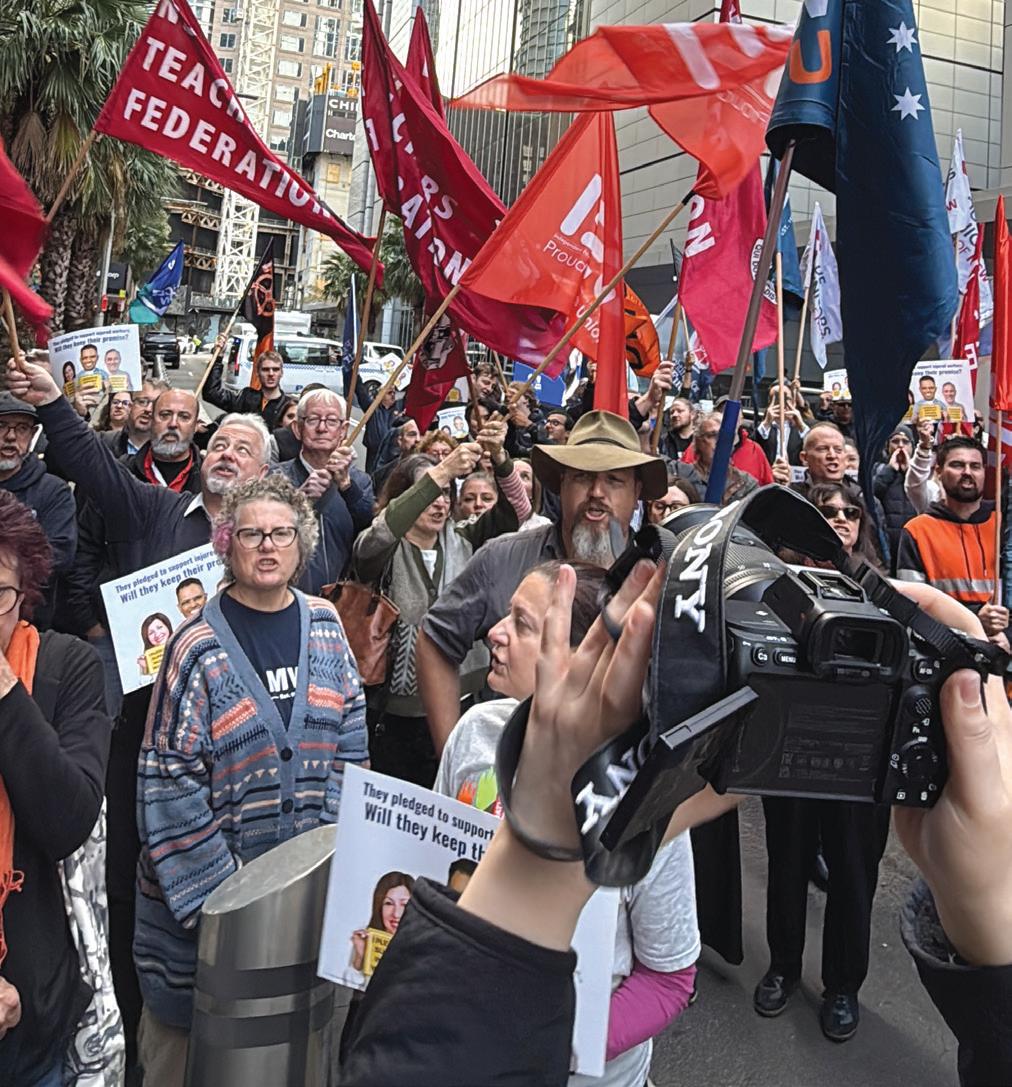

The IEU has joined other unions in calling on the NSW government to fix its ill-conceived overhaul of workers compensation laws. Unions have been campaigning for weeks against the proposed changes.
The Bill, which passed the NSW lower house on 3 June, will make it much more difficult for employees suffering psychological injuries to get the support they need.
As Newsmonth went to press, the upper house still had to consider the Bill. The IEU will update members on the outcome as soon as it is known.
The government’s Bill aims to cut benefits for people suffering psychological injuries after 2½ years, with medical treatment cut off after 3½ years.
To receive long-term support, an employee would need to suffer a whole person impairment (WPI) rating of 31 per cent rather than the current figure of 15 per cent. The NSW Greens and the Coalition have indicated they will not support this aspect of the Bill in the upper house.
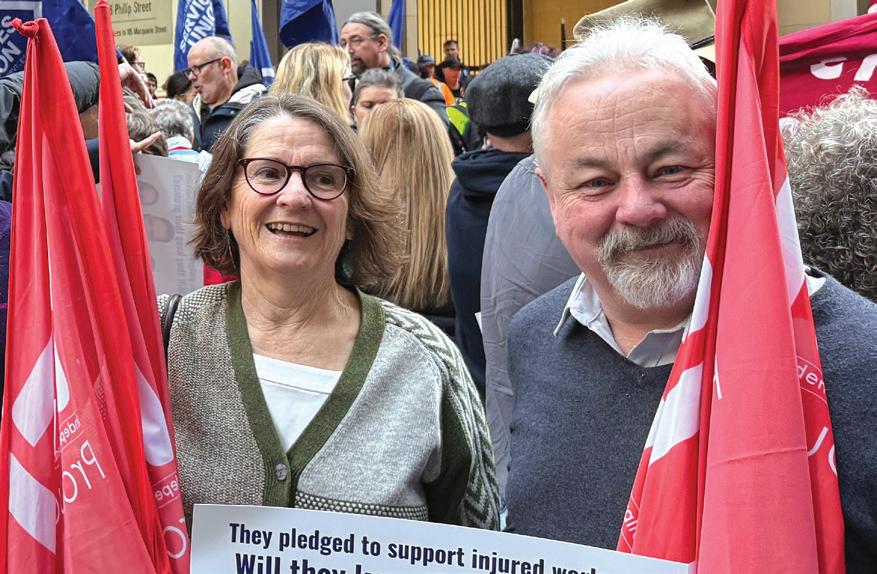
“A scheme dependent on the suffering of women is not sustainable.”
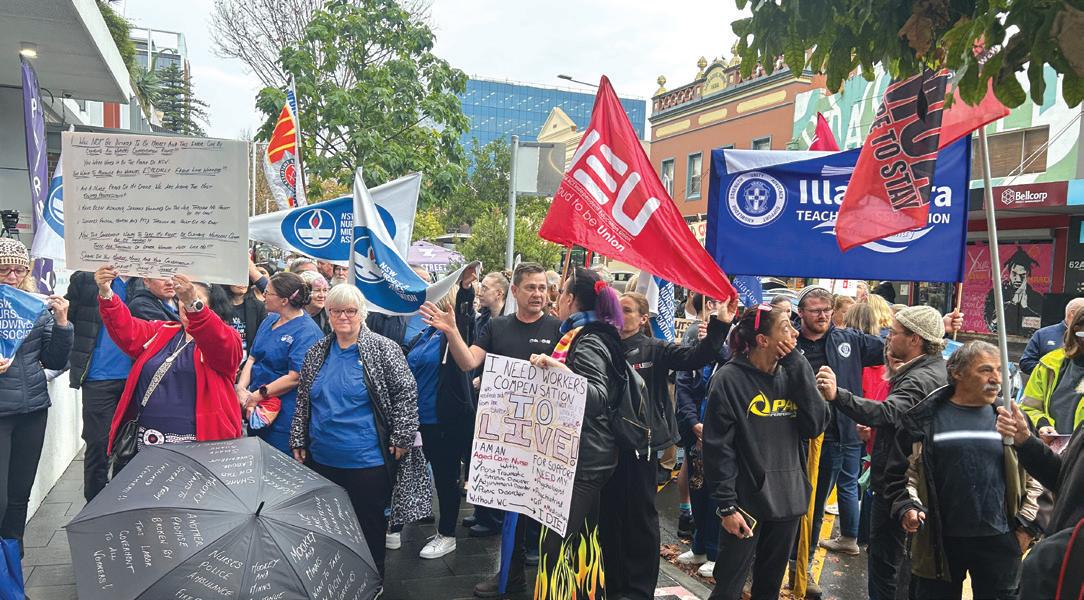
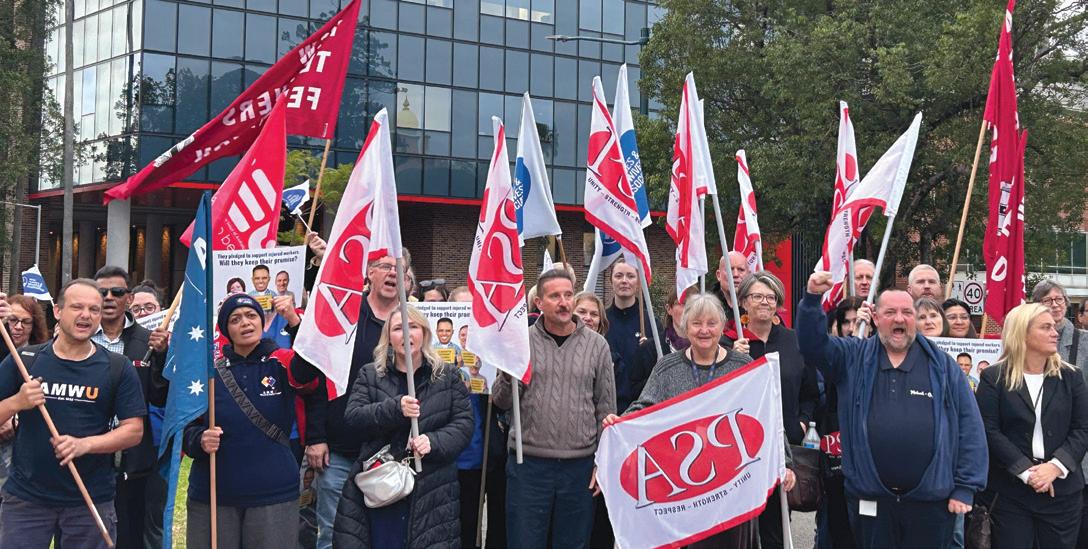
Under the Bill, workers who sustain psychological injuries can only claim compensation if their injury is caused by an “event” of the type specified in the Bill.
There is a narrow list of events, including being subjected to violence or the threat of violence, witnessing a traumatic incident or being the victim of bullying or racial or sexual harassment.
The government had also intended to require a worker who suffered an injury because of bullying or racial or sexual harassment to get a ruling from the Fair Work Commission before they could access support. This requirement was dropped following union pressure.
Union campaigining also prompted the government to include excessive work demands as a cause of injury for which an employee could claim.
However, if “reasonable management action” such as demotion, dismissal, reclassification or performance appraisal was a significant cause of the injury, the worker cannot claim.
Unions still consider the Bill to be unfair. Those most likely to need mental health care and support are essential workers in the health, emergency services and education sectors.
The proposed changes would overwhelmingly affect women, who form a big proportion of the health and education workforce.
This is why the IEU joined rallies throughout NSW in the past few weeks. The rallies forced the government to back down on some of its harsher changes. But this is not enough.
Harmful proposals
The changes, driven by NSW Treasurer Daniel Mookhey, will make it almost impossible for working people to access long-term care and support for psychological injuries such as post-traumatic stress disorder.
The proposed reforms would punish teachers and school support staff, as well as staff in the care and community sectors, who are already at higher risk of psychological harm from heavy workloads and high-stress, emotionally demanding environments.
Even worse, the changes will not reduce or prevent workplace psychological injuries.
A Unions NSW survey of more than 10,000 essential workers – teachers, disability workers, firefighters, nurses and emergency services personnel – found the proposed changes will put them at extreme risk of further harm or severe financial hardship.
Cutting off working people from mental health support and care puts them at risk of increased debt, as well as stress and anxiety and the breakdown of family relationships.
Continued
The IEU has been bargaining since October last year for new enterprise agreements (EAs) to apply to teachers and general employees in 10 NSW and ACT Catholic dioceses.
Catholic Schools Parramatta Diocese (CSPD) is bargaining with the other employers but for a separate EA that the IEU expects will generally reflect the main EA.
Broken Bay has its own EA and Work Practices Agreement (WPA), finalised in 2024.
The parties have been exchanging draft clauses, but we are still a fair way from finalising the terms of the EA. As at the time of writing, there are still key issues outstanding.
The IEU has not received a response from employers to drafting issues raised in mid-April
and the specific annexures in the EA applying to each diocese are also not yet agreed.
Pay rates for teachers in the ACT are not settled as members are unhappy with a proposal by Catholic Education Canberra & Goulburn to tie salaries for teachers in Catholic schools to rates which may be lower than rates ultimately achieved for teachers in ACT government schools.
Slow progress is also a concern because the employers have signalled they wish to unreasonably delay the start of the new non-initial primary carer’s parental leave provisions. Employers have agreed that partners who take parental leave to be the primary carer can access the 12 weeks’ paid leave within two years of the date of birth
rather than one year as at present, but they wish to defer the start of the benefit.
Addressing workloads
Union organisers are continuing to meet dioceses directly to discuss the Work Practice Agreements to achieve improvements to address teacher workload.
The union is disappointed with the rejection by employers of our claim to match workload improvements for teachers consistent with the 2024 NSW government school settlement. These improvements are: briefings (and any other before and after school meetings) to be included within the 10 hours of meetings per term, and
at least four of eight pupil-free days provided each year from 2025 to 2027 are to be teacher-directed (that is, used by teachers for their own or collaborative planning or preparation, as a form of additional release).
Members are continuing to press for these improvements by signing the IEU petition.
Next steps
Ask your IEU organiser to visit your workplace to discuss these issues and encourage any colleagues who have not yet joined the union to do so.
Carol Matthews Secretary
Glenn Lowe President

Welcome to our fourth edition of Newsmonth for 2025 as we keep a watch on key issues.
Catholic campaign continues Catholic school employers remain resistant to matching the fair conditions already secured by our colleagues in NSW government schools. This is driving a growing sense of frustration among staff.
A key issue is the disparity in the provision of teacher-directed time during pupil-free days.
Government school teachers currently benefit from eight pupil-free days a year, with four being self-directed.
This allows teachers to use the time in a way that best supports their professional needs – whether it be planning, assessment, collaboration or professional development.
In contrast, Catholic employers fail to acknowledge the professional judgment of teachers and refuse to allow the equivalent time to be teacher-directed.


ieunswact
Newsmonth is published eight times a year (two issues per term) by the Independent Education Union of Australia NSW/ACT Branch.
Executive editor Carol Matthews,
Secretary, for and on behalf of the IEU Executive and members
Managing editor Monica Crouch
Contributors Katie Camarena
Monica Crouch
Andrew Taylor
Tania Yardley
Photos Katie Camarena
Graphic design
Zoe Hercus
Chris Ruddle
Proofreader Helen O’Regan
Letters from members are welcome. They do not reflect endorsement if printed, and may be edited for size and style at the editor's discretion. Write to:
Newsmonth
485-501 Wattle Street
Ultimo NSW 2007
GPO Box 116
Sydney NSW 2001
Tel: 8202 8900
Toll free: 1800 467 943
Email: ieu@ieu.asn.au
Website: ieu.asn.au
This publication was produced on the unceded lands of the Gadigal People of the Eora Nation. The IEUA NSW/ACT Branch acknowledges the Aboriginal and Torres Strait Islander peoples as the traditional owners of the land, and pay our respects to their Elders past and present.
www.ieu.asn.au
IEU members are calling for equal treatment and respect for our capacity and expertise. Teachers in Catholic schools deserve the same conditions as our government school colleagues.
The IEU will continue to advocate strongly for fair conditions and professional respect across all education sectors.
Hats off to support staff
We celebrated World Support Staff Day on 16 May – a timely reminder of the crucial role support staff play in our schools (see page 10).
From administrative officers and learning support assistants to library staff and maintenance workers, support staff are the backbone of school operations. Their tireless efforts ensure schools run smoothly and teachers and students can thrive.
The union extends sincere gratitude to all school support staff. Your work often happens behind the scenes, but its impact is felt in every classroom and school community. Thank you for your dedication, professionalism and care.
Shout-out to local reps
Meet five dedicated school representatives
from the Wollongong and Macarthur regions (see page 11).
Reps play an essential role in ensuring members are informed, supported and empowered in their workplaces. Through regular training sessions, the IEU develops skilled and knowledgeable reps in schools. Strong, well-trained union reps not only benefit members, but also help schools operate more effectively. When staff have clear structures to voice concerns and advocate for fair working conditions, the entire school community benefits.
Looking ahead after election
The IEU sees the re-election of the Albanese government as an opportunity to drive meaningful, long-term change across the education sector.
We are committed to working with all levels of government to ensure the voices of educators are heard (see page 10).
A truly just education system recognises every child’s right to dignity, safety, opportunity and freedom from war (see page 15).
Lyn Caton Assistant Secretary

As more than 350 Catholic primary principals gathered for the 2025 Association of Catholic School Principals (ACSP) conference in the Hunter Valley, a singular truth resonated: never has leadership been more vital – or more tested – than it is today.
Leadership in education is shaped by political, social and spiritual forces. Opening the conference, ACSP president Iris Nastasi invited principals to reflect on the profound impact of leadership by highlighting the power of contrast – how individuals shaped by vastly different environments, values and formative experiences can leave legacies that diverge dramatically.
Nurturing leaders
This reflection was a powerful reminder that leadership doesn’t develop in isolation – it is nurtured through education, grounded in personal values and revealed in moments of challenge.
The leaders of tomorrow are formed today – in NSW and ACT Catholic schools, classrooms and often under the direct guidance of IEU members.
As principals, our members hold both the responsibility and the honour of recognising and cultivating leadership in others.
Yet the burden is heavy. The latest principal’s wellbeing survey revealed the immense pressures facing school leaders: escalating workloads, increasing administrative complexity and growing incidences of adult bullying – all against the backdrop of staff mental health challenges and student needs.
Principals reported worsening levels of anxiety and depression. The work can be relentless and, at times, isolating.
And yet, paradoxically, the survey also found principals remain deeply committed to their roles, expressing a high level of job satisfaction.
It’s not a contradiction – it’s resilience. It’s purpose. It’s the knowledge that what our members do truly matters.
Principals’ voice
Catholic Schools NSW chief executive Dallas McInerney reaffirmed a commitment to respecting and amplifying the voice of principals in governance and funding debates.
He said ongoing political battles over claims of overfunding and privilege showed the need for the sector to remain vocal, visible and unified.
McInerney also said a new leadership program aimed to address the decline in applications for principal roles and a generational leadership gap.
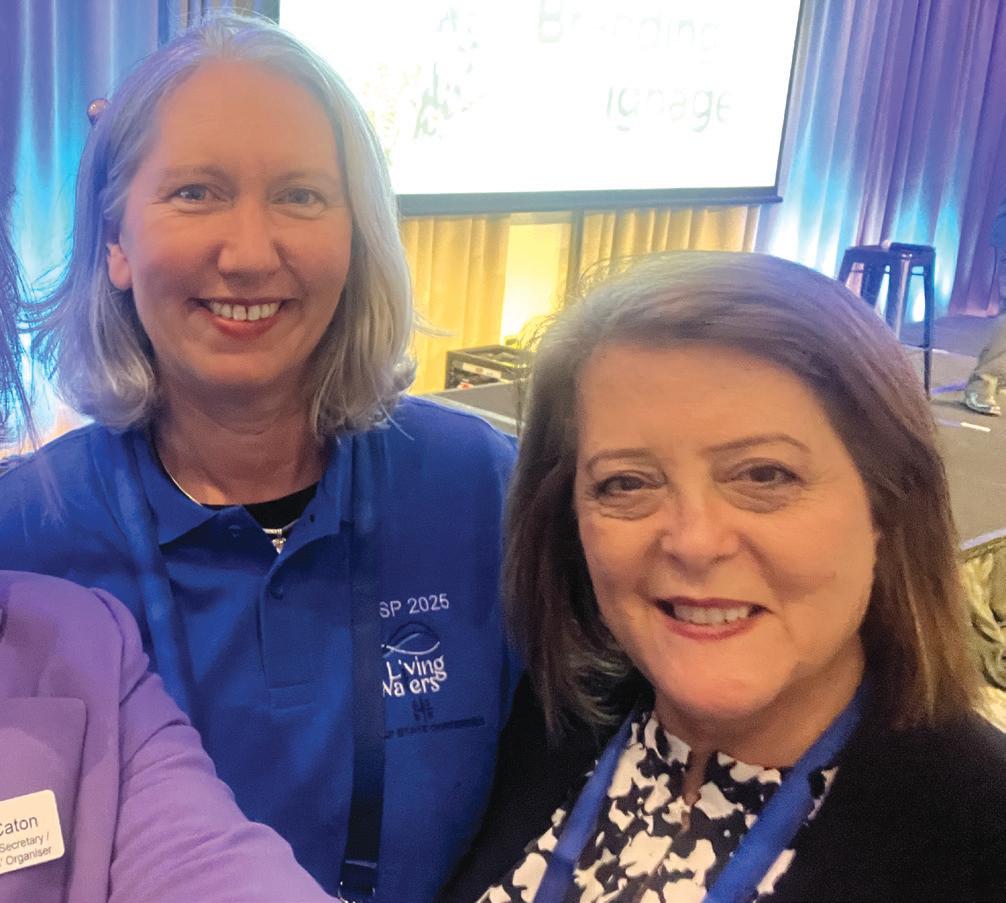
Importance of courage
The conference did not shy away from addressing the spiritual and societal climate students face.
From algorithm-driven consumerism to toxic masculinity, young people need courageous, values-driven educators more than ever.
Principals are not just school leaders, but also lead in the development of community, identity, faith and hope.
In closing, participants were reminded that while employers prioritise the wellbeing and connection of our students, they must also invest in principals.
The three days were not just about professional learning, but also about spiritual replenishment, collegial connection and mutual encouragement.
Liz Heggart Vice President Systemic

The Jubilee Year of Hope, proclaimed by the late Pope Francis for 2025, is a time of spiritual renewal, reflection and recommitment to the core values of faith, charity and community.
For Catholic employers in NSW and the ACT, this Jubilee should offer an opportunity to reconnect with the foundational mission of Catholic education: nurturing the whole person – mind, body and spirit.
One part of our claim in current negotiations with Catholic school employers is for the faceto-face teaching load to be reduced.
This would go a long way towards alleviating the pressures felt by teachers but it has been rejected by the employers.
I hope we can continue to muster our collective strength and professional solidarity
to push for this crucial improvement, and that our dignity as workers can be respected as the Catholic social teachings preach.
We celebrated World Support Staff Day on 16 May and a cursory glance at the social media accounts of Catholic dioceses across NSW shows a lack of acknowledgement of this day.
This should not really be a surprise considering another part of our claim –improving long service leave and personal/ carer’s leave for general employees – has also been rejected by Catholic employers.
This means support staff with extensive service in government schools will continue to have better leave allowances.
I hope justice in the workplace can be restored so that equal work is rewarded with not only equal pay but also equal entitlements.
Catholic employers were happy to at least match the pay rise given to our colleagues in government schools.
However, when it comes to working
conditions, they refuse to mirror this parity.
Our request for a maximum of 10 hours meeting time per term (including briefings) as well as allowing at least 50 per cent of professional learning days to be teacherdirected – is the bare minimum our employers could provide.
I hope that employer acknowledgement and action on these struggles, rather than mere platitudes, might rekindle our optimism, resilience and sense of purpose in our daily work.
Catholic social teaching principles are not external to Catholic school systems but are part of the Church’s own social doctrine.
Teachers and support staff have a legitimate and moral basis to call on their employers to align their actions with the values they publicly profess.
I hope we achieve an acceptable enterprise agreement sooner rather than later.
IEU Secretary Carol Matthews, centre, and Deputy Secretary David Towson met with NSW Deputy Premier and Education Minister Prue Car on 7 May. Discussion included funding for pay rises in NSW community preschools; improving the quality of early childhood education and care services (see page 5) and how IEU members in these services could be better supported; potential changes to antidiscrimination laws (see page 8) and the NSW government’s recent legislation to stop fraudulent “claim farming”.
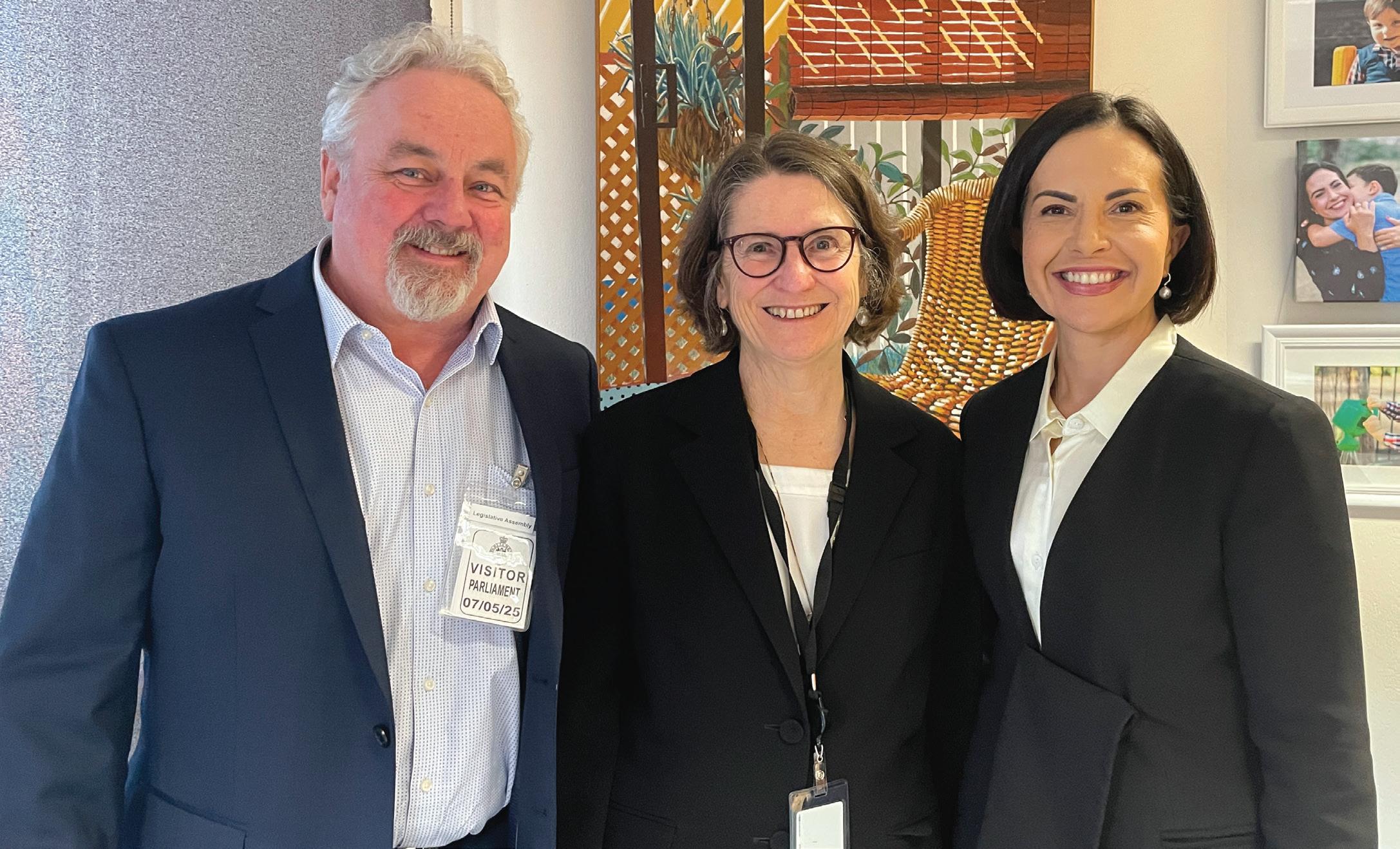

After several months of bargaining, the IEU has secured two new MultiEnterprise Agreements (MEAs) covering teachers and support staff at Daramalan College, Marist College and St Edmund’s College in the ACT.
These MEAs mark a major win for staff at these schools, delivering significant improvements in wages and working conditions.
The MEAs received strong support in the voting process which closed on 19 May 2025, with an overwhelming majority voting in favour.
Among support staff, 100% of the 78.7% who voted supported the proposed MEA. Among teachers, 95.1% of the 85.9% who participated voted in favour of their new MEA.
Substantial pay rises
Through the MEAs, the IEU locked in annual pay increases for both teachers and support staff, backdated to October 2024 and continuing to 2026.


The Independent Education Union of Australia (IEUA) is committed to increasing our membership – and therefore member power – to advance the industrial and professional interests of members across Australia.
Wage-related allowances will also rise in line with the same percentage of salary increases, and other allowances will be adjusted to reflect the applicable modern award rates.
Improved paid parental leave
The MEAs deliver improvements to paid parental leave entitlements, including: 24 weeks of paid parental leave (inclusive of non-term time) for the initial primary carer, with superannuation paid throughout the leave two weeks of paid concurrent leave for the partner of the birthing parent, which will not be deducted from the employee’s personal/carer’s leave balance access to 12 weeks of paid parental leave for the non-initial primary caregiver for children born (or in case of adoption, placed) after 1 April 2025, which can be taken within 24 months from the date of birth (or date of placement in case of adoption).
These improvements to paid parental leave enable employees to spend vital time with their new baby during the crucial early stages of parenthood.
Other wins
The MEAs deliver several improvements to general employment conditions, including: one day of special leave per year (non-cumulative) up to five days of emergency disaster leave per year for support staff (noncumulative)
limits on deductions for insufficient notice upon resignation or termination recognition of union delegates’ rights that reinforces the importance of IEU reps in supporting and advocating for members in these schools.
These new agreements represent a significant achievement for IEU members, securing tangible gains across pay, leave, rights at work and workplace conditions.
The strong vote in favour of the MEAs highlights
solidarity of employees.
To this end, we are conducting a membership survey across all five state and territory branches to determine how we can best draw on our strengths, identify challenges and grow union power.
There are 75,000 IEUA members nationwide in five branches: NSW/ACT, Victoria Tasmania (VicTas), Queensland and the Northern Territory (QNT), WA and SA. All members of the NSW/ACT Branch of the IEU are also members of our federal body, the Independent Education Union of Australia (IEUA).
While the NSW/ACT Branch has conducted surveys of reps and members in the past, this is the first time the IEUA has conducted a nationwide survey.
Why we’re conducting a survey
The leadership of the NSW/ACT Branch has endorsed this survey, acknowledging that it aligns with our Stride to Grow 2025 Strategic Plan, adopted by the IEU Council of about 130 elected IEU members on 26 October 2024.
In our Strategic Plan, we committed to making decisions that are “measured and informed by more data collection”. We aim to “grow member engagement during campaign and non-campaign periods”.
This member survey addresses several recommendations in the Strategic Plan, including: survey members to inform IEU value proposition enhance membership offering tailor membership offering to potential new members in target sectors commence recruitment drive in 2026.
Calling for your response
We need as many members as possible to participate for the survey to be successful.
We trust you’ll engage with our survey to help shape the future direction of your union and make sure we’re working with you in ways that you value. Your feedback is important and will make your union even stronger.
We know you’re busy. The survey should take just 9-to-14 minutes to complete and will be sent to you on or around Wednesday 11 June. It will remain open for two weeks.
The survey includes two sections: how the IEUA NSW/ACT Branch is supporting you as a member • (for teachers) your experience with the teaching profession in general.
The IEU has commissioned a third party, Engaged Strategy (see logo below), to run the survey and collate the data. This firm has been vetted for compliance with data handling and protection.
Engaged Strategy will email the survey to all members. The IEU will also contact you before the survey is sent to ask you to keep an eye out and not mistake it for spam (you may need to check your junk folder).
For
To ensure the data is representative of our branch membership, we are seeking as many responses as possible.
Not only will you be assisting your union, collectively you will be supporting a good cause. For the first 5000 completed surveys we receive, the IEU will donate $500 to the Cancer Council. For every 1000 completed surveys we receive after this, we will donate a further $100 (up to $1500 in total).
Thank you in advance for your support.

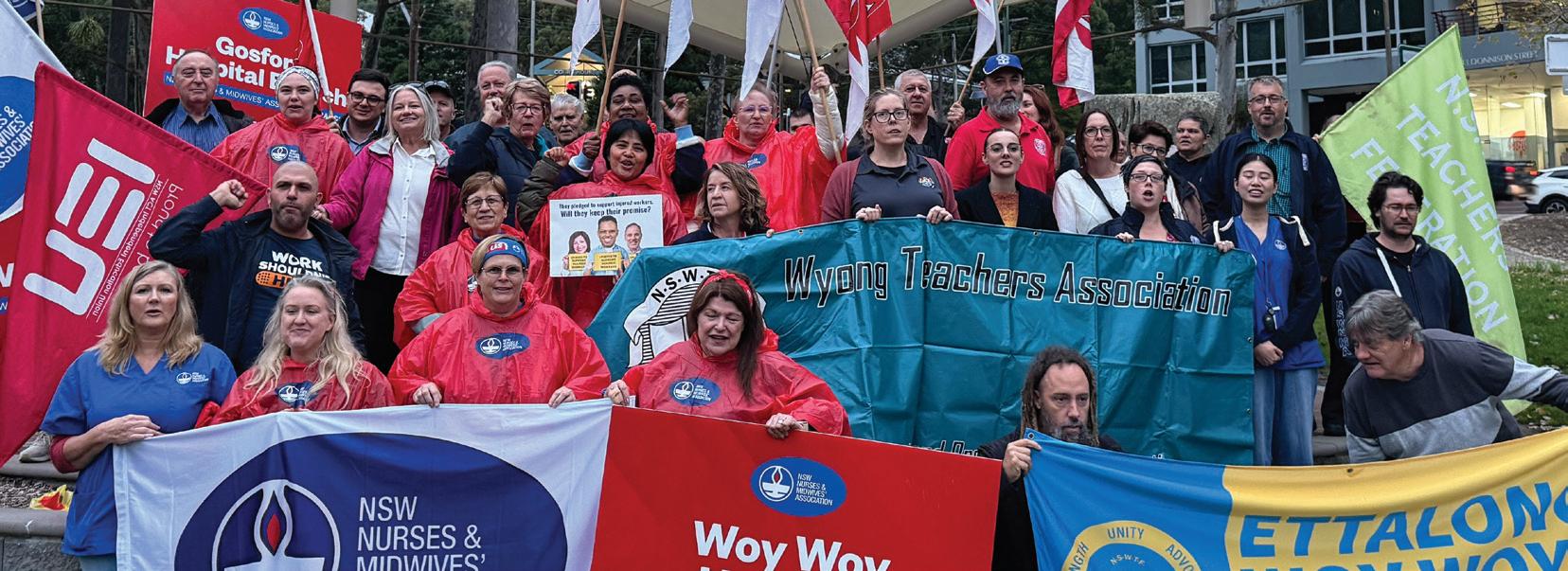

it is safe.
Barriers to mental health support
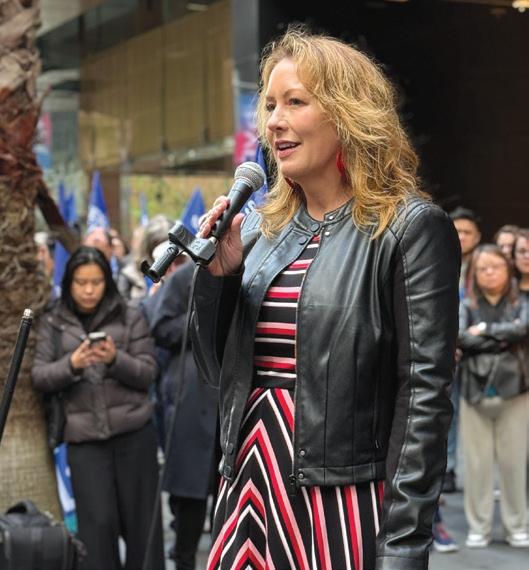
A one-day parliamentary inquiry in May heard that as few as 27 of the hundreds of employees afflicted by psychological injury at work each year would be eligible to claim long-term benefits under the proposed changes.
The IEU’s submission to the inquiry highlighted the union’s concerns that the proposed changes put up barriers to mental health support and care such as arbitrary caps on benefits and lump-sum compensation.
The changes treat mental health as less legitimate than physical injury, despite overwhelming evidence of the clear and lasting impact psychological harm has on workforce participation and wellbeing.
Mr Mookhey told the inquiry that radical reforms were required to ensure the financial viability of NSW’s workers compensation scheme.
However, the IEU strongly believes a system dependent on the suffering of our members, most of whom are women, is not acceptable.
The proposed changes are extreme, harsh and will hurt seriously injured employees.
Real reform needed
Lawyers, doctors and mental health professionals have also expressed concern that the government’s proposals are contrary to the interests of workers.
NSW Bar Association president Ruth Higgins said the proposed changes would substantially reduce access to compensation, while introducing additional and unnecessary delays.
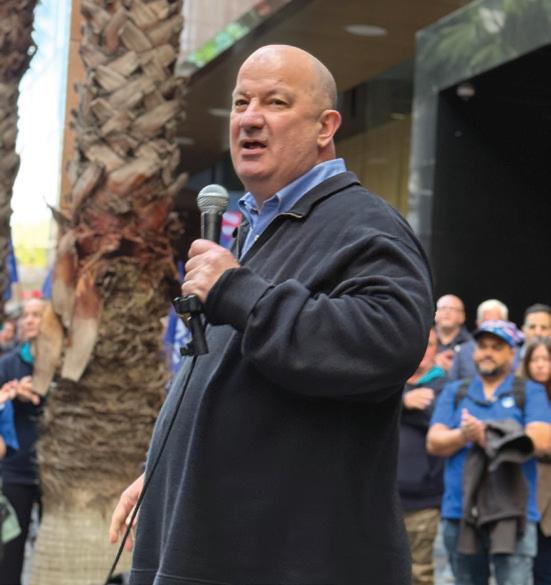
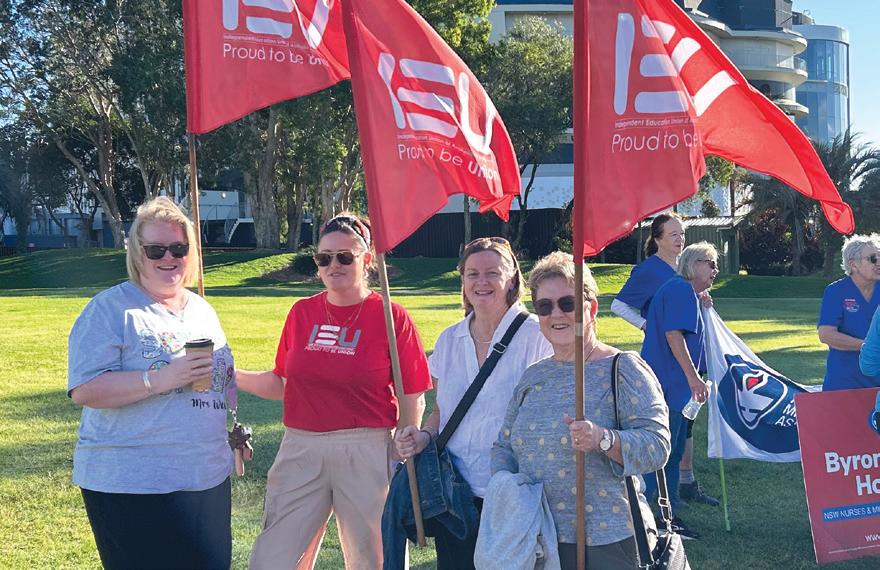
“Possible alternatives for reducing the financial pressures on the scheme appear not to have been adequately considered,” Higgins said.
The IEU agrees that the current workers compensation system needs reform to ensure it adequately serves the needs of NSW workers.
But the government should begin by addressing poor claims management, unnecessary delays and excessive bureaucracy to rein in costs instead of attacking injured workers.
The focus should be on preventing injuries and trauma and returning injured employees back to work sooner.
Waste and inefficiency within the scheme should be fixed. Self-insurer and specialised insurer arrangements that may undermine the scheme’s financial stability should be examined.
Calling for safety and prevention
The NSW government and employers need to do more about eliminating hazards such as workplace violence, racial and sexual harassment, excessive workloads and poor support from supervisors and management.
Employers can also reduce psychosocial hazards and the cost of workers compensation by employing more staff, and improving pay and conditions. Employers must face penalties when safety laws are broken. Teachers and school support staff deserve the best levels of support and care for the impacts of work on their mental health.
IEU members should not be punished for poor management of the workers compensation system by successive state governments and employers.
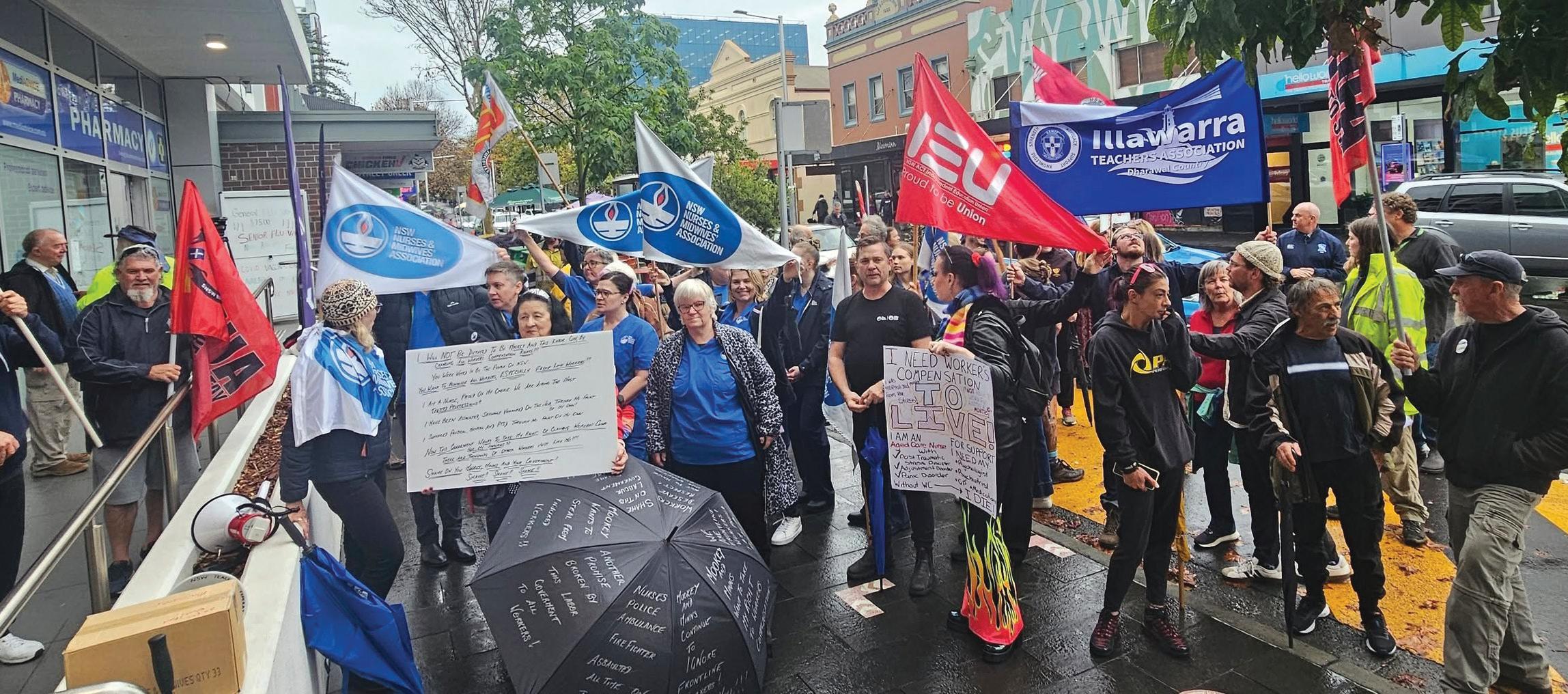
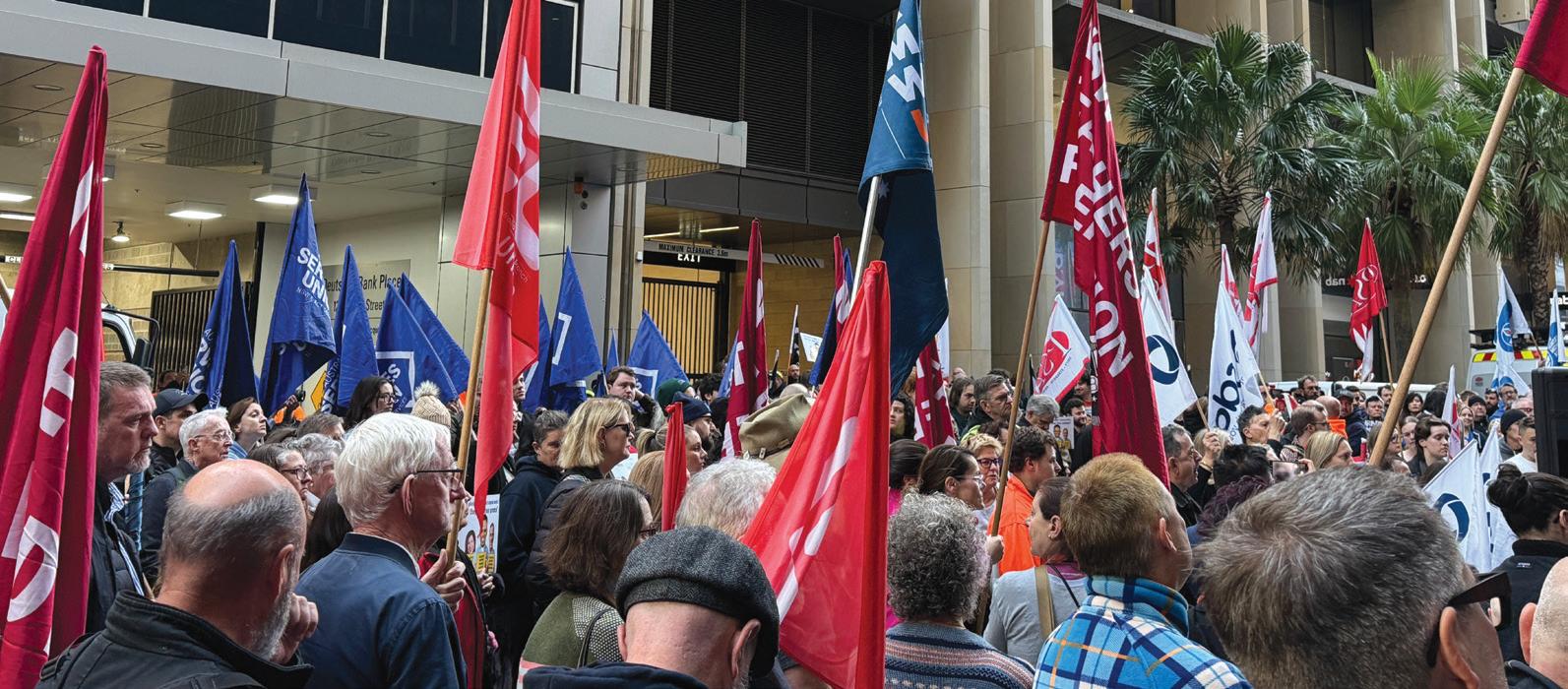
An IEU member, who works at a school represented by the Association of Independent Schools (AIS), and his partner had a baby in October 2024. At that time, the member took two weeks of paid parental leave concurrently with his partner, then returned to work.
The member then sought to take the non-initial primary caregiver parental leave under the new Teachers Multi-Enterprise Agreement (MEA). He applied to take 12 weeks of parental leave in Term 2 of 2025 under the new agreement.
The employer refused his request, saying the member had already taken leave under the previous agreement and therefore was not entitled to the leave gained in the new agreement.
The union disagrees, and we have lodged a formal dispute with the Fair Work Commission (FWC).
IEU members in about 240 independent schools fought for and won improved paid parental leave entitlements in their new Teachers MEA, which came into effect in April 2025.
Non-initial primary caregivers can now take 12 weeks of paid parental leave (under the previous agreement, they could take just two weeks).
The IEU believes the new entitlement is a separate and distinct benefit that did not exist under the previous MEA.
The matter was listed for an initial informal conference in the FWC on 2 May. However, rather than come to an informal solution, the AIS asked for the matter to be determined by the FWC through written submissions by both the union and the AIS.
The IEU provided submissions to the FWC on 20 May.
The union obtained advice from experienced counsel in drafting our submission.
We believe we are in a strong position for the FWC to recommend that our interpretation of the clause is correct.
While the FWC’s recommendation is nonbinding, it will still hold significant weight.
In the meantime, if you are a member in an independent school and you are concerned this issue may impact you, we urge you to contact your organiser.
Liam Crisanti Industrial Officer
Thousands of union members rallied throughout NSW in late May to protest the state government’s proposed changes to the workers compensation system.
The reforms, driven by NSW Treasurer Daniel Mookhey, will make it almost impossible for workers to access long-term care and support for the mental health impacts of their work.
Shouts of “Shame, Mookhey, shame” echoed in the Sydney CBD on 26 May as speakers lined up to voice their anger at the state government’s proposed changes that will have severe and damaging consequences for injured employees.
Holding aloft the union’s red-and-white flag, NSW/ACT Branch Secretary Carol Matthews and Deputy Secretary David Towson represented the IEU at the rally.
Speakers representing teachers, nurses, doctors and public servants noted that rather than focusing on preventing injuries, the government wanted to prevent claims.
Many speakers also told stories of union members who had sustained psychological injuries at work, yet would be denied support under the reforms.
NSW Teachers Federation Deputy President Amber Flohm said education, along with health, recorded the highest number of psychological injuries and would be disproportionately impacted by the proposed reforms.
Public Service Association Assistant General Secretary Troy Wright said the
proposed changes “will do nothing to prevent a worker from being injured but do everything to prevent a worker receiving compensation for that injury”.
Australian Salaried Medical Officers Federation of NSW member Dr Mitch Hickson said the workers compensation system was broken, rife with delays and did not prioritise injury prevention.
“Tell me, how does excluding people who have been mentally damaged by work burnout and stress fix that? It doesn’t,” he said.
System needs reform
Unions NSW Secretary Mark Morey said the state’s workers compensation system needed reform.
“Everyone agrees the system is broken,” he said. “Everyone agrees it needs to be fixed. But cutting the workers off is the most disgraceful way to fix anything, especially the workers comp system that was set up to look after injured workers.”
The rally also heard from independent MP for Sydney Alex Greenwich who said: “This government got elected with a mandate to look after workers, not to remove their rights and protections.”
Upper House Greens MP Abigail Boyd described the proposed changes as “the most shocking, extraordinary Bill”.
“Psychological injury is real injury, and we are talking about people’s lives,” she said.
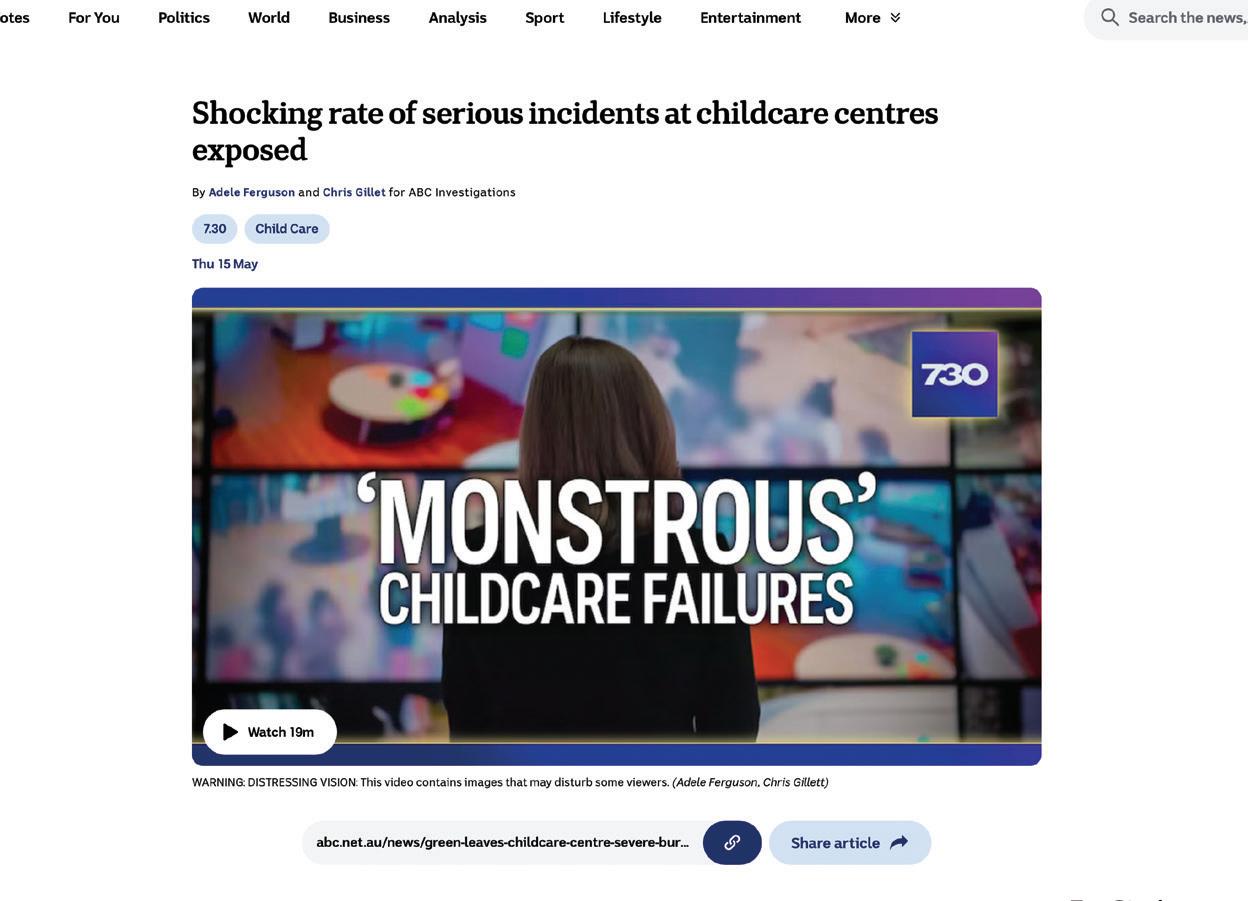

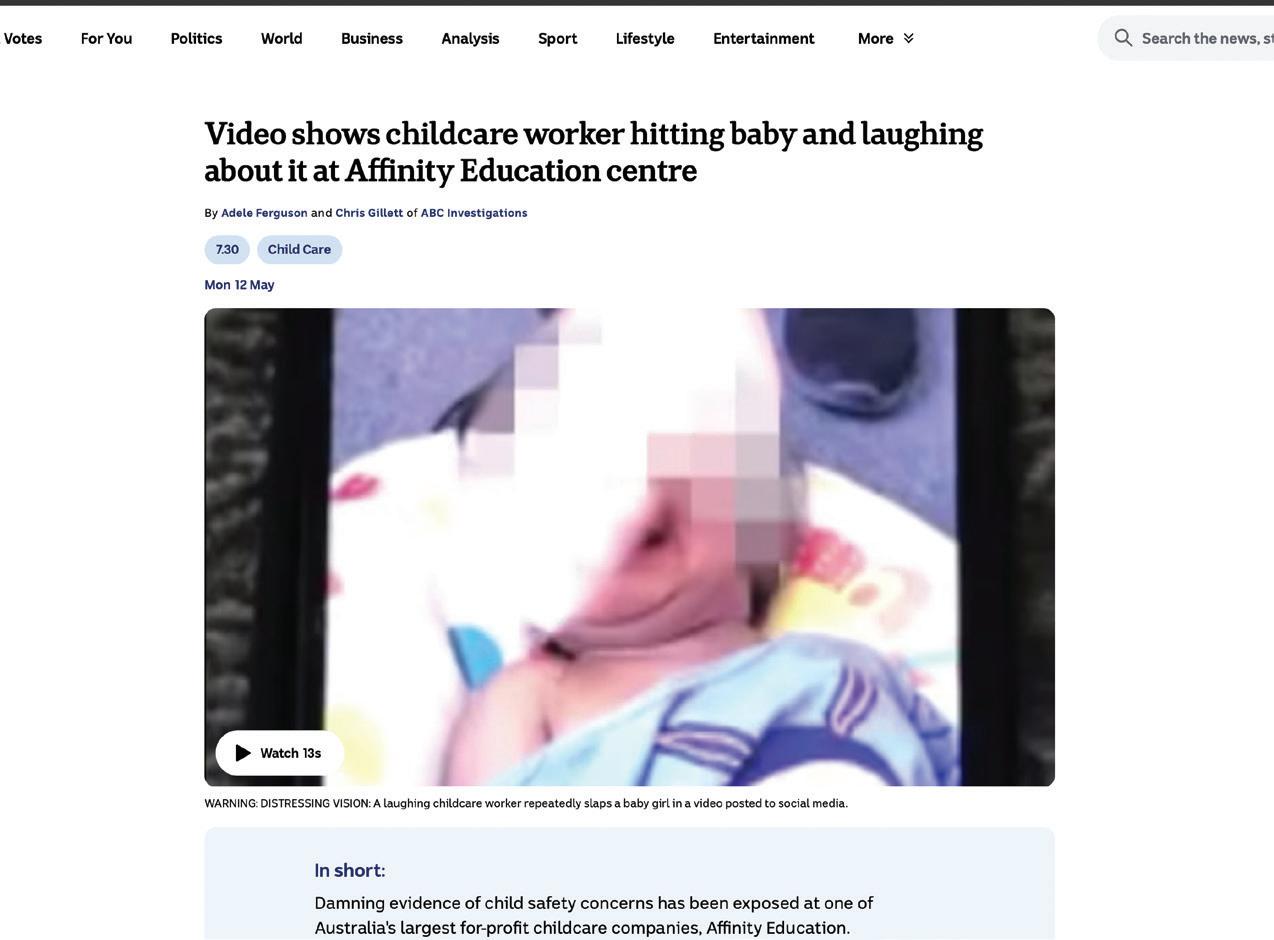

The IEU has again called for urgent reforms in the early childhood education sector after more revelations about regulatory failings and serious child safety concerns in several centres.
ABC news in May showed footage of a childcare worker repeatedly slapping a baby across the face and laughing about it at a centre in Sydney operated by for-profit provider Affinity Education. Affinity runs 250 centres and is owned by private equity operator Quadrant.
In another disturbing incident, ABC news reported that a young boy suffered serious burns at a centre in Port Macquarie operated by Green Leaves, which is half-owned by private equity firm Crescent Capital.
Regulatory documents released under a parliamentary order obtained by Upper House Greens MP Abigail Boyd detail hundreds of incidents of abuse and mistreatment of young children at centres owned by some of Australia’s largest for-profit childcare providers.
“We just continue to see these centres not doing the very basic things that they’re supposed to do,” Boyd told ABC’s current affairs program 7.30. “Time after time, we are seeing this sort of weak response from the regulator in the face of horrible incidents.”
This follows an ABC Four Corners investigation in March that exposed serious flaws in the regulatory system for centres and allegations of mistreatment of children.
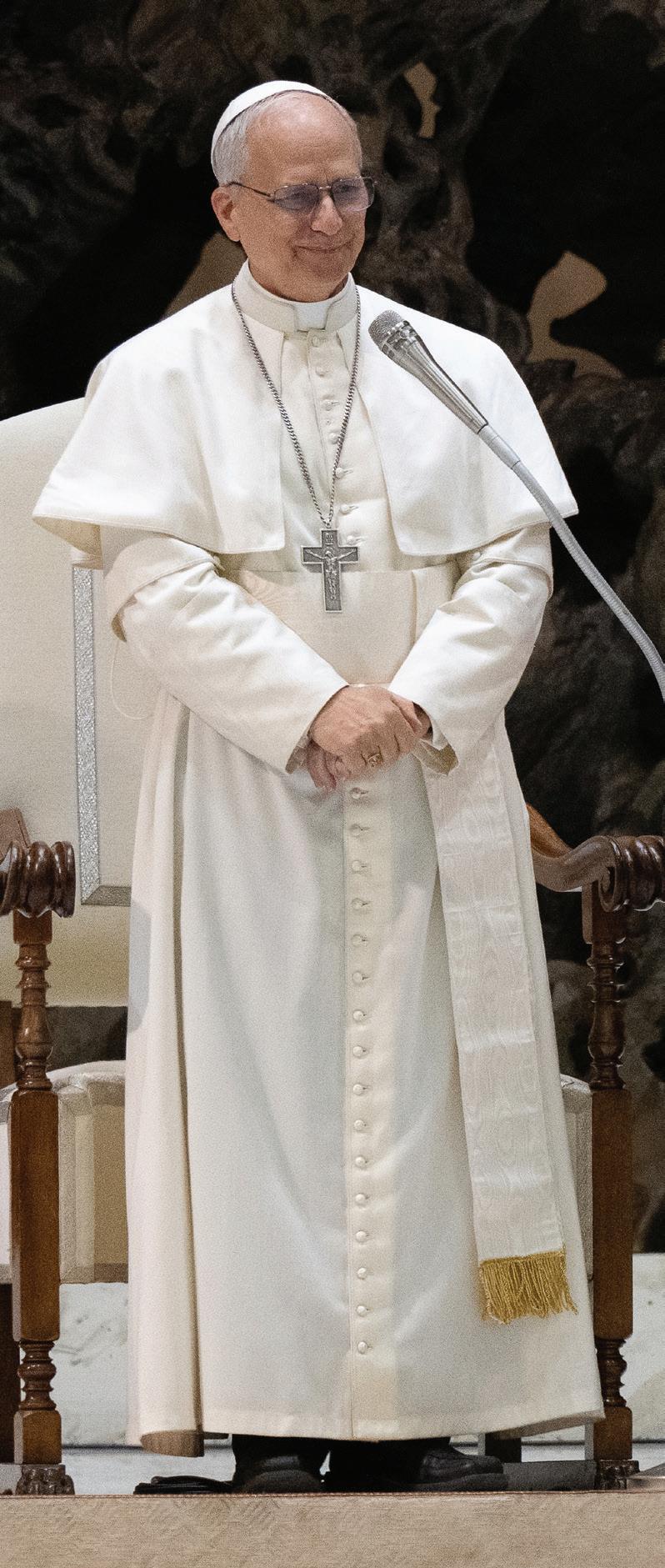
“Peace be with you all! … I would like this greeting of peace to resound in your hearts, in your families, among all people, wherever they may be, in every nation and throughout the world. Peace be with you!”
The IEU has made a submission to an Upper House inquiry into the childcare sector established as a result of revelations of serious safety breaches.
IEUA NSW/ACT Branch Secretary Carol Matthews said the rising number of serious incidents at for-profit providers was unacceptable and revealed a troubling pattern of noncompliance. Matthews said the business model of for-profit childcare providers needs reform.
“The focus on profits rather than high-quality education and care is behind these serious safety breaches,” she said.
Matthews said there were ongoing systemic issues with staffing, oversight and safety in Australia’s largest for-profit providers.
The union has repeatedly raised issues that impact the early childhood sector, such as ongoing teacher shortages leading to inadequate staffing ratios.
“Children should never be the victims of cost-cutting by private equity and other for-profit players to boost profits and shareholder returns,” Matthews said.
A 2024 Productivity Commission report found quality is “paramount” to achieving the benefits of early childhood education and care.
“Regulators should be adequately resourced to deliver timely assessments of service quality, take action to tackle persistently
poor quality and support continuous quality improvement,” the report said.
The Commission’s report, A path to universal early childhood education and care, said quality is not uniform across the sector: “Quality ratings tend to be lower in areas of socioeconomic disadvantage and remote regions, where service delivery can encounter persistent challenges.”
It also found services run by not-for-profit providers, governments and schools have better NQS ratings (34 per cent exceeding the standard), compared with services run by for-profit providers (13 per cent).
The long day care sector has long struggled with an acute staffing crisis due to low pay. But unions and the federal government have worked together to attract and retain the right staff through 15% pay rises for teachers and educators over 2024 and 2025.
The regulator also needs to ensure that all centres meet the accreditation standards required by the law and expected by parents. Highly qualified staff are crucial.
The union is also pursuing pay rises for teachers in community preschools, where there is a similar staffing crisis. These teachers have the same qualifications as their colleagues in schools but are paid substantially less. The IEU is fighting to change that.
Australia’s education unions have warned that Trump-style tactics, including political interference in the education system and funding cuts, will only harm students and staff.
The education sector needs to remain vigilant against Trump-inspired attacks on teaching despite the re-election of the Albanese government.
IEUA Assistant Federal Secretary Veronica Yewdall told an online forum, Resisting the Trumpification of Education, that denigrating teachers was part of a right-wing agenda to control and corporatise the education system.
“We see issues in education described in very simplistic ways and an almost continuous round of teacher blaming and, at times, teacher bashing,” she said.
“We see it in the media. We hear it from our politicians. We see an attempt to control education from the top down.”
“Trumpist rhetoric”
The forum, held in April with the Australian Education Union and National Tertiary Education Union, discussed what NTEU National President Alison Barnes said were threats posed by “the increasingly Trumpist rhetoric being used to talk about our sector”.
US President Donald Trump’s attacks on education have led to mass sackings of Education Department officials and turmoil on university campuses – policies that former Liberal leader Peter Dutton seemed keen to impose on Australia.
Unfortunately, the defeat of the Duttonled Coalition in the May federal election does not signal the end of teacher bashing, threats of funding cuts and political interference in the education system, the unions warned.
Yewdall said there were ongoing attempts to take control away from the teaching profession “in terms of what we teach, how we teach and when we teach it”.
“We see corporate interests really pushing their way into education, and I would argue political interests as well, of course, often in the name of efficiency,” she said.
“We see a lot of commercial imperatives all the way through to primary school and the early childhood sector.”
Parental rights a misnomer Yewdall also highlighted a narrowing of curriculum content and the prioritising of particular points of view.
At a NSW Legislative Council hearing into teacher shortages in 2023, Education Committee Chair Mark Latham insisted that performance pay for teachers was part of the solution, a view the IEU does not support.
“Mark Latham’s position was that we were a dead hand on excellence,” Yewdall said.
“That’s the way he described the IEU in that hearing, because we refused to agitate for different pay for teachers working in different sectors.
“The profession would not stand for such a proposal, because we understand the
complexities of education.”
Yewdall also explained to the forum how the parental rights agenda is a vehicle to introduce right-wing obsessions such as Latham’s attempt in 2020 to introduce a Parental Rights Bill.
“One of the requirements of the Bill was that a teacher’s accreditation would be suspended for speaking with students who may have raised issues or questions around gender diversity,” she said.
“That is clearly wresting control from the profession, and a very top-down approach, apart from the fact that it’s appalling.”
Yewdall also addressed what she called “the indoctrination myth” and Trumpian claims of a decline in education standards.
The Australian curriculum instructs students to examine different viewpoints.
“And this is what right-wing leaders are in fact trying to stop,” she said.
“They do not want an examination of different viewpoints. Historical truth is a singular narrative in their world view.
Yewdall reminded the forum of the important role of unions in influencing education debates.
“Union power is not power over anyone,” she said. “It’s the power to make positive change.
“The only way we can do that, the only way we can increase our influence and shift the dial, is to build our capacity and encourage people to think about joining us in that work.”
“Teaching about the perspectives and extensive history of Aboriginal and Torres Strait Islander peoples is an important way of telling the full story of Australia.”
National Reconciliation Week is a time for all people in Australia to reflect on our many cultures, shared history and achievements, and to explore how each of us can play a part in achieving reconciliation.
The week includes National Sorry Day on 26 May, when we acknowledge the mistreatment of Aboriginal and Torres Strait Islander peoples who were forcibly removed from their families. For decades, government policy meant Indigenous children were taken from their families. Sorry Day asks us to consider and create ways for the stolen generations and their families to heal.
Reconciliation Week this year marked the 58th anniversary of the 1967 referendum in which Aboriginal and Torres Strait Islander people were finally included in the census.
This year’s theme, Bridging Now to Next, was a call to listen to the lessons of the past and move forward into a better future.
Truth-telling
A panel convened at the University of Technology Sydney (UTS) on 29 May discussed “Reconciliation: Truth-Telling”.
Truth-telling invites us to recognise that Aboriginal and Torres Strait Islander peoples continuously lived and practised culture on this land for more than 60,000 years prior to colonisation in 1788. It acknowledges the strengths of First Nations peoples as well as the systematic silencing of injustices and the ongoing impacts of colonisation.
UTS Pro Vice-Chancellor (Indigenous Leadership and Engagement) Professor Robynne Quiggin AO, who hosted the

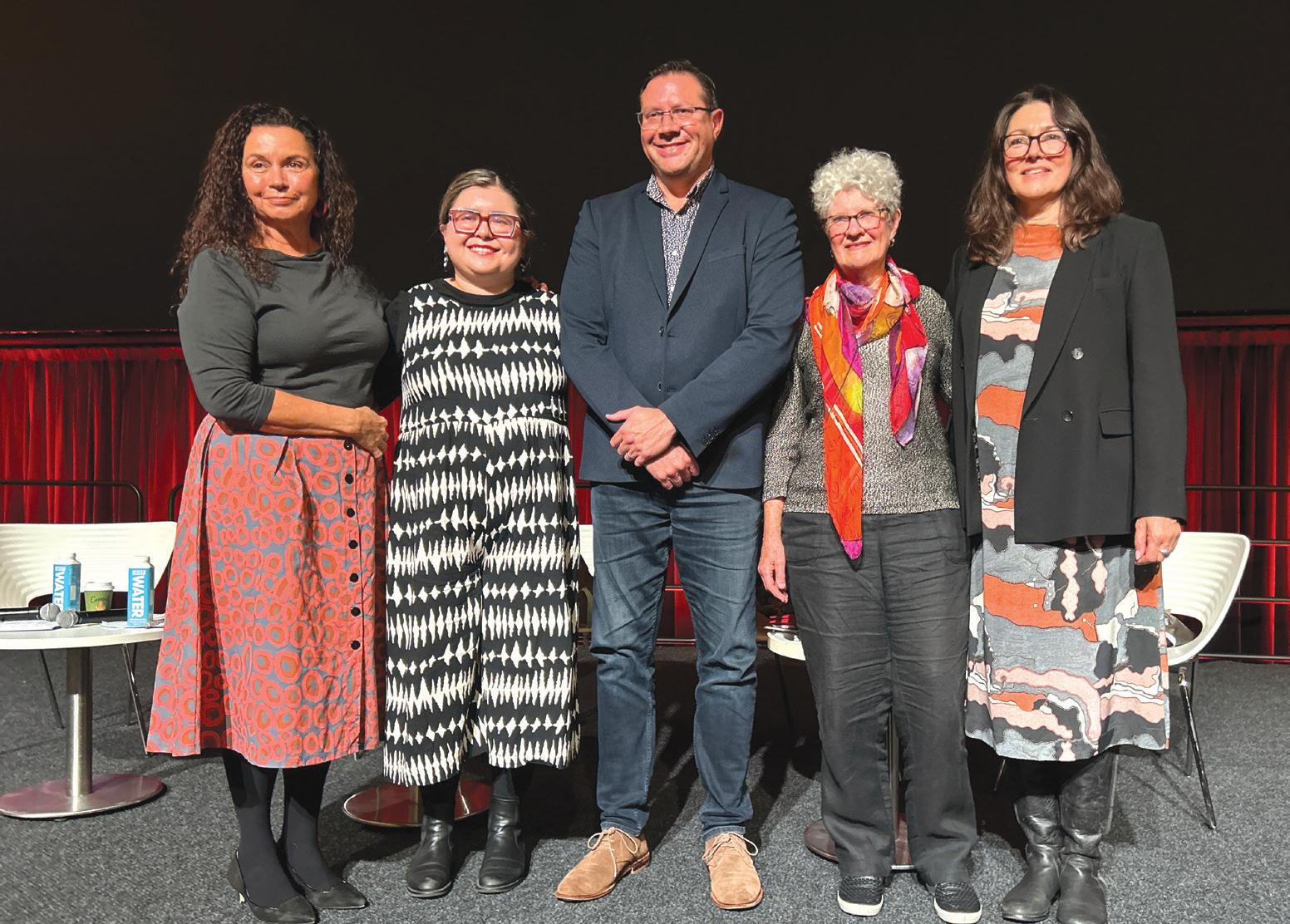
panel, said teaching about the perspectives and extensive history of Aboriginal and Torres Strait Islander peoples is an important way of telling the full story of Australia.
“Many people grew up without learning about Aboriginal history and culture at school – or learning a deficit narrative of our people and our culture,” Professor Quiggin said after the event.
“Teachers play an important role in changing this for the next generation, by expanding their own knowledge base, building relationships with local community members, and understanding the context of colonisation, its ongoing impact on First Nations peoples and being able to communicate that effectively to students.”
The panel included the Australian Museum’s Head of First Nations Collections and Research, Dr Mariko Smith; journalist Lorena Allam; the Director of the Jumbunna Institute for Indigenous Education and Research at UTS, Professor Lindon Coombes; and Kate Grenville, author of The Secret River
Before a packed hall of more than 500 people, the panel held a wide-ranging discussion exploring how both individuals and institutions, including schools, can work towards truth-telling.
Courage required
“I think it requires some courage,” said Professor Coombes.
“I know hundreds of horror stories of Indigenous voices being suppressed – controversial issues universities back away from.
When universities experienced funding and political pressures, Indigenous voices were “often the first thing discarded”, he said.

The new owner of Brindabella Christian College has agreed to ensure teachers are “no worse off” as a condition of the sale of the troubled school in Canberra.
It is one of the obligations imposed on Christian Community Ministries (CCM) by the ACT government, which passed new laws to expedite the sale and transfer of registration of the school.
CCM will be required to provide quarterly reports on staffing levels, enrolment numbers, financial status and governance for two years.
The sale does not include the Charnwood campus, which was closed for Term 2 and its students brought to the main Lyneham campus.
Measures for stability
IEUA NSW/ACT Branch Secretary Carol Matthews said the union welcomed the certainty that the change of ownership will bring after a turbulent few years.
“We are pleased to see that one of the conditions of registration is that staff are to be no worse off in terms of their employment entitlements,” she told The Canberra Times
The ACT government also requires a review of CCM and the school’s policies and procedures including enrolment policy, procedures and contracts, child safety standards and compliance with territory and commonwealth laws by the first day of Term 1 in 2026.

CCM will have to provide the Registrar of non-government schools with a plan to address any non-compliance issues involving regulators, tribunals or courts.
Turbulent years
The school’s previous owner, Brindabella Christian Education Limited, entered voluntary administration in March after the IEU took it to the Fair Work Commission (FWC) over unpaid wages and superannuation.
Staff at Brindabella were not paid for almost two weeks until administrators were appointed to take over the running of the school, Newsmonth reported in March.
Brindabella owed millions of dollars to about 200 creditors as well as $8 million to the Australian Taxation Office, which has taken action in the Federal Court.
Spotlight on new owner
CCM operates 14 schools and early learning centres in Queensland, WA, SA and NSW.
The details of the sale have not been revealed.
Administrator and Deloitte partner Sam Marsden told The Canberra Times it was “a strong outcome for creditors”.
An update on the sale and its implications will be provided in the second report to creditors due on or before 3 August.
“Courage can sometimes be lost in difficult times.” But Professor Coombes said schools and universities could still side with truthtelling.
“In my seven years here [at UTS], it’s always been the rule that we can say those difficult-to-hear things for some,” he said.
“As long as we do the work to back it up, and the evidence is there, the university supports that.”
Dr Smith said education was central to the Australian Museum through hosting school groups. She noted the museum has a First Nations education team of “fantastic, highly qualified educators”.
“Places like museums and schools – and the media as well –those sectors have a lot of responsibility in being able to provide accurate and appropriate information,” she said.
“We’re seen as authoritative, influential platforms and institutions of society, where we can help those segments of the community who would like to know more.”
More information
Reconciliation Australia offers early learning, primary and secondary curriculum resources with practical activities and lessons on Aboriginal and Torres Strait Islander histories, cultures and contributions: narragunnawali.org.au/curriculum-resources
Chance to win
To win a signed copy of Kate Grenville’s new memoir, Unsettled: A journey through time and place, see back page.
A rising tide of online abuse directed at teachers and principals has prompted calls for parents to be fined.
The chairman of Victoria’s Independent Office for School Dispute Resolution, Frank Handy, called for $1000 fines or a similar penalty to deter parents from making inflammatory comments about school staff.
“You don’t sign up for the challenge of parents being abusive to you,” he told The Age in mid-May. “Parents should not be doing this.”
Mr Handy’s suggestion prompted Waleed Aly on Ten Network’s The Project to criticise parents for lacking respect for teachers.
dissatisfaction with their jobs. It has a major impact on their health and wellbeing.
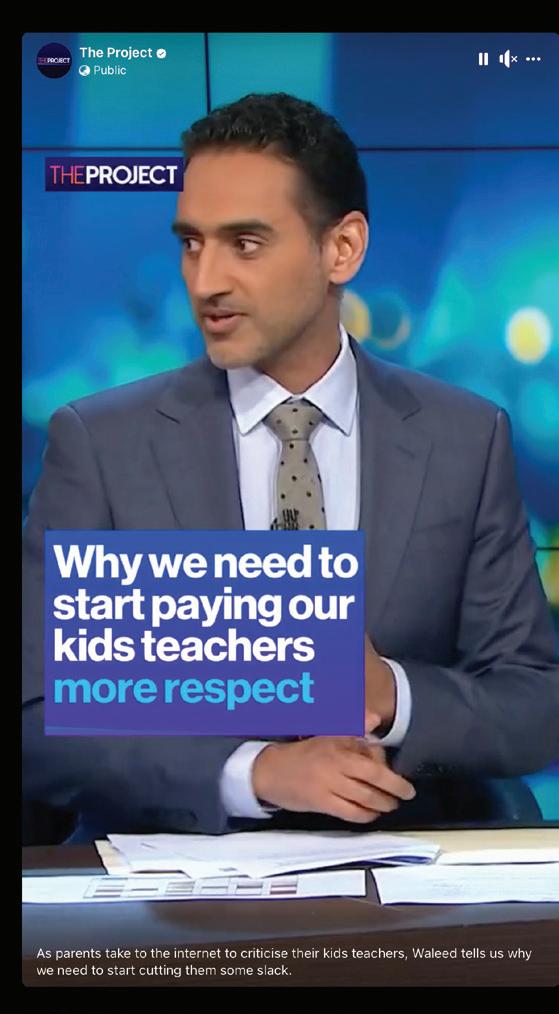
“We give them no respect and give them no authority,” Aly said. “We complain when they teach our kids by correcting them or disciplining them in perfectly legitimate ways.”
Undermining job satisfaction Declining respect for the teaching profession has long been a factor in teachers’
The Australian Catholic University’s latest survey of principals found 87 per cent of school leaders said parents and caregivers were sources of cyber bullying. Sixty-three per cent of school principals reported threats of violence from parents and caregivers.
A 2022 Monash University study found 70 per cent of Australian teachers do not feel teaching is respected or appreciated by the public.
The Australian Teachers’ Perceptions of their Work Report in 2022 also revealed less than one-in-10 feel respected by politicians.
Politicians play a part
Perhaps this is where the real problem lies. Politicians undermining teachers and seeking to ignite culture wars with baseless criticisms of school curriculums hardly sets a good example for parents, let alone students.
Attacks on teachers before and during the federal election campaign prompted education unions to demand the Coalition stop vilifying teachers.
“This political interference would not be accepted in any other occupation and it will not be accepted by teachers,” the unions said in a joint statement.
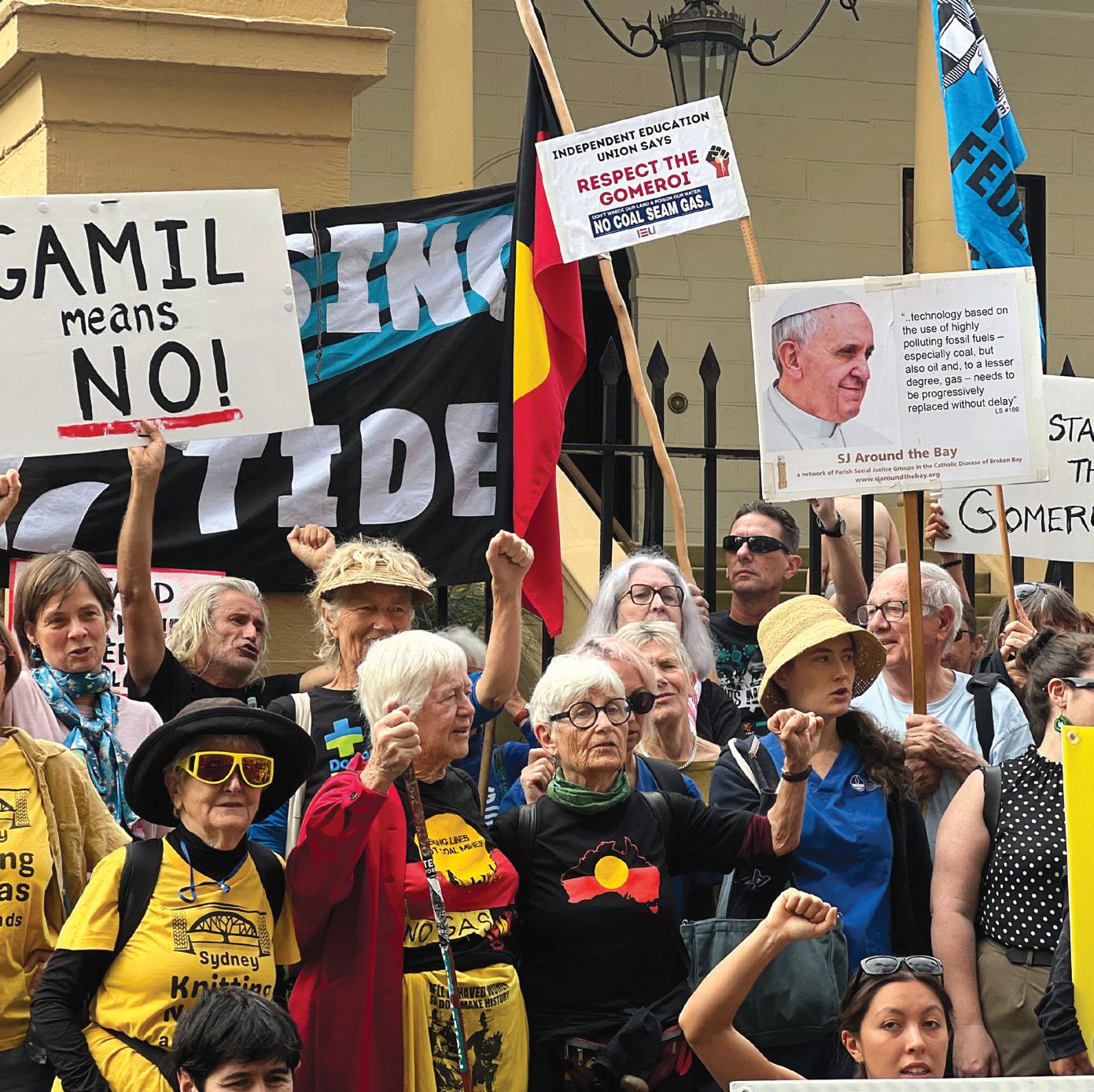

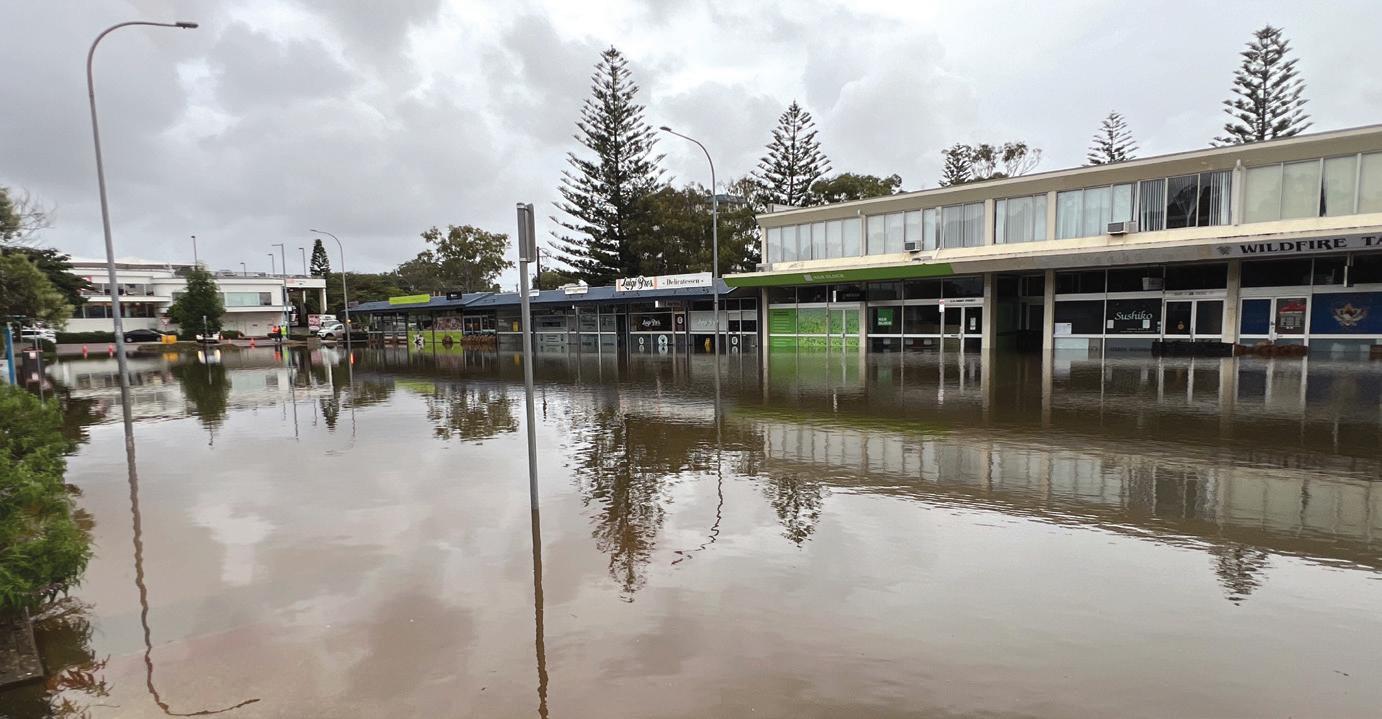
The IEU stands with our members in northern NSW, the Mid North Coast, the Hunter region and the Central Coast – 16 local government areas were declared natural disaster zones in May after heavy rains battered the state.
Scores of schools and early childhood services were closed in regions devastated by floods.
As recovery efforts begin, we take this opportunity to remind you of the following provisions for natural disasters:
All school staff and early childhood staff: If your school is closed because of flooding, you should be able to work from home and not be required to take leave of any kind.
Catholic diocesan schools: If your school is open but you cannot get to work because of flooding, in most cases you are eligible for paid emergency disaster leave of up to five days per annum and may also be entitled to personal/carer’s leave.
Independent schools covered by the Association of Independent Schools (AIS) multienterprise agreements: If your school is open but you cannot get to work because of flooding, you are entitled to paid natural disaster leave of up to two days per annum. You may also be entitled to personal/carer’s leave.
Early childhood services: If your service is open but you cannot get to work because of flooding, and if your service has an enterprise agreement, we encourage you to check the wording to see if you are entitled to emergency disaster leave. If flooding means you need to care for a family member because of the unexpected emergency, you may be entitled to take personal/carer’s leave.
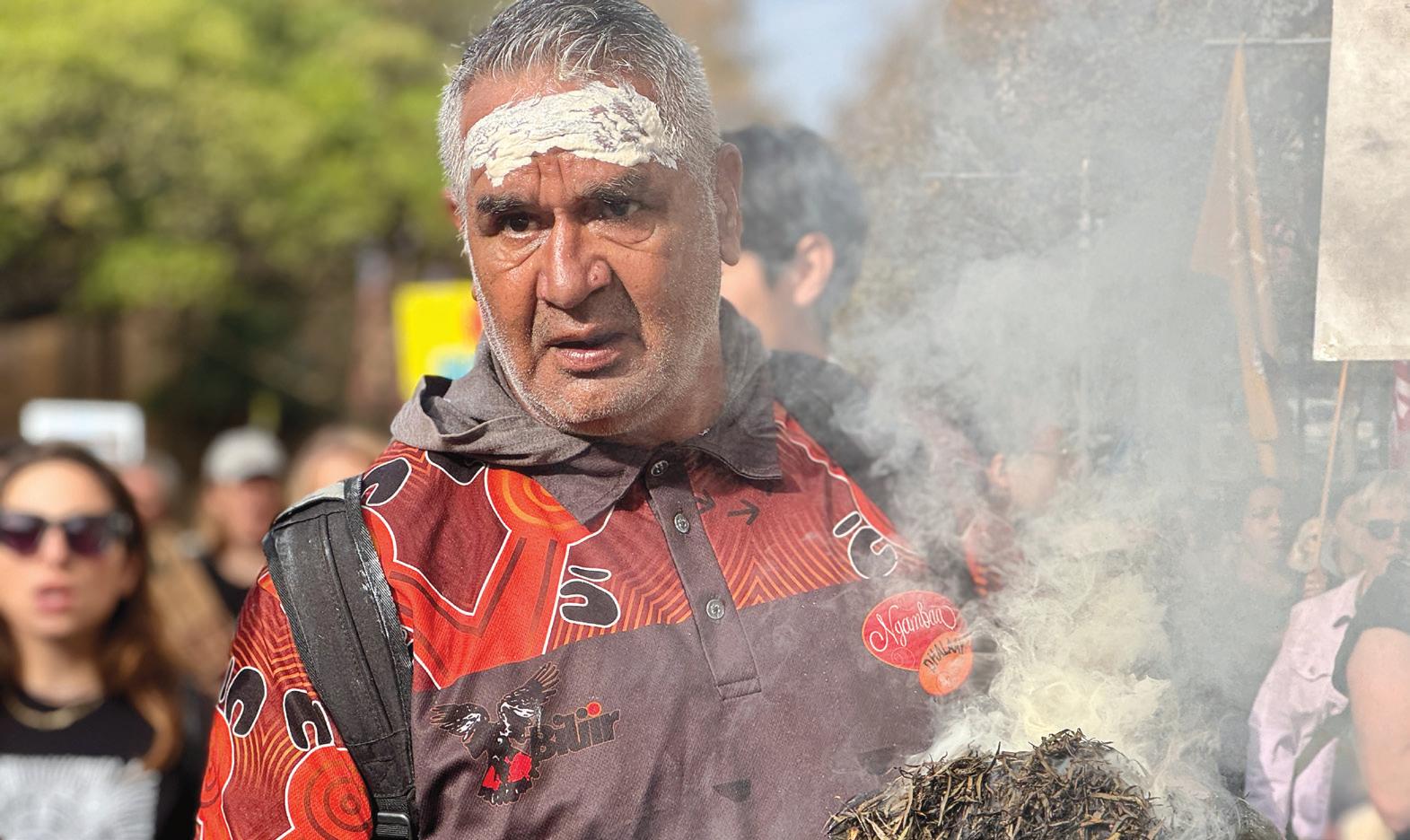
The IEU has long supported the Gomeroi people and their campaign to stop mining company Santos drilling 850 coal seam gas wells in the Pilliga region in northern NSW.
In the past few years, union members have visited the Pilliga to understand what the Gomeroi are fighting for.
We have seen first hand the importance of protecting the Great Artesian Basin and the Pilliga Forest.
On 19 May, the National Native Title Tribunal ruled the NSW government can lease land to Santos for gas extraction.
This decision all but extinguishes Gomeroi land rights and paves the way for Santos to commence mining for gas in the Pilliga.
IEUA NSW/ACT Branch Deputy Secretary David Towson said the union condemned the tribunal’s decision.
“The IEU acknowledges the tenacity and courage of the Gomeroi in their David and Goliath struggle against Santos,” he said.
“We recommit to supporting the Gomeroi against Santos’s plans to inflict environmental and cultural vandalism on the Pilliga.”
Union support for Gomeroi traditional owners Following the decision, IEUA NSW/ACT Branch Secretary Carol Matthews was among 11 union
leaders who signed an open letter demanding the federal government stop the mining project.
The letter called on ministers to use the “multiple policy and regulatory levers” available to them to stop this profit-seeking, destructive project from going ahead.
Read the full letter: bit.ly/GomeroiLetter
Unions stand with Gomeroi in Sydney
Before the tribunal decision, the IEU joined Gomeroi traditional owners, unions, farmers and other groups at a rally outside the NSW Parliament.
At the rally, Gomeroi elders and NSW politicians called on the state and federal governments to uphold native title rights and end Santos’s mining project.
The 10-year battle for the Pilliga is not over. The IEU and the NSW union movement have vowed to stand with the Gomeroi traditional owners in this ongoing fight for the Pilliga and First Nations justice.
David Whitcombe Organiser
Katie Camarena Digital Manager

May Day recognises the history of working people organising and fighting to achieve a better way of life, decent pay and working conditions.
Unionists around Australia attended May Day events to celebrate the achievements of the union movement. This year’s events took place with the federal election just two days away.
On 1 May, the IEU attended the May Day Toast hosted by Unions NSW at Sydney Trades Hall.
The following evening, former Australian Council of Trade Unions president Sharan Burrow delivered the May Day Toast at the Hunter Workers May Day dinner in Newcastle.
On the eve of the federal election, Sharan spoke about the importance of our vote and how our rights at work were at risk.
The day after the election, a jubilant atmosphere enveloped the streets of
Newcastle as the May Day rally got under way.
Weary from the campaign but energised by the result, IEU members joined unionists and supporters on the march from the Newcastle Museum to the Train Sheds.
Flags and banners fluttered as May Day marchers heralded the election result – and there was plenty to celebrate locally with every seat in the Hunter region won by Labor.
Every year, May Day stands as a powerful reminder of the hard-won rights we continue to enjoy, such as the eight-hour work day, fair wages and safer working conditions –all achieved through collective action and solidarity.
It is a day to celebrate past achievements, honour the sacrifices made by previous generations of unionists, and inspire continued efforts towards better workplace outcomes for all workers.
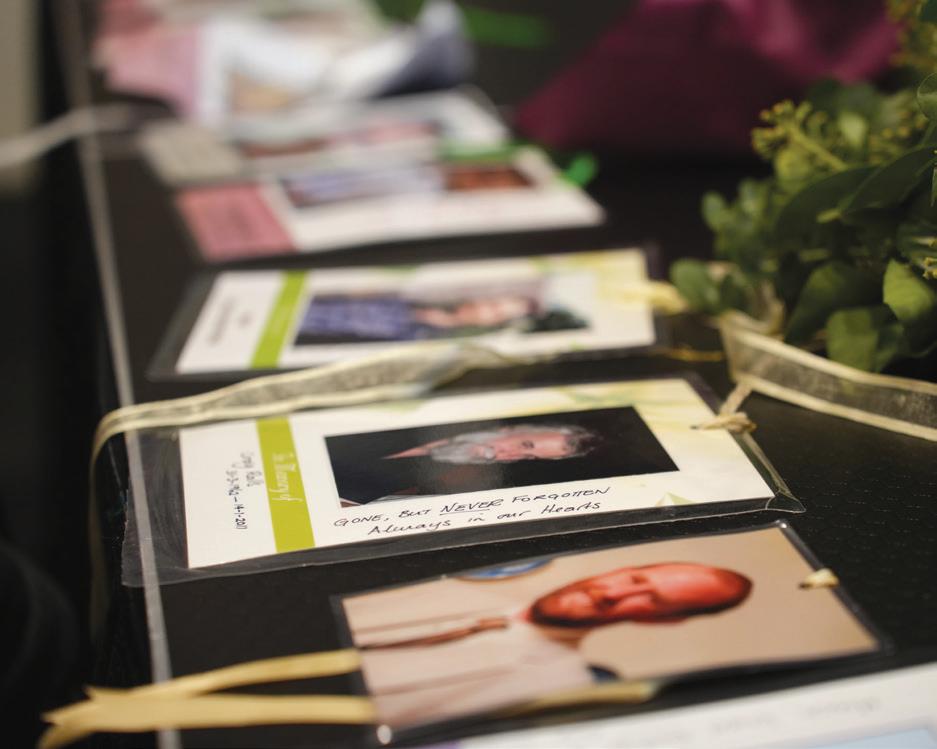
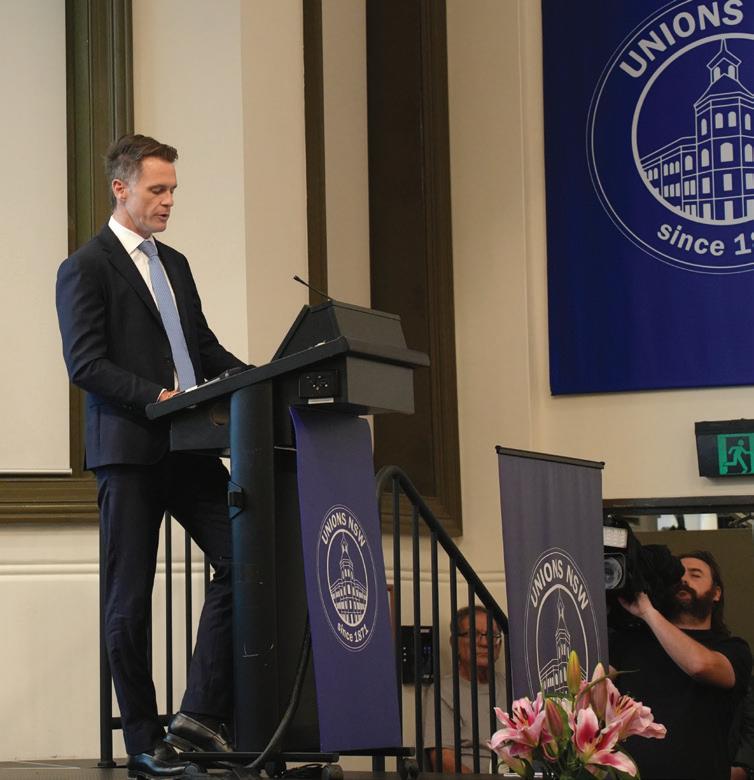
The IEU joined calls to continue the fight to protect workers and strengthen safety regulations.
On 28 April, the IEU attended Union NSW’s International Day of Mourning ceremony alongside NSW Premier Chris Minns, other union representatives and the families and loved ones of those who have lost their lives at work or because of health or mental health issues caused by work.
Speaking on behalf of families, Debra Pascal said the ceremony was an opportunity to remember those who have died, and “recommit ourselves to a future where no family has to endure the heartbreak of losing someone they love to a preventable workplace incident”.
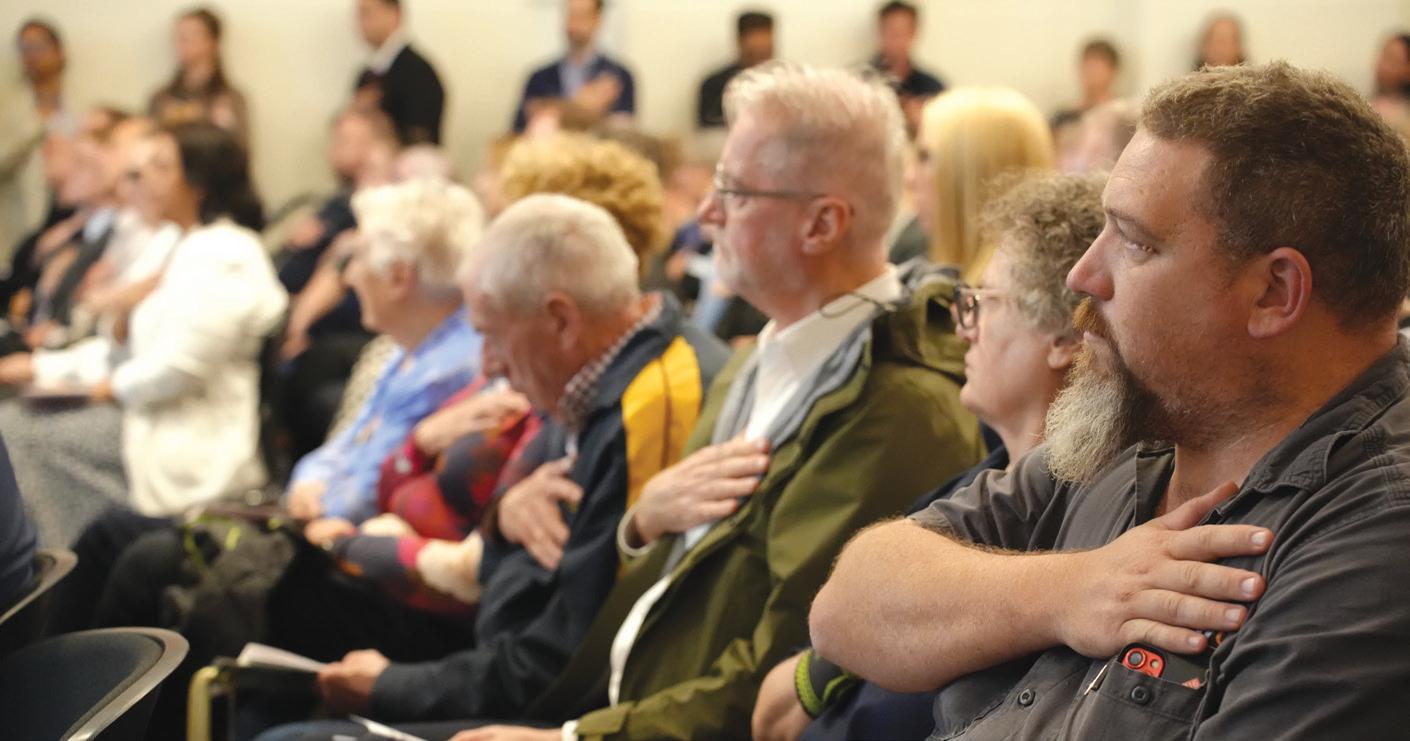
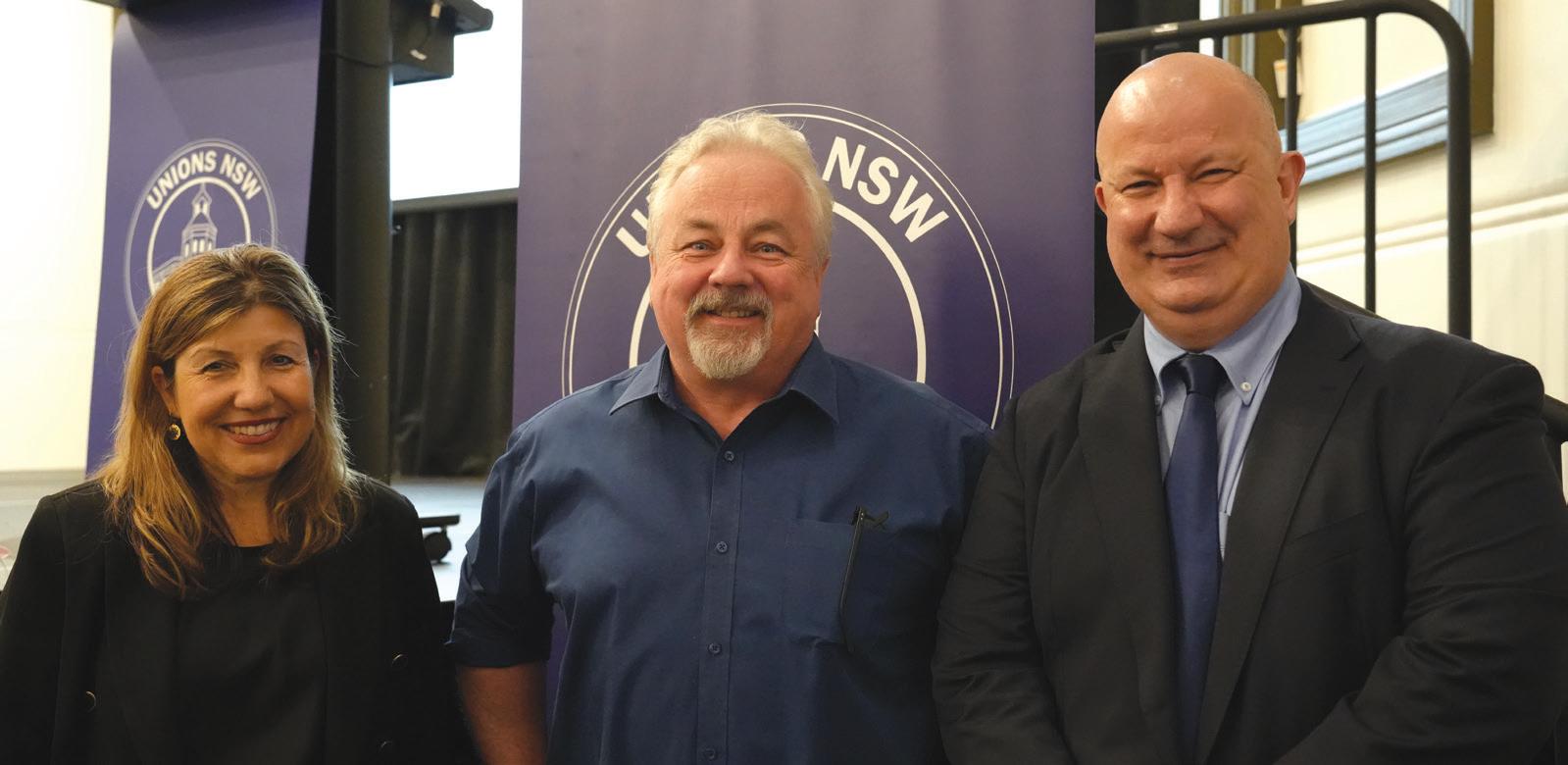
“Today we mourn,” she said. “Tomorrow, and every day after, we fight for a safer world of work.”
Impact of recent laws
NSW Premier Chris Minns highlighted changes to workplace safety legislation last year, including the criminalisation of industrial manslaughter and the banning of engineered stone, which causes silicosis, a deadly lung disease.
Minns thanked unions for their role in advocating for change. “Every workplace death is a tragedy, but without the scrutiny of the union movement … the truth of the matter is, we would be mourning more Australians today who’d lost their lives in the workplace,” he said.
In 2024, SafeWork NSW reported 168 workplace fatalities – a 19 per cent decrease in deaths since 2013.
More work to be done
Unions NSW Secretary Mark Morey acknowledged the bipartisan support for these changes.
“Workplace safety should always be bigger than politics,” he said.
Despite positive improvements, Morey highlighted the need for further advocacy, especially in the implementation of legislative changes.
“We must continue to work together to force needed change, no matter how long it takes,” he said.
“We owe it to those who are not with us today.”

The IEU calls on the NSW government to reform outdated anti-discrimination laws to protect teachers and students.
The NSW Law Reform Commission in May released a consultation paper as part of its review of the state’s Anti-Discrimination Act, which is almost 50 years old.
The Commission is canvassing options for reform of the Act and seeks community feedback ahead of another consultation paper and its final report to the NSW government.
The IEU wants to see all exemptions to antidiscrimination laws scrapped.
No need to discriminate
IEUA NSW/ACT Branch Secretary Carol Matthews said discrimination is unwelcome in schools and would be unlawful in every other industry.
“Schools of faith can continue to thrive without the need to discriminate,” Matthews said.
“School employers have nothing to fear from modern community standards.”
Australia’s new “right to disconnect” laws have been backed by a surprising source: the nation’s employers.
In a survey of more than 600 senior business leaders by the Australian Human Resources Institute (AHRI), 58 per cent of bosses reported that the new rights had boosted productivity and employee engagement. That is, the right to refuse work-related contact outside normal hours, was having a positive effect.
In contrast, just 4 per cent of organisations said the right to disconnect had diminished employee engagement and productivity levels.
More than one-third of bosses also said the new right to disconnect, legislated by the Albanese government and coming into effect in 2024, had led to a fall in employee stress and improved work-life balance among working people.
“It also seems that the introduction of the right to disconnect has improved organisations’ ability to manage urgent or time-sensitive matters outside standard working hours,” the survey found.
Other workplace reforms, including changes to fixed-term contracts, casual employment and measures to prevent and respond to workplace sexual harassment and bullying, also had a positive impact on productivity and employee engagement, the survey found.
Most employers cannot lawfully discriminate against their employees.
Yet faith-based schools have special exemptions that mean teachers and support staff can be sacked or miss out on promotion or training because of their sex, homosexuality, pregnancy, disability, transgender grounds and marital or domestic status.
Teachers, school leaders and school support staff have shared heartbreaking stories with the union of the discrimination they have suffered at work because of their sexual orientation, for accessing fertility treatments, a change in their relationship or pregnancy.
“Our members should not be at risk of losing their jobs because of their sexual orientation or because they divorce, remarry or use contraception or IVF services,” Matthews said.
Teachers and students deserve protections Union members in faith-based schools deserve the same protections against workplace discrimination as teachers and support staff in government schools.
Matthews said special exemptions to discriminate are in conflict with the responsibility of employers to mitigate psychosocial hazards in the workplace.
“Discrimination at work can have a devastating impact on the mental health of workers,” she said.
“Teachers and support staff in faith-based schools deserve the same employment protections as the rest of the community.”
The union also wants an end to exceptions to the Act that permit faith-based schools to discriminate against students based on sex, disability, age, transgender grounds, homosexuality or marital or domestic status.
Matthews said discrimination is harmful to vulnerable students who deserve protection.
“Faith-based schools funded with public money should be safe for all students and accountable to community expectations,” she said.

“Overall, employers saw positive outcomes out of recent workplace legislation and for many it was adding to workplace productivity,” AHRI chief executive Sarah McCann-Bartlett told The Australian The IEU welcomes this belated support from employers for the right to disconnect and other reforms to improve workers’ lives. Employer requests, parental queries and student contact often encroach on the personal time of teachers and support staff. The growth of mobile technology and assumed 24/7 connectivity have only made this worse.
There is still much to be done to address the workload pressures in schools.
But the right to disconnect helps overworked school staff by providing a right to refuse to monitor, read or respond to employer or work-related contact after hours or on weekends.
Michelle Thompson Vice President Early Childhood Services

The early childhood education and care sector has been in the spotlight in the past few months following shocking revelations about the abuse and mistreatment of young children in several centres.
The stories raise serious questions about a flawed regulatory system that permits centres to continue operating despite ongoing child safety issues. These are often run by for-profit providers.
The IEU welcomes the NSW Upper House inquiry into the sector following these revelations of serious safety breaches.
Action is clearly needed to protect vulnerable children.
The National Quality Framework (NQF) is Australia’s system for regulating early childhood education and care, providing
a national approach to regulation, assessment and quality improvement in early learning and out of school hours settings.
It is time to reflect critically on the NQF – from the approval provider system to the assessment and rating of centres.
There should be a stronger focus on compliance and a clear process for dealing with centres that repeatedly fail to meet safety standards.
Child safety paramount
The regulatory system needs to ensure that all centres meet the accreditation standards required by law and that parents expect. Highly qualified staff are crucial.
The serious safety breaches at for-profit centres raise questions about the qualifications of employees and their understanding of child safety.
Do they feel empowered to report concerning behaviour by other staff and are they protected if they do?
Teachers employed by KU Children’s Services have won better pay and conditions after an overwhelming majority voted in favour of a new enterprise agreement (EA).
However, due to an administrative error, the EA that was distributed to employees contained incorrect pay rates and the vote will need to be held again.
Nevertheless, after extensive bargaining, the IEU successfully secured improvements for members in these centres, including pay rises and more noncontact time.
Members who work in long day care will also have access to pay rises (15% over two years) funded by the federal government, in addition to the 4% annual increases for teachers in both long day care and preschools.
The agreement was finalised after the IEU lodged a bargaining dispute with the Fair Work Commission, prompting KU to amend its draft EA to address many of the union’s concerns.
The union thanks members for their feedback and support during this protracted and challenging
process. It is only through the strength of our membership that we can secure better outcomes.
YAELC
The IEU endorsed the Young Academics Early Learning Centres EA, which provides above-award conditions and access to the 15% Commonwealth-funded pay increases.
Voting for the agreement took place in May, with 97 per cent voting yes. The agreement was approved by the Fair Work Commission on 2 June.
SDN
The IEU encouraged members to vote yes to the SDN EA, which provides pay rises, improved parental leave and access to the 15% Commonwealth-funded pay increases.
The practicum supervision allowance will also be paid to supervising teachers.
With 93 per cent of staff voting yes, the agreement was due to be lodged with the Fair Work Commission as Newsmonth when to press.
The IEU welcomes the strong support for gender equality shown by shareholders of G8 Education.
Almost 30 per cent of shareholders voted at G8’s annual general meeting on 29 April for a resolution to fund paid parental leave for staff.
G8 is Australia’s largest sharemarket-listed childcare provider. It employs about 10,000 people – mainly women – at more than 400 childcare centres throughout Australia.
The resolution asked G8 to follow the Workplace Gender Equality Agency’s best practice process for creating a paid parental leave policy.
Yet the G8 board recommended a vote against the resolution to fund paid parental leave for staff.
Fighting for better outcomes
The IEU represents university-qualified teachers in long day care centres in NSW and the ACT.
IEUA NSW/ACT Branch Secretary Carol Matthews said childcare providers such as G8 should fund paid parental leave to address the sector’s staff shortages and high turnover rates.
“A lack of employer-paid parental leave contributes to women’s economic inequality,” Matthews said. “This is why we will continue to fight for better outcomes for teachers in the sector.”
Pushing board to act
The union backed the campaign by shareholder lobby group Sustainable Investment Exchange (SIX) to pressure G8 to show it valued early childhood educators through paid parental leave.
The IEU’s petition calling for paid parental leave was handed to G8’s executive at the AGM by SIX Campaigns Manager Phoebe Rountree.
Rountree said the shareholder activist group was hopeful the high vote result will prompt G8’s board to take action.
“Women taking unpaid time to care for newborns and young families is a big contributor to the gender pay gap,” she said. “The vast majority of G8 Education’s employees are women. Offering paid parental leave is a practical step towards gender equality.”
Soaring salary for CEO
G8 Education chief executive Pejman Okhovat’s salary package is reportedly worth $3 million a year.
Yet university-qualified teachers at long-day care centres operated by his company earn only a fraction of this salary and have no access to employer-paid parental leave.
G8 is also embroiled in the growing scandal over serious safety breaches at childcare centres, which is now the subject of a NSW parliamentary inquiry.
Matthews said the union was disappointed by the outcome of the vote but heartened by the support shown by one-in three shareholders for paid parental leave.
“These shareholders know it makes economic sense for G8 to fund paid parental leave for its staff,” she said. “Improving pay and conditions for teachers and educators in this sector means better learning outcomes for children.”
Staff in the early childhood education and care sector are mandatory reporters under child protection laws and are required to report concerns about a child’s safety.
The NSW Department of Education has emailed services, inviting them to participate in a review of child safety in the sector.
I encourage you all to take part in this survey to have a voice in strengthening child safety in early childhood education settings.
New minister
As a result of the recent federal election, Victorian Senator Jess Walsh was appointed Minister for Early Childhood Education, replacing Dr Anne Aly.
We thank Dr Aly, who spent a day with IEU members in 2022, and we look forward to working with Senator Walsh across several key areas, particularly on the importance of highly qualified staff and improving our pay and conditions.
See also Rogue childcare operators, page 5.
If you’re an early childhood education and care member, you will receive your latest edition of Bedrock with this copy of Newsmonth
Learn about the benefits of “Grandfriends” programs, where young children and elderly people spend time socialising to build positive relationships and learn from each other.
Discover how to spark children’s curiosity to enhance their learning.
Find out how a new online tool can help you develop specialist knowledge and skills for teaching children under three.
New research explores the importance of a sense of belonging for teachers working in rural, regional and remote communities.

We hope you enjoy this edition of Bedrock and find it valuable for your professional practice.
Our next issue comes out in November.




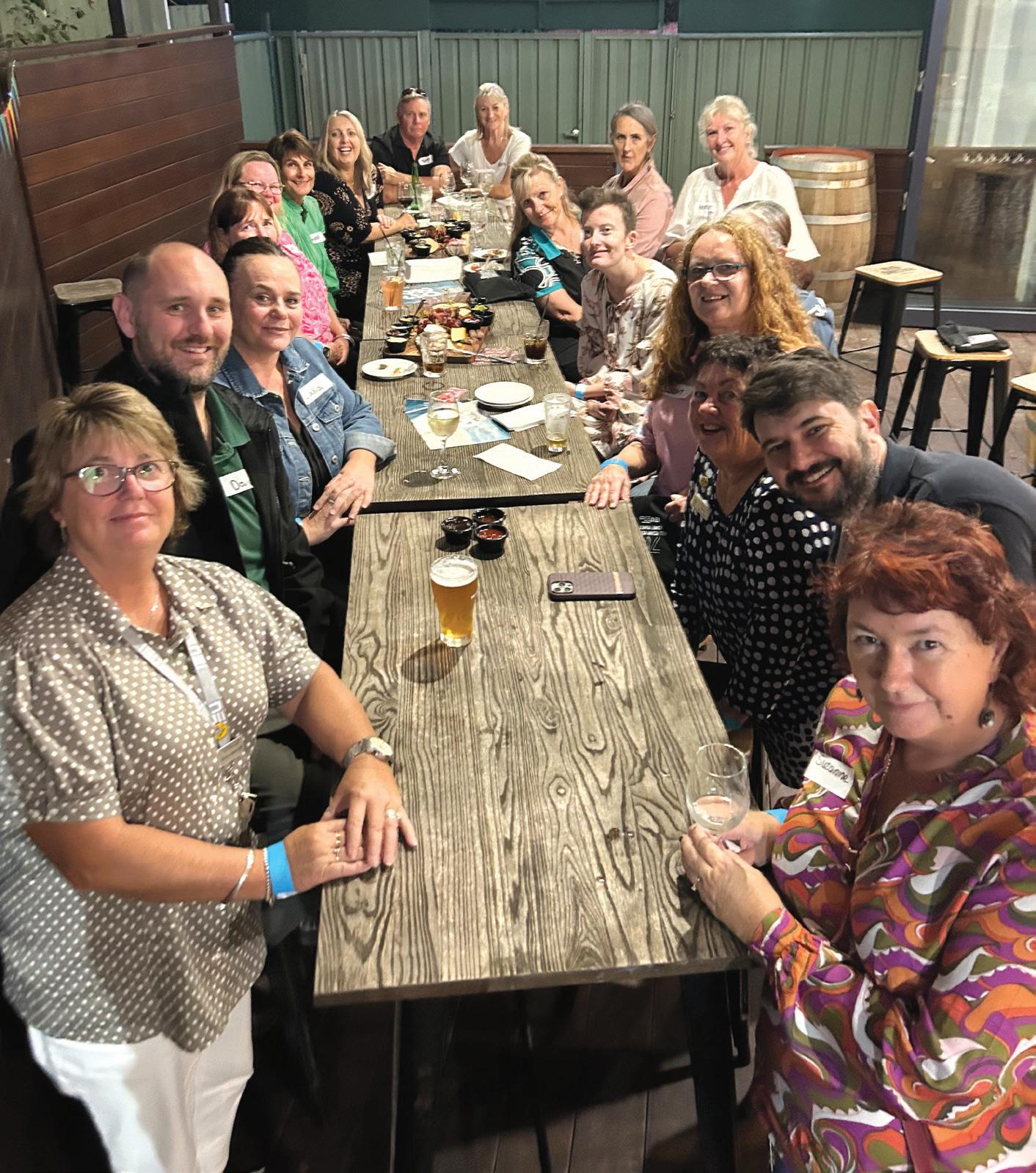
Mid North Coast support staff came together for a warm and lively celebration to mark World Support Staff Day on 16 May – and to launch the region’s first Support Staff Network.
Held at the Settlers Inn in Port Macquarie, the inaugural event welcomed almost 30 school support staff from across the area.
With administration and learning support staff as well as grounds and operations staff joining us, the vibe was immediately relaxed as people connected, shared stories, and built new relationships.
The evening was proudly hosted by the IEU, with thanks to the dedicated efforts of convenors and IEU members Tracy Bancroft and Vickye McKechnie, who brought the idea to life.
In their heartfelt comments to those gathered, Tracy and Vickye said: “The strength of any union lies in its connections, in the relationships we build, and in the solidarity we foster.”
The event was not just about celebration, it was also about recognition. As Tracy and Vickye said, support staff are the heart of our
schools: “Without you, education simply wouldn’t be possible.”
Their reflections on the challenges support staff face, and the critical role of union solidarity during tough times, struck a chord.
The launch marks the beginning of something bigger: a network created by support staff, for support staff. It’s a way to be heard, supported and united.
If you are on the mid-north coast and couldn’t make it this time, there will be more opportunities to join in. And if you work with someone who isn’t yet an IEU member, invite them to join, and bring them with you to our next event.
Here’s to a stronger, more connected IEU support staff community. We’re just getting started.
Sean van der Heide Organiser

World Support Staff Day on 16 May was an important opportunity to recognise and celebrate colleagues.
World Education Support Personnel Day is an initiative of Education International (EI), the global federation of teachers’ unions that represent over 32 million members worldwide. Everything that happens within our schools that enables teachers to teach and students to learn starts with support staff.
The engine room of all schools is their support staff.
We send a big thank you to all our support staff members across NSW and the ACT.
The IEU welcomes the re-election of a federal Labor government that prioritises education and a fairer deal for all working people.
IEUA NSW/ACT Branch Secretary Carol Matthews said the union supports a government focused on investing in the education system at all levels, from long day care to TAFE and university students.
Matthews joined IEUA Federal Secretary Brad Hayes in congratulating the continuation of Minister Jason Clare in the Education portfolio.
Matthews also congratulated new Early Childhood Education and Youth Minister Senator Jess Walsh and new Employment and Workplace Relations Minister Amanda Rishworth on their appointments to these crucial portfolios.
“We look forward to working with them to build a sustainable, high-quality teaching workforce, deliver further education reforms and continue vital progress in industrial relations,” she said.
Next stage of reforms
Matthews said the union looked forward to working with the federal ministers on the next stage of reforms needed for education students, teachers and school staff.
The IEU supports efforts to improve the working lives of teachers and school support staff, including new ways to clarify and reduce workloads.
“We will continue advocating for adequate staffing and resourcing of schools and measures to attract and retain the next generation of teachers,” Matthews said.
The IEU urges the federal government to implement its reform program, beginning with a 20 per cent reduction in HECS-HELP debts, which means more than $5500 will be cut from the average early career teacher’s university debt of $27,600.
“Providing new teachers with much-needed financial relief as they begin their career in the classroom is essential to addressing staff shortages,” Matthews said.
The IEU also calls on the federal government to protect all education employees from discrimination by removing special exemptions that allow faith-based schools to discriminate.
“No employer should be allowed to ‘lawfully discriminate’ due to an employee’s sex, sexual orientation, marital status or pregnancy,” Matthews said. “School employers have nothing to fear from modern community standards.”
The union backs further steps towards universal childcare, including building more
early childhood education and care centres and supporting high-quality not-for-profit providers.
Vital industrial reforms
Matthews acknowledged the vital industrial reforms delivered in the Albanese government’s first term, including: changes to workplace laws that have delivered higher wages and better conditions
the right to disconnect from work outside normal working hours
• fully funding all government schools in Australia
three days guaranteed early childhood education and care
15% pay rises for teachers and educators to help build a sustainable early childhood education and care workforce.
“We look forward to the Albanese government continuing to implement important education reforms as well as workplace laws that protect and deliver for the working people of Australia,” Matthews said.
Significant concerns
Hayes said there were many issues that affected the delivery of quality education and
the work of IEU members in schools and early childhood education.
“Political and media attacks on the professional autonomy of teachers and excessive workloads remain significant concerns,” he wrote in a letter to Minister Clare.
Hayes also said the union will continue to campaign on further changes needed to reduce teacher workload and career burnout.
“While the immediate responsibility for these issues rests with school employers in our sector, there is also scope for federal government intervention to help address these issues.”
In a letter to Senator Walsh, Hayes said the Albanese government’s commitment to the importance of early childhood education and willingness to work directly with the sector and unions was in stark contrast to “the inadequate positions of the federal Coalition”.
“Excessive staff workloads and pay and conditions that continue to lag behind education industry benchmarks remain significant concerns,” he said.
IEU reps share how they’re building strong chapters. Strong chapters make for a strong union and therefore greater bargaining power for all members.
Odyssey College, Ingleburn
Greg Hughes teaches at Odyssey College in Ingleburn, a small school within an adult residential drug and alcohol rehabilitation centre. He has been the rep for seven or eight of the 20 years he has taught at the college.
Eight teachers at Odyssey College deliver Stage Six Life Skills with the aim of helping residents re-enter the workforce.
Subjects covered include English, industrial technology, visual arts, maths and computing, along with personal development, health and physical education. There are about 70-80 students at any one time.
“It’s a really unique school, and it’s rewarding,” Greg said. “I’ve taught in tough schools before here, and there’s a lot of respect from our students.
“Students can be tough at times, but there’s a lot of respect here.”
In turn, Greg has great respect for his students. “If they don’t want to be there, they don’t have to be there – the alternative may be jail or going back to addiction, but they don’t have to be there,” he said.
“The people who are there want to be there, and they want to learn, and they want to get better.”
Greg initially joined the IEU for security when
Jodie-Lee Leitch’s young pupils reap the benefits of her own extensive education: she holds four university degrees.
A preschool teacher at The Illawarra Grammar School’s The Piper Centre, Jodie-Lee has been an IEU member for 17 years. She has always taught in the early childhood sector.
“When I started my postgraduate work in autism that led to my master’s, I was the only person enrolled at the University of Wollongong linked to the early childhood sector,” she said.
Jodie-Lee said she initially joined the union “for protection”, but this has expanded during her 17 years as a union member.
She became a rep to help her colleagues understand their rights.
“I like to see myself as a helper,” Jodie-Lee said.
“Over the years, I’ve seen people who are union members but they’re unsure as to what their rights may or may not be.
Jordan Timpano
Holy Spirit College, Bellambi
Jordan Timpano is an English and Catholic Studies teacher at Holy Spirit College, Bellambi.
An IEU member since he started working for the Catholic Education Office some 10 years ago, Jordan joined the union on the advice of some older colleagues.
“They said it would be in my best interests to be covered and have the support of the union, particularly when it came time for contract and work practices negotiations,” he said.
Jordan became the rep after his long-standing predecessor stepped down.
“He was chapter rep for about 75 years,” Jordan laughed. “And he was looking for a young, motivated person to take over.
“We sort of shared the load for a year, and he taught me the importance of the chapter and rep’s role and I’ve continued in that role.”
Most of the staff at Holy Spirit are IEU members, but Jordan doesn’t take that for granted.
“It comes from years of members normalising union conversations in the workplace,” he said.

the school was going through some changes, but he also came with a union background, having previously been a fitter and machinist.

“I’ve always been part of a union and always been passionate about unions,” he said.
“We didn’t have a union presence within the school, and it was me who got people involved –now all of our teachers are members.”
While he transforms lives by day, Greg turns into a musician at night. He is a singer, songwriter and soloist, playing classic rock.
“I’ve always sung in bands, but now I’m doing my solo work,” he said.
A resident of the Southern Highlands, Greg is on the lookout for more local gigs.
Greg attended IEU reps training in March as a refresher. “I’m happy to be here, and I get a bit of networking out of it as well,” he said.
The Piper Centre at Illawarra Grammar School, Mangerton
“I see myself as a helper –not only in the early childhood sector, but also at my school, wanting to help people in regard to the union.”
Campbelltown
Suzanne Pence is the rep at Warakirri College in Campbelltown, where she is a maths and geography teacher.
Warakirri was founded in 2008 to help young people disconnected from mainstream education to achieve their Record of School Achievement (RoSA) and/or HSC.
The college has about 100 staff across four campuses (Campbelltown North, Campbelltown South, Fairfield and Blacktown).
At the Campbelltown campus where Suzanne teaches, there are about 90 students and eight staff.
Suzanne initially joined the IEU to ensure her workplace rights and join Teachers Health.
She became the rep to improve fairness and transparency as well as build union membership across the school’s four campuses.
Warakirri staff are currently covered by the modern award, and Suzanne would like to
St Joseph’s Catholic High School, Albion Park
see them transition to an enterprise agreement with improved entitlements.
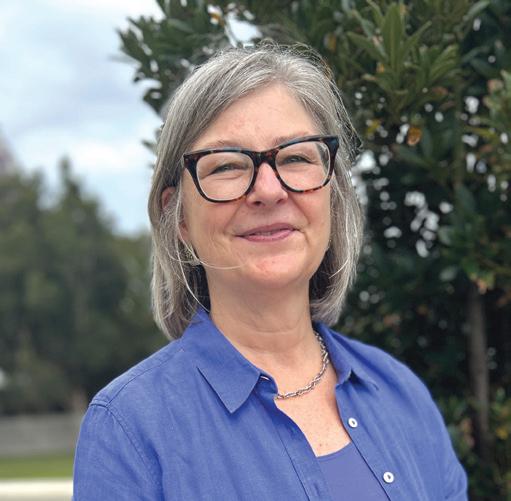

“I’d like to see greater clarity and transparency of load and responsibilities,” she said.
Suzanne knows there are members across all four campuses and she aims to network with them and the other reps to help build union membership.
An American, Suzanne came from New Jersey to Australia in 1996 to work in banking and finance. How does she like Australia? “Well, I’m still here,” she laughed.
“And given the political environment in the US, I’m very happy to be here.”

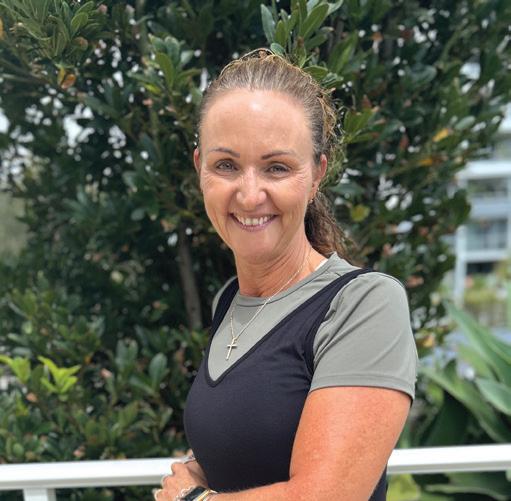
Outside of school, Jodie-Lee is also helping to stem the acute teacher shortage in the early childhood sector. She teaches at TAFE in the evenings, where she delivers part of the Bachelor of Early Childhood Education and Care.
Jodie-Lee loves working in education for its inclusivity and diversity – she believes in a sector that welcomes and helps all children.
“Education is a place that every child belongs to,” she said.
Jess Jansson got her first taste of unionism as a child. She remembers her father, who works in the electrical trades, joining a picket line.
When she started her teaching career, Jess said, “union ideas weren’t new to me”.
A HSIE teacher and co-rep at St Joseph’s Catholic High School in Albion Park, Jess said: “We teach this stuff” – workplace rights and work health and safety.
“And even just human rights – you’ve got the right to join a union,” she said.
Jess began teaching in 2010 in a government school in Campbelltown, where she was a member of the NSW Teachers Federation, before moving to St Joseph’s in 2015 and joining the IEU.
Jess good-naturedly refers to herself and her co-rep, Lachlan Young, as “protégés” of IEU President Glenn Lowe, who was the rep at St Joseph’s for close to 15 years.
Glenn suggested Jess nominate for the role as he went on leave. She was more than happy to step up.
With two small children, Jess works part time, so Glenn’s “succession plan” evolved into Jess co-repping with Lachlan, who was elected along
with her in early 2024.
“It’s good to have someone else around to bounce ideas off,” Jess said. “We work in the same staff room, so we’re always crossing paths.”


Almost all of the 80 or so staff at St Joseph’s are union members, which Jess attributes to the hard work done by Glenn and other colleagues over many years.
Jess said two reps are a good way to ensure colleagues have strong union representation “and to recruit the few outliers”.
When she’s not running around after her children, who are six and three, Jess loves to go camping.
Her favourite spot to pitch a tent? “Anywhere in that direction,” she says, gesturing towards a broad swathe of open country.
“And the further, the better.”

“It’s really important that that’s happened for the last 20 or 30 years at Holy Spirit College,” he said. “It makes it easy for the young people and new members of staff to have natural and normal conversations about our enterprise agreement and our work practices agreement.”

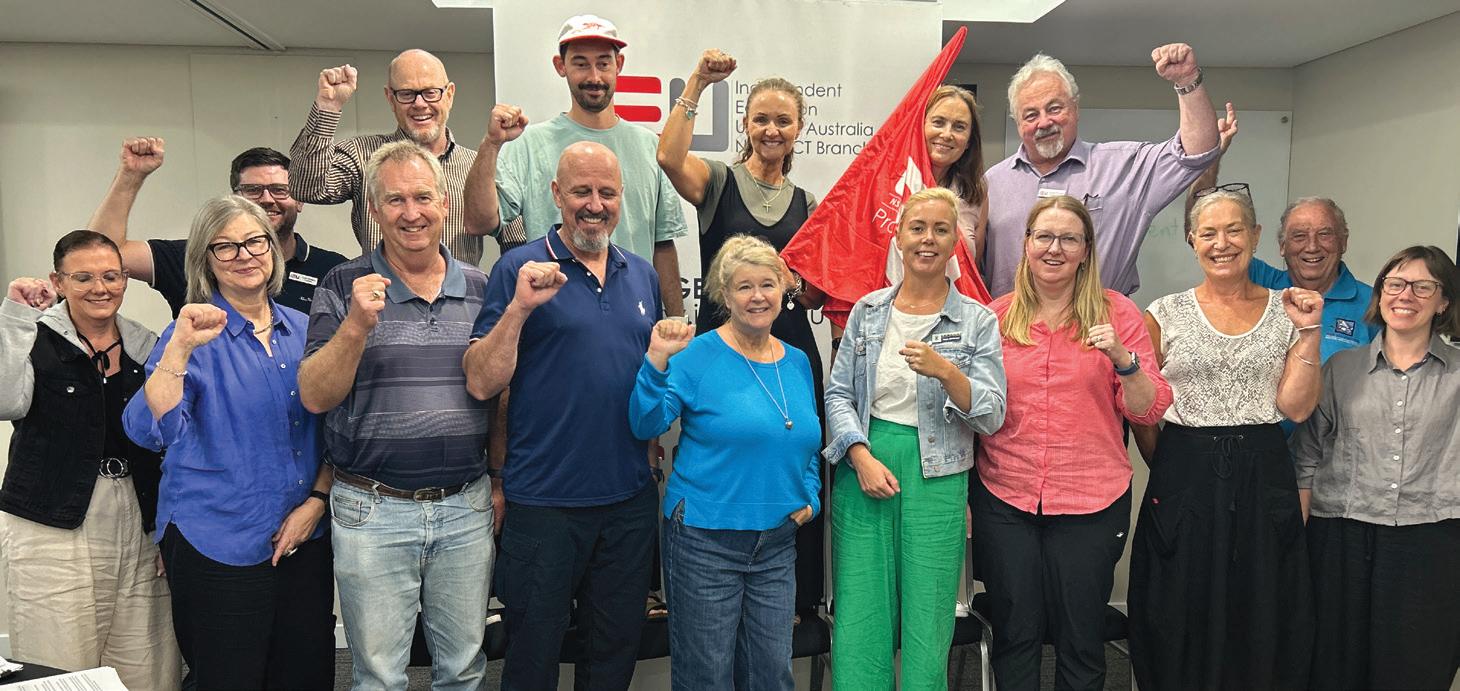
But Jordan sometimes finds people doing a double take.
“I’m an identical twin and I’m often confused for my brother in public,” he said.
“Sometimes the students say, ‘Saw you at the beach, sir’, and I say, ‘no you didn’t’.”

“There is something to be said for being authentic.”
Kathleen McCarthy inspires her students to view differences as strengths rather than limitations, writes Andrew Taylor.
From hobbies to career aspirations, teacher Kathleen McCarthy has an encyclopedic knowledge of her students at the Mt Druitt campus of CathWest Innovation College in western Sydney.
But Kathleen can struggle to recognise their faces due to prosopagnosia, or face blindness.
“I’ve always struggled to learn my students’ names,” she said. “I knew everything about them, but I couldn’t match them to their name on the roll.”
This is just one of the challenges faced by Kathleen, who was diagnosed with autism and ADHD as an adult.
“You look at the world differently,” she said. “Everything you’ve ever been told or told yourself, everything you’ve been able to do or not do, suddenly you look at that differently.”
Kathleen said the diagnoses and subsequent treatment led her to change the way she approaches life.
“Life has always been hard,” she said. “What shifted was that it was no longer a personal failure.”
Kathleen said changes to work routines such as written agendas, low-stimulation workspaces and thoughtful rostering also make life easier – “especially when they’re implemented consistently and respectfully”.
A social experience
At CathWest, a Years 10-12 co-ed school, Kathleen teaches the Cert 3 in Business Services, a vocational education and training (VET) course.
“My main teaching work is with neurodivergent students, especially those with ADHD and autism in the diversity space,” she said.
Kathleen wants neurodivergence to be understood as a social experience and not just a medical condition.
“This is important, not just in preparing students for life after school, but also in how we support autistic and ADHD educators,” she said. “This is why my school, students and their families know about my diagnosis.”
Kathleen’s own experience of neurodivergence informs her teaching practice and how she supports students who
Natalie Devenish’s strong education in a girls’ school laid the groundwork for her to lead a boys’ school, writes Andrew Taylor.
The nuns at the former Mount Erin Convent in Wagga Wagga will be pleased one of their former students followed their path into education.
But they might be surprised to see Natalie Devenish’s trajectory has taken her from a girls’ school to a career leading a Catholic secondary school for boys.
The new principal of St Dominic’s College in Kingswood, Natalie said the nuns and lay teachers who taught her were hard-working and passionate.
“My dad was also a teacher and principal, so I grew up with very strong role models who cared about young people and their futures,” she said.
An IEU member for more than 20 years, Natalie said: “I’ve always believed strongly in the union and all that they have been able to achieve for the worker.”
Natalie’s appointment also carries on a family tradition – her father Graham was principal of St Dominic’s from 1994 to 2002.
Supporting young people
Natalie begins her new role in Term 3 after stints as Assistant Principal Teaching and Learning at Christian Brothers’ High School Lewisham and Deputy Principal of St Mary’s Cathedral College in Sydney.
“I’ve been fortunate to always love teaching,” she said. “A highlight for me is the privilege to be able to teach and support young people in these important years of education and personal development.
“I’ve also loved working with so many intelligent and passionate educators who care about their students’ outcomes and options at school and post school.”
Early in her career, Natalie said there was an expectation that teachers would get involved in all aspects of school life, including sports, school concerts and camps.
“I was also keen to be involved in various school committees and put myself forward for short-term acting roles when they came up,” she said.
“This helped build my skills and learn more about various aspects of leadership in schools.”
Technology in the classroom
Natalie brings to St Dominic’s her experience in introducing datadriven instructional practices and digital learning to schools.
But Natalie said technology and artificial intelligence must not be allowed to dominate the classroom.
“The laptop has its place in the classroom, but I believe it has increasingly become a source of distraction for many students when it comes to their learning,” she said.
“I am an advocate of explicit instruction, and I’d prefer students use laptops more strategically as part of the learning process.”
Natalie said explicit instruction in the classroom is particularly effective for boys and how they learn.
Parents also opt for all-boys schools because of strong pastoral care programs, routines and boundaries and “of course, plenty of sports and extracurricular programs”, she said.
Natalie said student data is a “powerful tool” that can be used to support resource allocation in schools and support teacher practice.
“The key is to make sure schools identify the ‘right’ type of data to collect and use, how to interpret and collate it effectively then disseminate to the teacher so it’s usable,” she said.
“Teachers are time poor, so the goal is to give very clear evidence-based information that supports their teaching practice and improves student performance in their classes.”
Insights into young men
Natalie said growing up in the country with four brothers was also good preparation for her leadership role at St Dominic’s.
“I would say that my upbringing and 25 years in boys’ education gives me a strong understanding of how young men think and what they need to reach their potential,” she said.
When they were not playing sports, Natalie and her brothers had plenty of free time without parental supervision.
“As the only girl, I realised early that if I wanted to be included in the things my brothers did, I had to be like them,” she said. “There was a lot of rough and tumble, lots of playing sport – netball, touch footy, softball – and watching sports like cricket and rugby league.”
Outside of school, Natalie’s passions include practising yoga two-to-three times a week.
“I walk lots, and love watching the NRL and test cricket,” she said.
live with autism and ADHD. To these students, representation is crucial.
“We talk a lot about what life is like in the workplace, and how people relate,” she said. “There are often really big assumptions around how people engage in the workplace –and most of them assume you are neurotypical.”
Kathleen draws on her own life when discussing challenges such as maintaining eye contact, working in an open-plan office or getting bored with a work routine.
“There is something to be said for being authentic,” she said. “These kids get to know you as a whole person, just like we get to know them. There’s risk in disclosure, but my students have always been phenomenal.”
Inclusive practice
A proud IEU member, Kathleen said the union plays a vital role in supporting neurodivergent teachers.
“I’ve benefited from the work of those who have gone before in terms of gender and work conditions,” she said. “All of those things only happen because of our collective bargaining power.”
Kathleen plans to embark on postgraduate research about teacher qualification and proficiency, applying a neuro-affirming lens on placement, the Graduate Teacher Performance Assessment and Australian Professional Standards for Teachers.
“I’m excited to contribute to the broader conversation about inclusive practice and systemic change in education,” she said.
Kathleen has three teenage children who are all neurodivergent, so she does not have a lot of spare time outside of school.
She is an avid Star Wars fan and enjoys building Lego but the effort she puts into altering her behaviour and emotions to fit in with social norms, known as masking, leaves her exhausted by Friday afternoon.
“My weekends are about trying to recover so I can do it again,” she said.
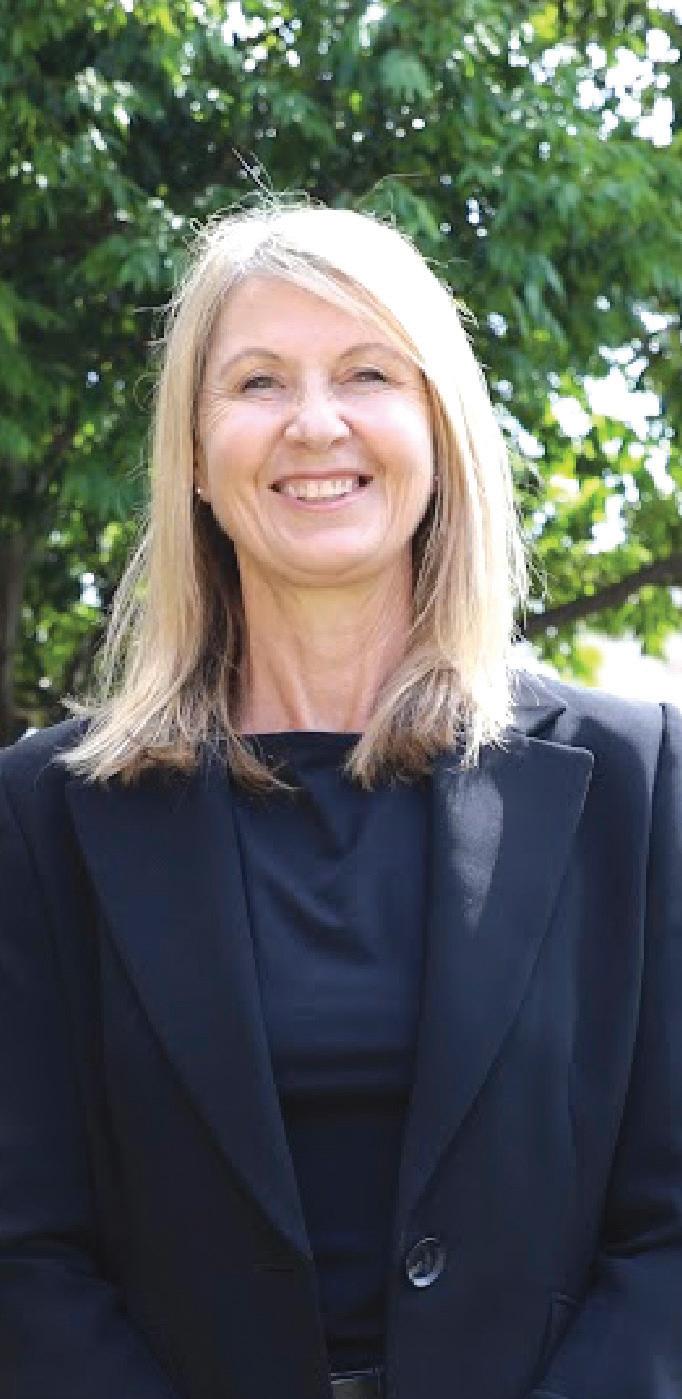
“My upbringing and 25 years in boys’ education gives me a strong understanding of how young men think.”
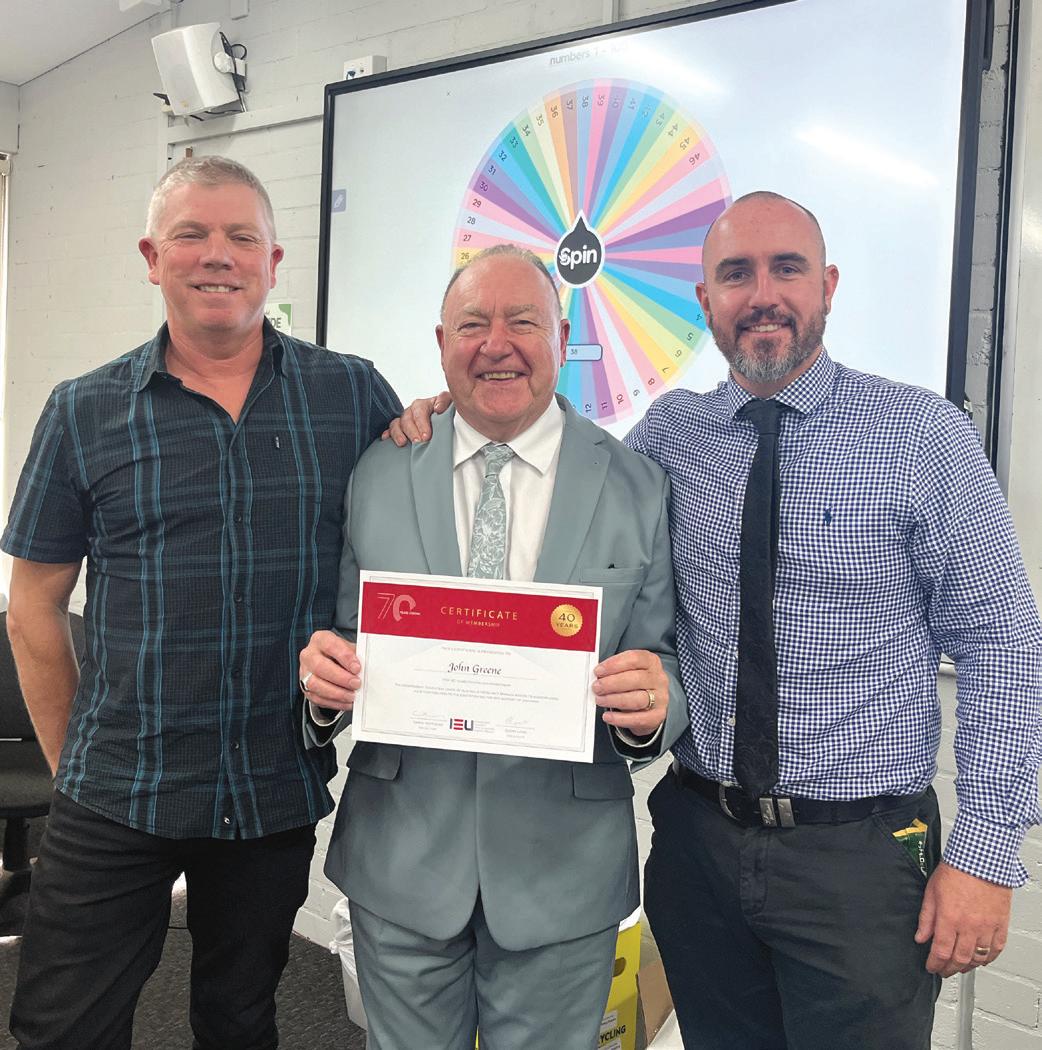
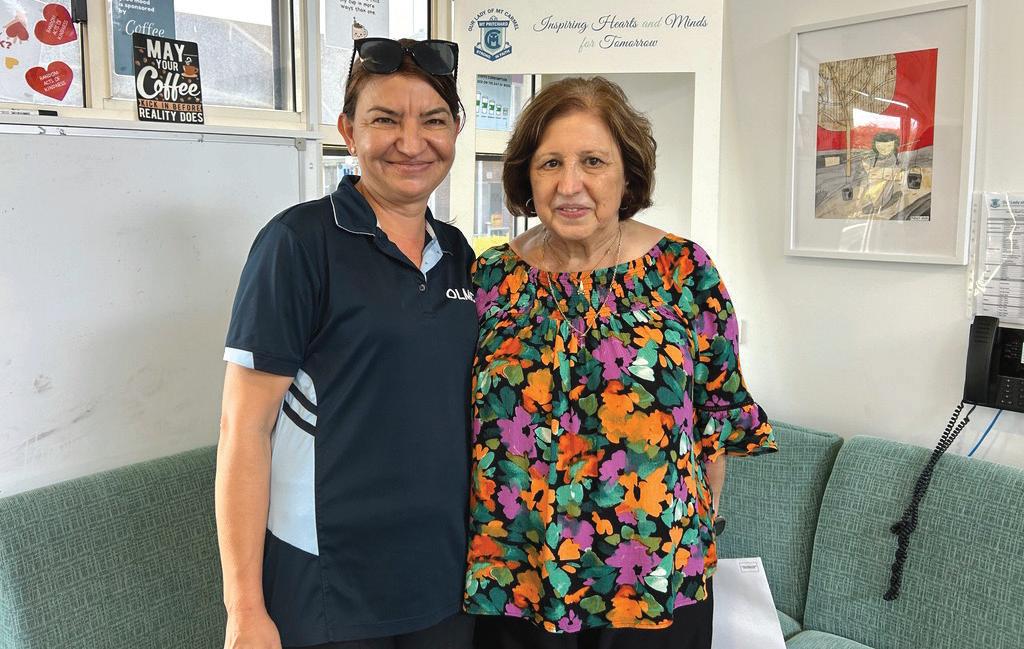
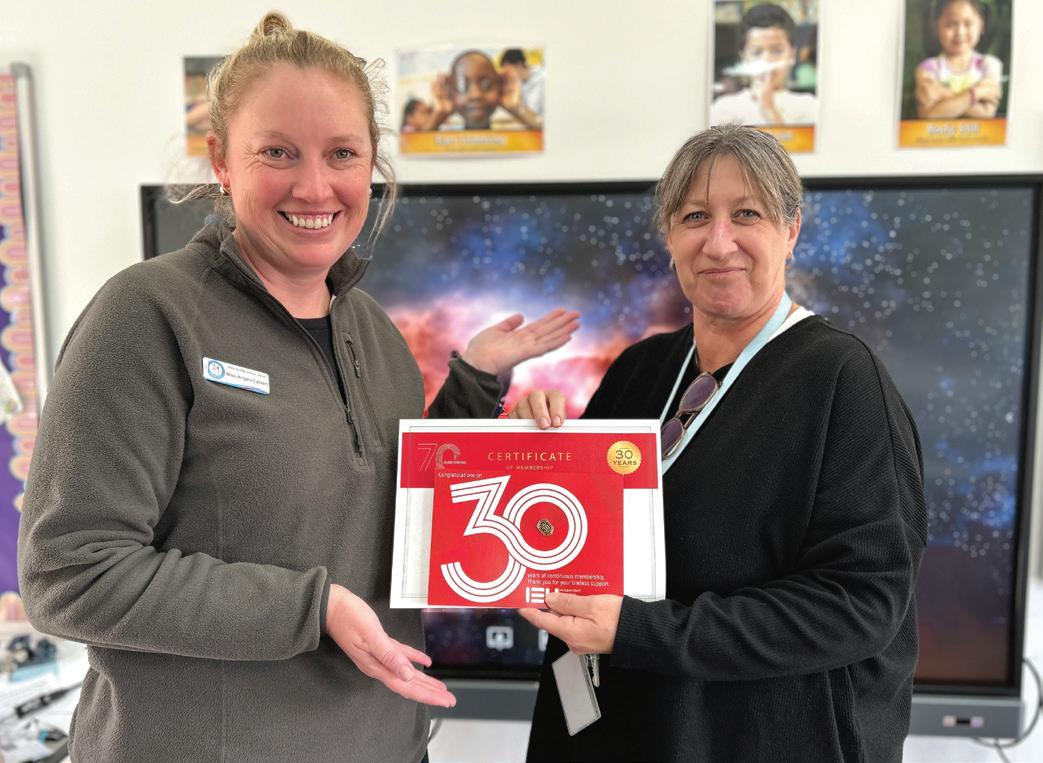
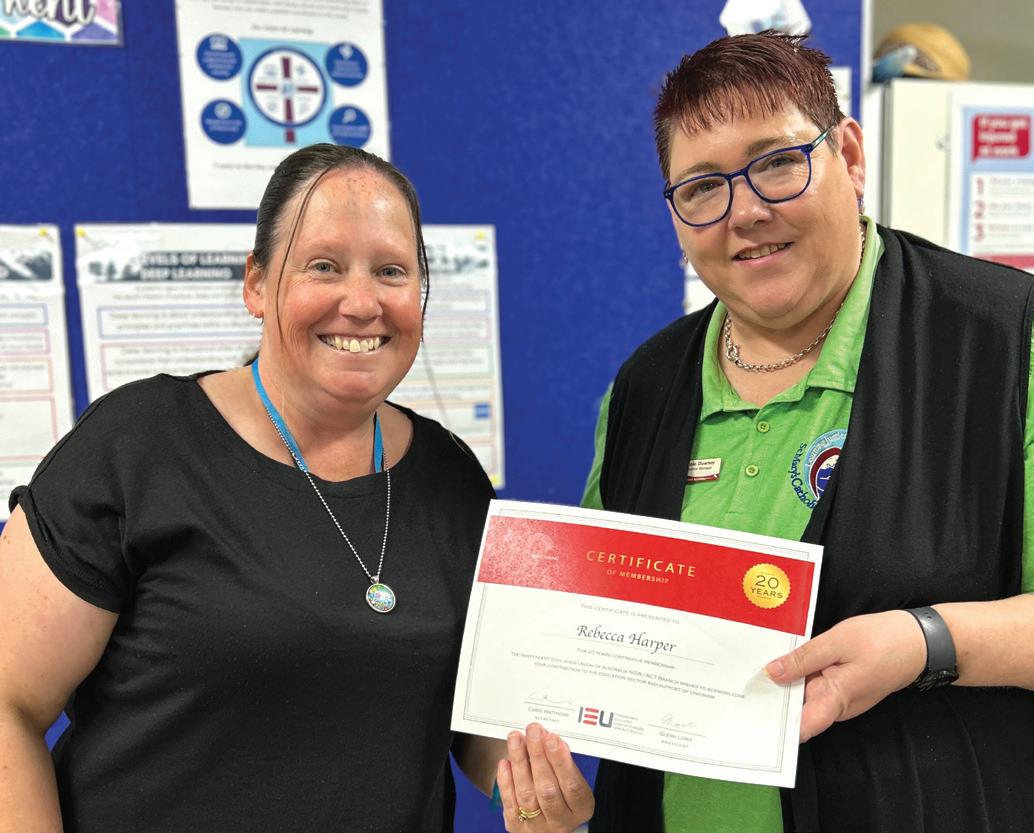
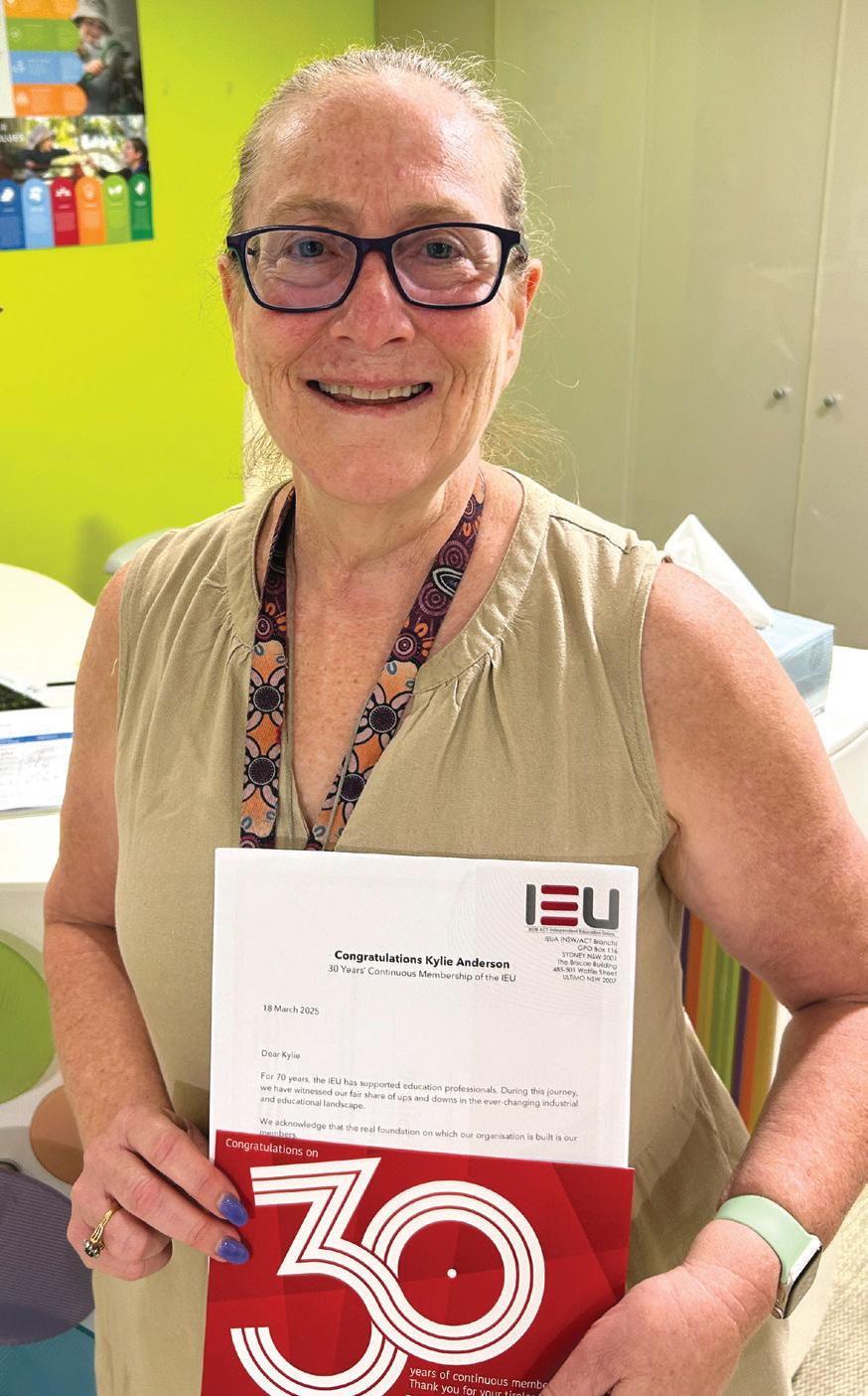
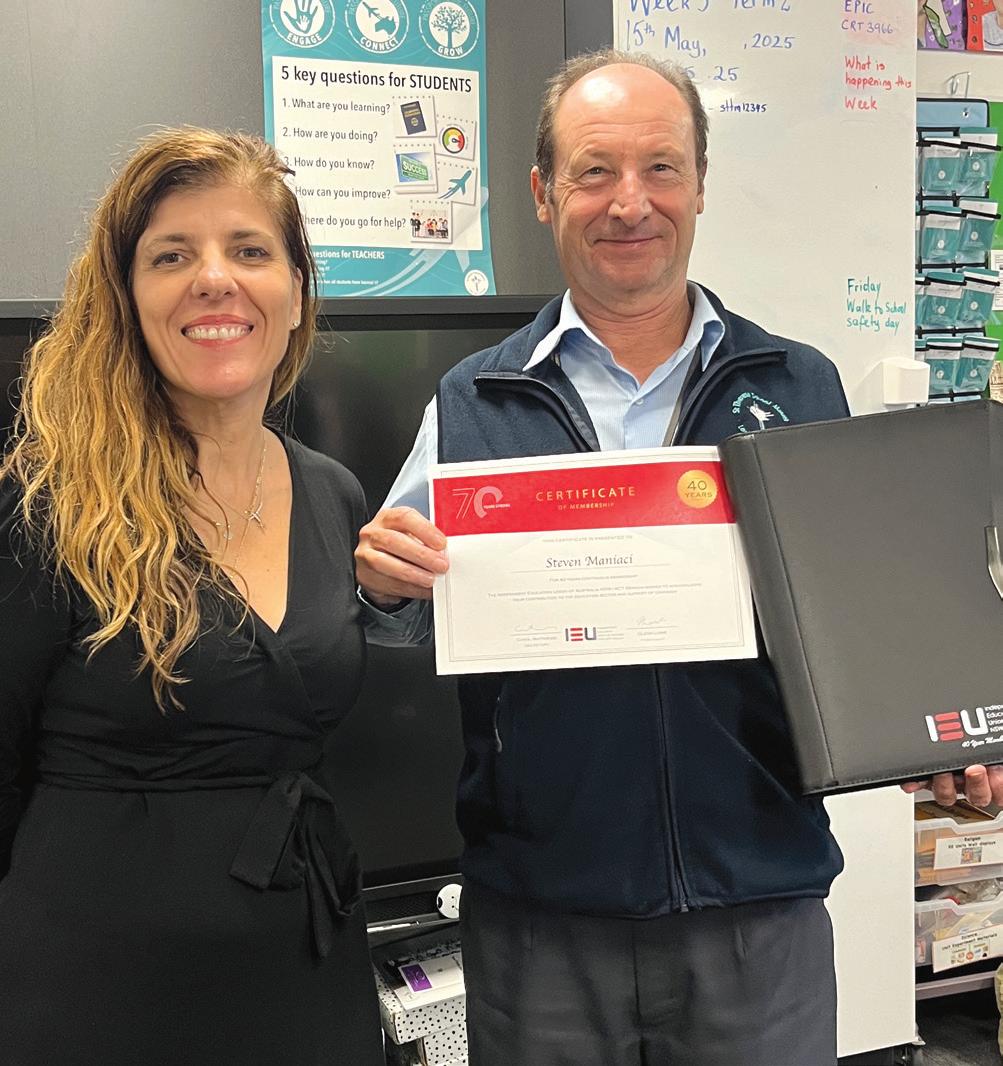
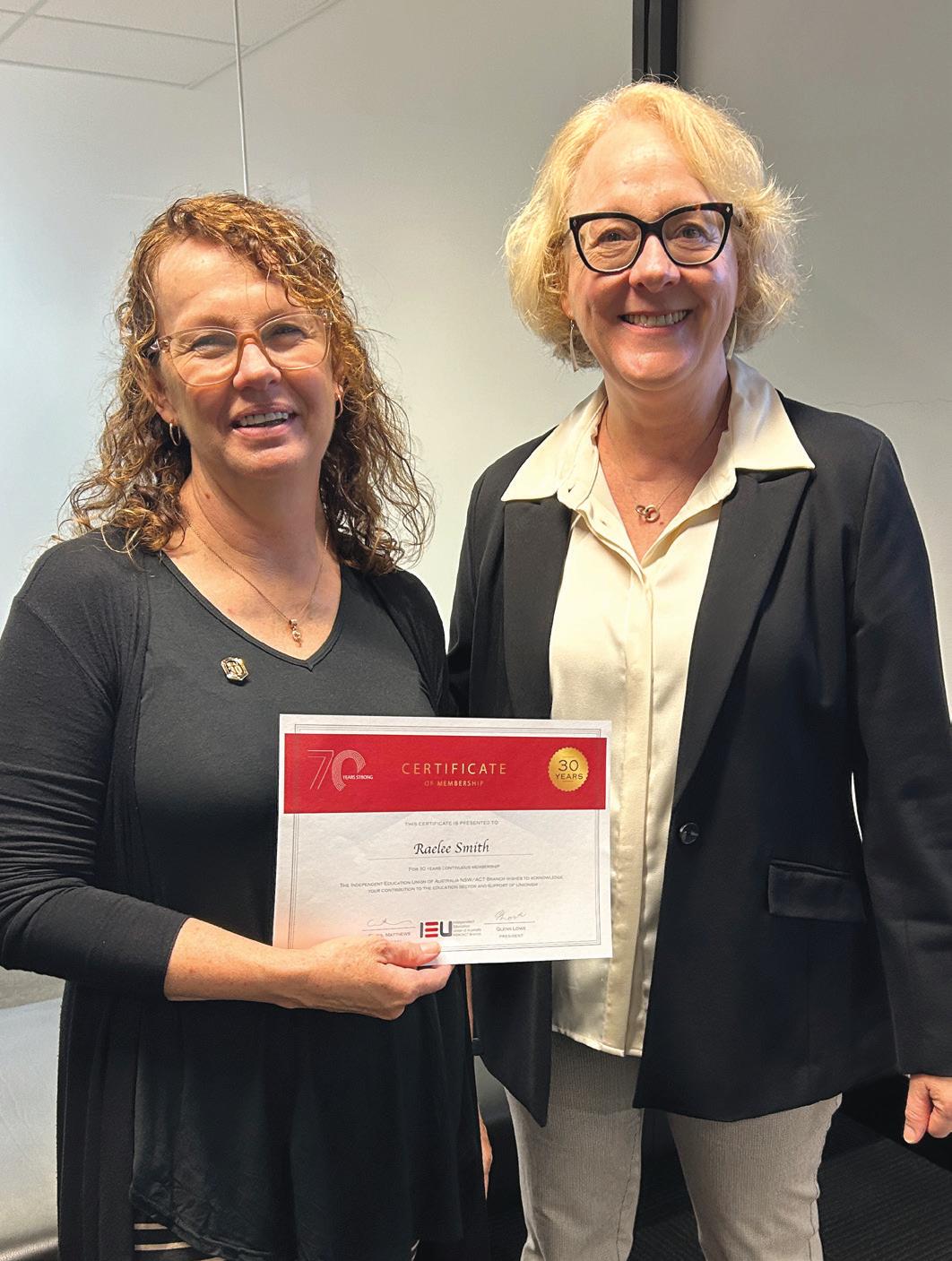
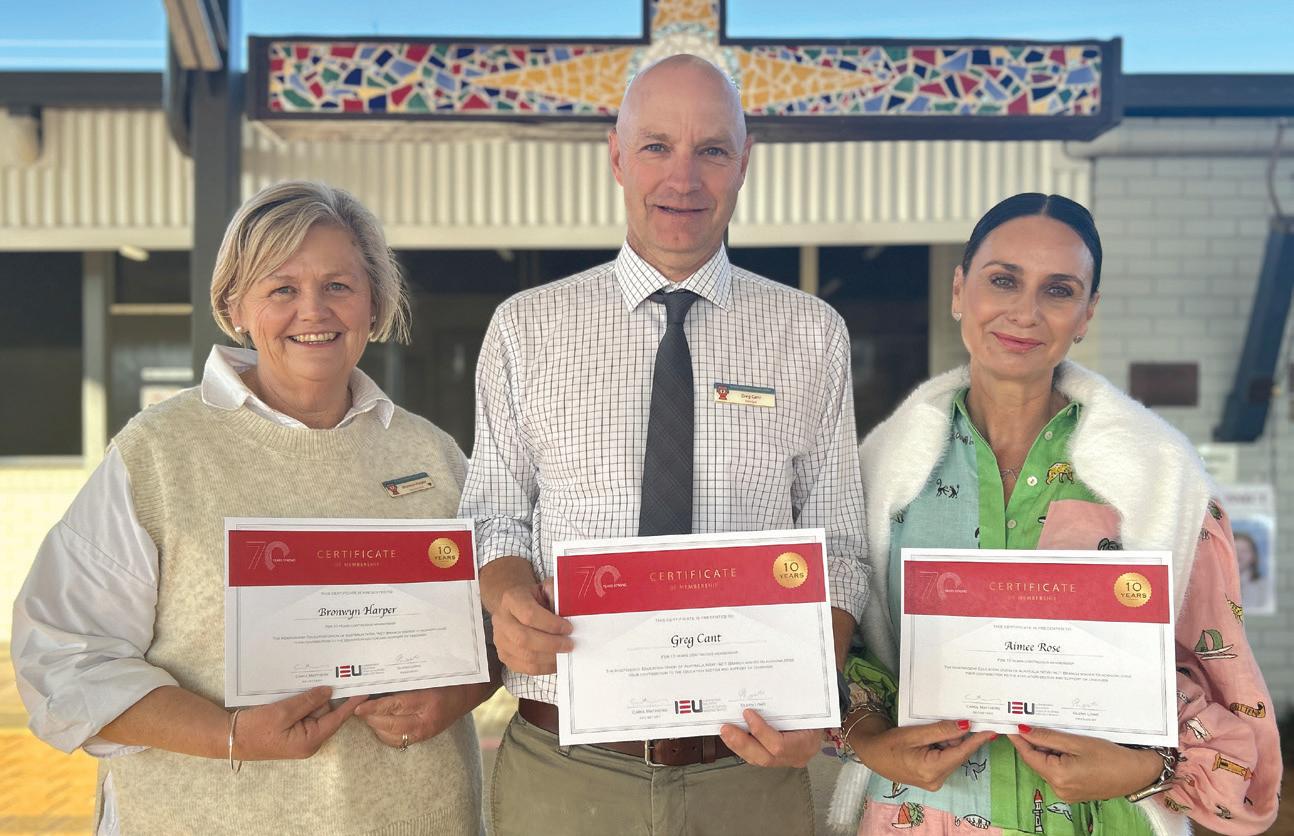
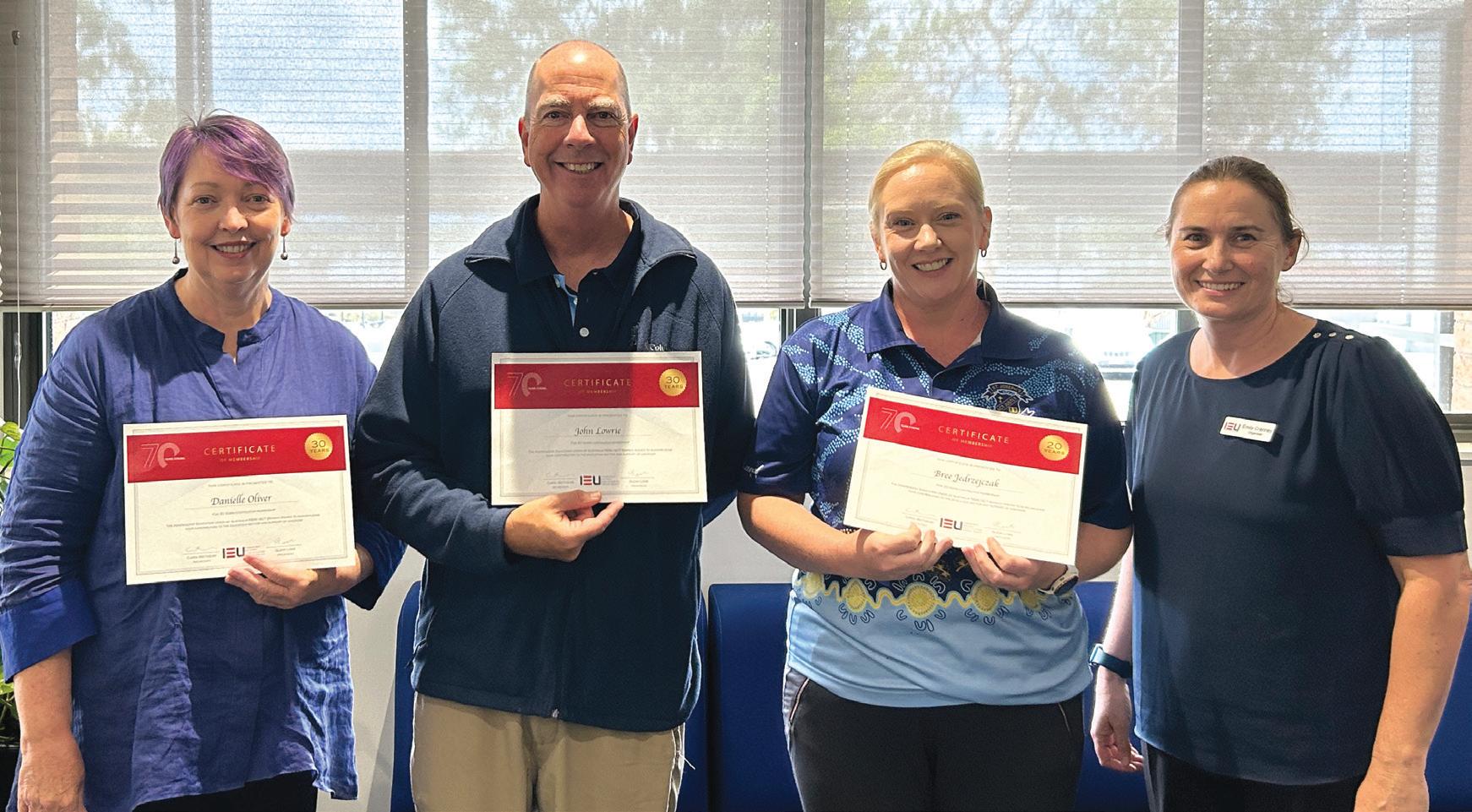
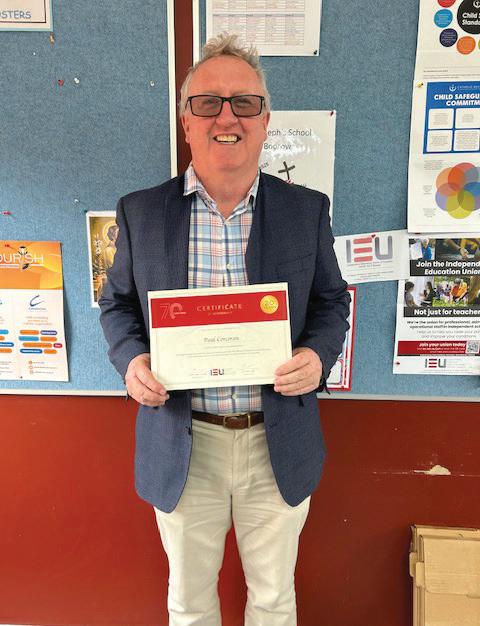
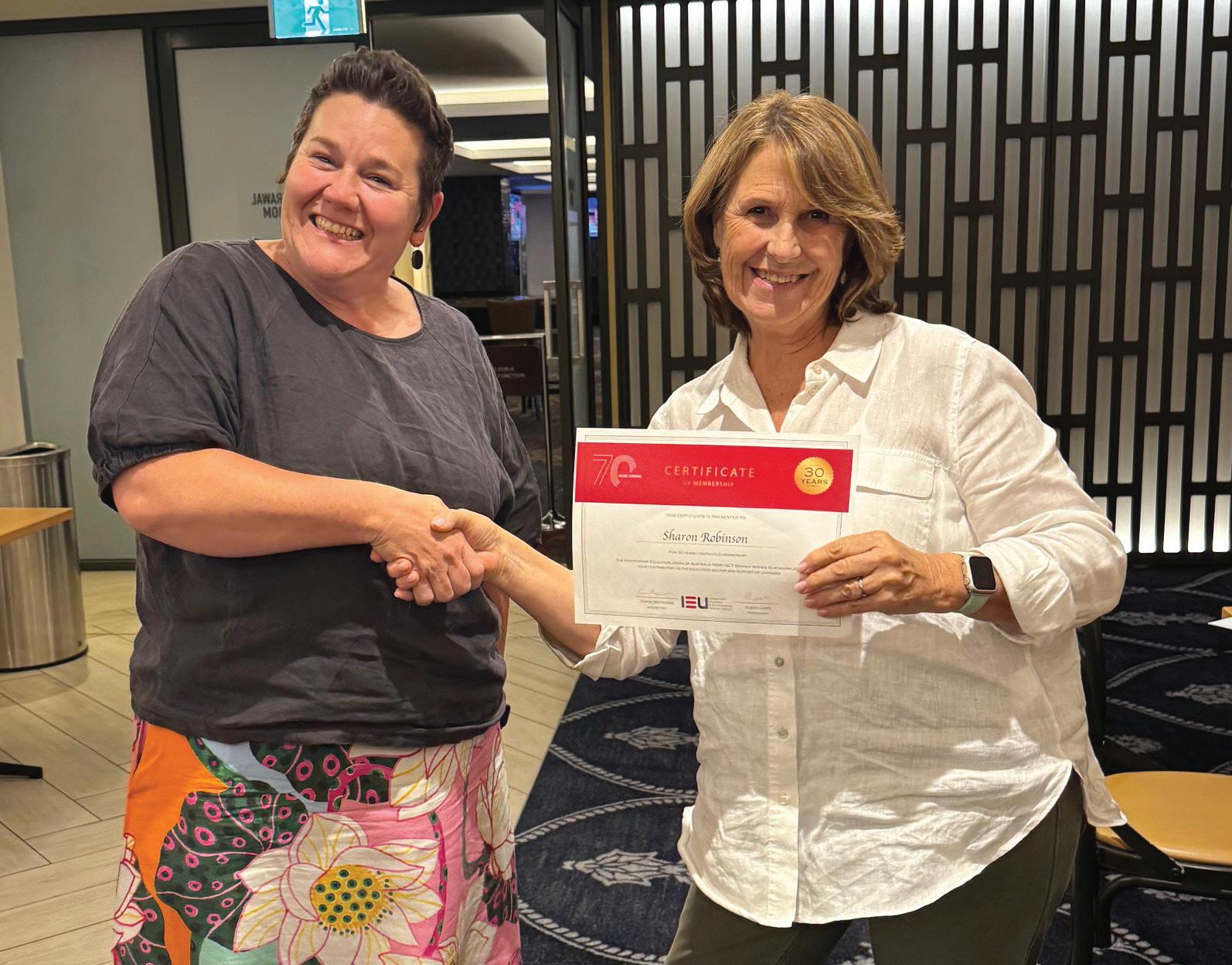

following the previous year’s federal election.
However, 2005 marked the beginning of the end of the federal Coalition government after it introduced draconian industrial relations legislation.
Dubbed WorkChoices, it sought to severely restrict working conditions that could be regulated by awards, promote individual contracts over collective agreements, cut unfair dismissal protections and reduce the federal Industrial Relations Commission’s power to arbitrate disputes.
The Howard government attained a majority in the Senate on 1 July 2005 giving it the power to pass the legislation.
Union mobilises against WorkChoices
On the same day IEU members participated in a stop work meeting, gathering in almost 200 pubs and clubs around the state with workers from every industry and profession in a ‘Sky Channel meeting’ – what we did before video conferencing platforms such as Zoom and Teams.
A second nationwide Sky Channel union meeting was held on 15 November. There were 263 meetings in locations throughout NSW and the ACT alone.
Unions NSW described the link-up as “the largest ever meeting of workers in NSW”.
Almost 600 new members joined the IEU in the weeks prior to the 1 July meeting.
More people joined the IEU as awareness grew of the inherent unfairness of WorkChoices and its impact on their working lives.
IEU membership exceeded 27,000 by year’s end. Of the 3188 members who joined in 2005, 649 remain members today – they should have received or will receive certificates marking their 20-year milestone this year.
Many employers, including the Catholic and Uniting churches, expressed concerns about the excesses of WorkChoices, while other employers tried to reduce worker power.

The Howard government’s attack on working people mobilised unions to mount the Your Rights at Work campaign.
“We will campaign for as long and as hard as it takes to overturn these laws and anyone who thinks that our campaign will fade away had better think again,” then ACTU Secretary Greg Combet said at a Melbourne rally.
Radical education reforms
Federal education minister Brendan Nelson in 2005 outlined his agenda, which included the following proposals: implementation of an Australian Certificate of Education as the key Year 12 exit certificate ‘plain English’ A to E reporting guidelines for all students to commence from 2006 literacy and numeracy tests to be reported to parents against national standards – NAPLAN was introduced in 2008 making ‘school performance’ publicly available – the My School website was launched in 2010 a values education program that included a requirement for all schools to fly the Australian flag – the government used Commonwealth funding as a lever to ensure schools complied with their program inquiries into teacher education.
Newly elected Queensland LNP politician Andrew Laming called for teacher pay to be based on student improvements against national benchmarks. Teacher blaming, if not teacher bashing, was again in vogue.
NSW Premier Bob Carr did himself no favours in the eyes of IEU members by supporting much of the federal government’s education agenda. Morris Iemma became premier in August following Carr’s retirement as the second longest serving premier of NSW.


The NSW Institute of Teachers, now absorbed into the NSW Education Standards Authority (NESA), had its first full year of operation in 2005.
At first, only newly employed teachers (new-scheme teachers) were required to be accredited; that is, to “demonstrate professional competency”.
The IEU advocated for employers to provide support and resources for new-scheme teachers, their supervisors and mentors.
Reports emerged that the accreditation process was being weaponised in some non-government schools as a means to subject teachers to disciplinary processes.
Outside the classroom
Professor Fiona Wood, a plastic surgeon who pioneered the ‘sprayon skin’ technique, which greatly reduces permanent scarring in burns victims, was named 2005 Australian of the Year.
Union Aid Abroad (APHEDA) ran an appeal in 2005 to support victims of the Boxing Day Tsunami.
Comedian and talk show host Rove McManus won the Gold Logie for most popular personality on Australian TV, while Chris Hemsworth from Home and Away was voted Most Popular New Male Talent. McLeod’s Daughters was Australian TV’s most popular drama series.
Missy Higgins won the 2005 ARIA Album of the Year for The Sound of White and Ben Lee won Single of the Year with the infectious Catch My Disease
Cate Blanchett won an Oscar for best supporting actress for The Aviator, while Million Dollar Baby was awarded Best Picture in 2005.
Wests Tigers took out the 2005 NRL premiership, while the Sydney Swans defeated the West Coast Eagles to claim the Bloods’ first premiership in 72 years.
The IEU issued a warning about the federal government’s industrial relations agenda in early 2005 with the headline: ‘Howard’s revolutionary agenda’.
In the second issue of the year, IEU General Secretary Dick Shearman spelt out the dangers for members.
“The government intends to dismantle an industrial framework that has existed for more than 100 years,” he said.
Howard’s WorkChoices legislation aimed to shift industrial matters from the state to the federal government and demolish valuable protections.
Shearman summed up the Howard government’s agenda as an attempt to
“shift bargaining power to employers in a way that can only be described as revolutionary, given its effective abolition of fairness from our industrial processes”.
The IEU set up a section on its website called “Howard’s IR Agenda” to provide members with regular updates.
The third issue of Newsmonth featured the headline ‘Abolishing our awards’, accompanied by a cartoon showing the dismantling of “the house our nation built” (pictured).
Job security, unfair dismissal, carer’s leave, appeals to the umpire and award salaries were all at risk.
“The federal government legislation intends to try to force all employees to privately negotiate
their own salary and conditions so that individual contracts replace current collective awards and agreements,” Shearman wrote.
In the next issue, members were invited to take part in “Australia’s largest ever workers’ meeting – Say NO to the federal government’s attack on your rights at work”.
In other news, a “Welcome to new staffers” article included one David Towson, now our Deputy Secretary, keen to join the fight. Organiser Kendall Warren was also featured with a “first day on the job” grin.
In 2005, working conditions that members considered “normal” were under threat. Rights we take for granted today were under attack. They will always need defending.

The Australian union movement and the global federation of teachers’ unions have expressed horror at the humanitarian catastrophe Palestinians are suffering in Gaza – and called for peace.
ACTU statement
The Australian Council of Trade Unions (ACTU) in a statement released on 23 May repeated its call for the immediate release of all remaining Israeli hostages by Hamas and condemned its abuses of human rights.
The ACTU also expressed strong opposition to the escalation of Israeli military operations.
It condemned the Israeli government’s blockade since 2 March of humanitarian aid, including food, entering Gaza, putting more than 2 million Palestinians at critical risk of starvation.
The ACTU urged Israel to comply with the International Court of Justice’s order to take immediate steps to prevent acts of genocide
and facilitate the provision of basic services and humanitarian assistance to Palestinians in Gaza.
The ACTU also called on the federal government to take steps including pressuring the Israeli government to stop military operations in Gaza, ending all military trade with Israel and recognising the state of Palestine.
“Implementing a two-state solution is the path to lasting peace, safety and security for both the peoples of Israel and Palestine,” the statement said.
Education International statement
Education International (EI) has also condemned the mass destruction of life and widespread suffering caused by the ongoing war in Gaza.
Education International is the global organisation of education unions representing 32 million teachers and other education employees across 180 countries. The IEU is affiliated to EI.
In May, EI also issued a statement expressing concern about Israeli military operations that forced Palestinian children from their classrooms, effectively denying them their right to learn.
“Days after the destruction of yet another school, and two months after Israel reinstated its full siege on Gaza, we can say that education is not just under attack, it’s being erased,” said EI General Secretary David Edwards.
“Schools and education facilities should always be respected as safe sanctuaries by all armed actors and never targets of war or violence. Children have the right to learn in peace and safety,” he said.
EI condemned the “indiscriminate Israeli bombings” of school buildings and universities which it said had left education infrastructure in shambles.
“This destruction blocks access to education for Palestinian children today and jeopardises

International
Nepal: Nationwide strike leads to victory for teachers
Teachers in Nepal recently concluded a month-long nationwide strike. On 2 April, more than 230,000 teachers took to the streets demanding the implementation of the School Education Act and other reforms.
Teachers’ concerns also centred on the government’s failure to honour previous agreements, job security and parity with civil servants.
The protests spanned 29 days and saw teachers across Nepal unify and take part in peaceful street demonstrations.
Schools were shut down and exams delayed, pushing back the academic year. In late April, the peaceful demonstrations were met with violence as Nepali police brutally attacked teachers protesting in Kathmandu, leaving more than 60 injured.
These attacks sparked outrage and solidarity among global unions.
Education International (EI) Asia-Pacific regional director
Anand Singh met with teachers to deliver a message of solidarity.
“Teachers must be heard, respected and treated with dignity,” he said. “We stand in unwavering solidarity with Nepal’s teachers in their rightful struggle for dignity, rights and the future of education.”
In the last days of the strike, negotiations intensified with the government signing up to a nine-point agreement providing pay rises for teachers, support staff and early childhood development facilitators.
While some challenges remain, including unresolved issues affecting non-government school teachers and other school employees, the relentless action and coordinated strike has resulted in landmark gains for teachers.
EI welcomed the result while reaffirming its commitment to the struggle for fair treatment and improved conditions for all teachers in Nepal.
The IEU is affiliated with EI, the global federation of education unions representing 32 million teachers and education workers across 180 countries.
Myanmar: School bombing kills students and staff
In a deadly airstrike, Myanmar’s military on 12 May bombed a school in the centre of the country killing 20 students and two teachers. This follows the devastating earthquake in March.
The airstrike injured more than 40 others. The extent of injuries was consistent with the use of cluster munitions, which are banned under international law.
The Australian government released a statement condemning the attack and calling on the regime to engage in “inclusive dialogue and adhere to its ceasefire commitment”.
Yet, as widespread armed resistance grows on the ground, the Myanmar military regime is increasingly reliant on air power
the long-term development of an entire generation in Gaza,” it said.
EI said it would continue to advocate for an end to the war, the release of all hostages and a negotiated solution that leads to lasting peace.
“The international community must prioritise education in Palestine by rebuilding schools, providing psychological support for students and teachers, and ensuring the rights of educators so that every child in the region has the opportunity to learn, grow and dream,” the statement said.
“We remain committed to a two-state solution where a democratic and sovereign Palestine lives in just and lasting peace and security alongside a secure Israel.”
to suppress opposition and terrorise civilians. International civil society, including organisations such as Amnesty International, continue to demand an immediate halt to all arms transfers, aviation fuel sales and financial flows to the military.
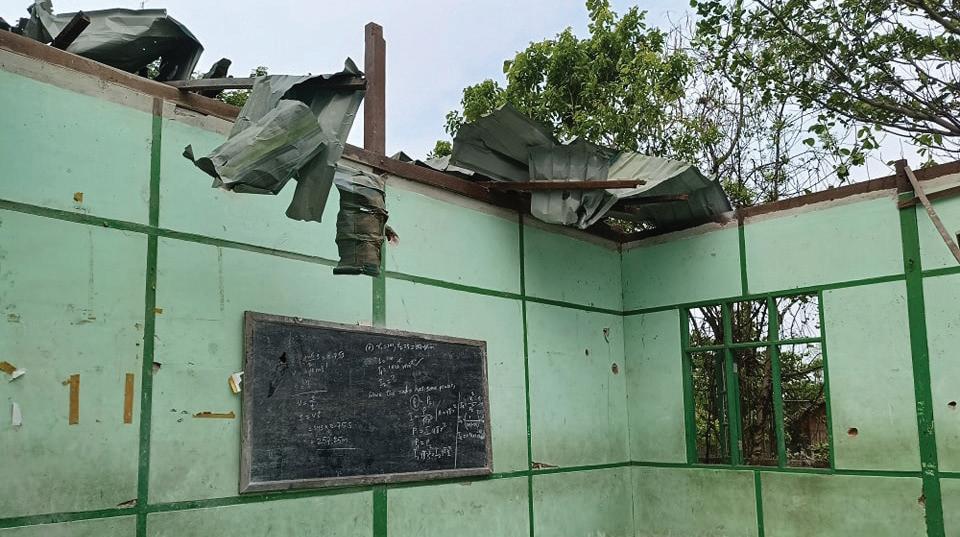
Myanmar’s military bombed a school in May.
Myanmar diaspora around the globe have called for a halt to the supply of aviation fuel to the military regime.
At a recent concert in Sydney, singer Phyu Phyu Kyaw Thein sang the Close the sky lullaby: “If the jet can’t fly, they can’t bomb. If the jet fuel’s banned, we can all go home.”
These words echo the cries of children at schools across Myanmar: “If you don’t close the sky, I will die. If you don’t close the sky, mom will cry.”
The Australian union movement continues to stand with the people of Myanmar. The Australian Council of Trade Unions (ACTU) is pushing the federal government to enact sanctions against the military regime.
2 | 2025
The IEU has 19 geographical sub branches across NSW and the ACT, plus the Principals’ sub branch. Sub branches meet four times a year, usually in the first three or four weeks of each term.
Sub branch meetings are a way for reps and members to provide feedback to the union about what’s happening on the ground in their workplaces. The meetings are also an opportunity for reps and members from each region to hear updates from IEU organisers.
Each sub branch sends four to six delegates to quarterly IEU Council meetings. Council is the union’s decision-making body, bringing together about 115 member delegates from throughout NSW and the ACT.
The IEU Executive of 22 members is elected every three years by members.
All reps and any IEU members who would like to develop their union activism are warmly invited to attend their region’s sub branch meeting.
Contact your rep or organiser if you would like more information.
Central Coast
The Central Coast Sub Branch includes Gosford, Erina, Green Point, Lake Munmorah, Tuggerah, Wyong and surrounds.
The Central Coast Sub Branch meeting was held at Ourimbah RSL on Thursday 15 May. It was well attended with two new reps attending for the first time.
The meeting discussed the proposed changes to workers compensation, outlining the NSW government’s rationale for change and the proposed fivepoint plan of Unions NSW which emphasises prevention.
Concern was expressed at the government’s intention to define psychological injury in a way which will almost certainly exclude some injured workers. Members were informed about the upcoming Central Coast rally on Saturday 17 May to oppose the proposed changes (see pages 1, 4).
Reps raised a number of issues occurring in their schools. These included the level of support for students with extra needs in independent schools, concerns about professional autonomy, coordinator workloads and behaviour management in Catholic schools.
Reps also reported on a number of good things happening in schools. These included working in schools with experienced staff and stable staffing numbers, supportive and consultative principals, and initiatives to keep briefings short and concise.
Jim Hall Organiser
Central Metropolitan and Metropolitan East
The Central Metropolitan Sub Branch includes central Sydney, Sydney’s inner-western suburbs and Rhodes, Concord and Meadowbank. The Metropolitan East Sub Branch covers Sydney’s eastern suburbs, including Bondi, Waverley and Bellevue Hill.
On Wednesday 21 May, a combined Central Metropolitan and Metropolitan East Sub Branch meeting was held.
The meeting, originally scheduled to take place at the IEU building in Ultimo, was switched to Zoom due to commuter chaos on the Sydney rail network. Unperturbed, 16 members joined online, including representatives from Catholic and independent schools, covering both the primary and secondary sectors. It was great to welcome our two new reps from Rosebank College in Five Dock.
Members engaged in discussions related to Term 2 workloads compounded by after-hours commitments, teacher privacy with new AI and voice recording technologies and the ongoing IEU negotiations on behalf of Amadeus music program staff.
There was also a detailed briefing regarding the Catholic systemic enterprise agreement negotiations. The Catholic reps in attendance strongly endorsed the push for 50 per cent of professional development time to be teacher-directed. Our IEU organisers encouraged Catholic reps to organise chapter meetings to discuss workload claims.
Attendees were also interested to learn about the continued efforts of the Women and Equity Committee to address disparities, especially in relation to the gender pay gap. It is wonderful to see the IEU working with the wider trade union movement to be part of this important cultural change.
Finally, there was a discussion about the right to disconnect legislation. IEU organiser David Whitcombe provided clear examples of what is and is not covered under the amendment to the Fair Work Act
The next sub branch meetings will be held separately. The Central Metropolitan Sub Branch will meet at the Burwood RSL Club at 5pm on Tuesday 12 August. Metropolitan East will meet at 4.30pm on Wednesday 13 August at The Juniors Kingsford. This is a valuable opportunity to network with other colleagues, stay informed and have our voices heard. Catering will be provided. We would love you to join us!
Michelle Mella Central Metropolitan Sub Branch President
Central West
The Central West Sub Branch includes Dubbo, Bathurst, Orange and Lithgow, as well as Cowra, Mudgee, Parkes, Forbes, Grenfell and Wilcannia.
The Central West Sub Branch met in Forbes on Friday 16 May. This time there were no transport dramas and everyone arrived with time to spare.
Reps from Catholic systemic schools gave constructive feedback on what is happening in schools, especially around time spent on meetings, the allocation of PD days and other workload issues.
Robust discussion took place around PD days, calls for a 50 per cent allocation for teacher-directed time, and a suggestion that “twilights” could be at risk. Reps expressed differing opinions about the effectiveness of these programs. It was a valuable opportunity for reps to share best practices and address common issues.
Further information will be collected from chapters to clarify what is happening as well as diocesan expectations.
The broader issue of leave entitlements was raised, with confusion around evidence requirements discussed. Organisers will follow this up directly with the diocese.
We encourage members to contact their organiser directly if they have concerns about access to leave entitlements.
The next meeting is scheduled for Friday 15 August in Dubbo.
Donna Widdison Organiser

Members discussed the IEU’s communication about the recent federal election. Messages highlighted the need to protect significant industrial rights that the opposition had threatened to repeal.
School issues raised included unresolved backpay for new MEA members in independent schools, overcrowded open learning spaces (with up to 67 students and only two teachers), confusion regarding large class size support and NCCD funding in Catholic systemic schools.
Staff at Western Sydney University reported facing challenges with rejected pay claims, pressure to inflate student marks and expectations to work 12-hour days. Additionally, the employer admitted to underpaying staff by $28 million, and some staff missed out on redundancy options due to proposed campus closures.
Convenors spoke about updates in the Catholic systemic sector detailed in the NewsExtra dated 1 May. Members were also informed about proposed changes to workers compensation by the NSW government –which the IEU is urging members to lobby against (see pages 1, 4).
The next meeting in Term 3 is 28 July. There will be a focus on the NCCD requirements, and programming and record-keeping compliance. We encourage all reps to attend this meeting.
Lubna Haddad Organiser

Hunter Valley
The Hunter Valley Sub Branch includes Newcastle, Maitland, Singleton, Scone, Taree and surrounds.
More than 30 members attended the Term 2 Hunter Valley Sub Branch meeting held on Monday 12 May at the Blackbutt Hotel in New Lambton. Reps raised a variety of issues including the increase in workload and range of duties for school administrative staff. Teacher librarians are being asked to deliver HSIE units instead of library lessons. Aboriginal Education teachers are being asked to take classes instead of specifically supporting Aboriginal students.
Concerns in the Catholic systemic sector included the employer view that mandatory training can be completed within the 7.6 -hour workday with release not deemed necessary. The requirement to double-record every incident or near miss on “MN Response” and “Compass” was also raised along with the perception that this shows a lack of trust in the professional judgement of teachers.
Aspect support staff asked the union to commence a recruitment campaign across all NSW Aspect schools to improve density and strength in preparation for 2027 bargaining.
Members of the sub branch participated in and supported recent Hunter Workers events such as the International Women’s Day March, “Don’t Risk Dutton” days of action, International Workers Memorial Day (see page 8), Toast to May Day Dinner and the May Day Rally (see page 7).
Carlo Rendina
Organiser

Ku-ring-gai
The Ku-ring-gai Sub Branch covers Sydney’s north shore, including Hornsby, Wahroonga, Waitara, Warrawee, Thornleigh, Pymble, Turramurra, Berowra and Asquith.
The Ku-ring-gai Sub Branch met for its Term 2 meeting on Monday 12 May. Teachers and support staff from a variety of sectors made the quarterly pilgrimage to Hornsby RSL to discuss branch, sub branch and local issues.
Attendees represented a wide range of sectors. Present were representatives from primary, secondary and K-12 AIS schools, and from Catholic Schools Broken Bay (CSBB), Sydney Catholic Schools, and Seventhday Adventist schools.
Topics for discussion included Catholic systemic bargaining, implementation of the new AIS MEA and flexible work arrangements in CSBB. A significant recent IEU win for a member in the Fair Work Commission was also discussed, along with proposed changes to workers compensation (see pages 1, 4) and the NCCD.
As always, sharing concerns around workload in the profession was useful. Members take comfort in knowing that work intensification is widespread. Hearing from others is useful in identifying which issues are common and which are particular to their own workplace.
Following the meeting we enjoyed a meal and drinks together to discuss union matters in a less formal setting.
The Ku-ring-gai Sub Branch will next meet in the Bistro at Hornsby RSL at 4.45pm on Monday 4 August.
Charles Wheeler Organiser

Lansdowne
The Lansdowne Sub Branch includes Lakemba to Liverpool, as well as Bankstown, Fairfield and Auburn.
The Lansdowne Sub Branch met on 22 May at Fairfield RSL to celebrate its 40th anniversary. IEU reps from a variety of schools attended, alongside three union officers.
Negotiations for the Catholic systemic enterprise agreement was the major topic of discussion, with IEU officers encouraging members to sign the union’s petition.
Proposed NSW government changes to workers compensation laws were also a significant issue for members (see pages 1, 4).
At the conclusion of the meeting, 40-year member Brigid Eljed was presented with her 40-year membership pack.
Following the presentation, we noted that two of the members present, Larry Mockler and Janina Kozak, had attended the Lansdowne formation meeting in 1985, and were instrumental in changing the location of the sub branch meeting to its current venue, Fairfield RSL.
The next Lansdowne Sub Branch meetings will be held on Thursday 14 August and Thursday 6 November, commencing at 4.30pm. The IEU provides a meal following the meeting and members are most welcome to join.
Aidan Anderson Organiser
Mid North Coast
The Mid North Coast Sub Branch includes Coffs Harbour, Kempsey, Port Macquarie, Bellingen, Nambucca Heads and surrounds.
Term 2 threw us a curveball with a 1-in-500-year flood forcing the postponement of our 23 May sub branch meeting, but true to form, Mid North Coast IEU members have shown resilience, dedication, and unity in the face of disruption.
In the absence of a meeting report, here is a look at what has been happening in the region.
Catholic systemic bargaining continues and members across the region have contributed feedback on work practices agreement claims. The solidarity from chapters is overwhelming, with members showing up for each other and pushing collectively for real workload improvements in their schools.
On 16 May – World Support Staff Day – we celebrated the heart of our schools with a special event hosted by Tracy Bancroft and Vickye McKechnie (both reps at St Joseph’s Primary in Port Macquarie). Twenty-seven support staff members gathered for a fantastic evening that honoured their essential work. It was brilliant to see the energy in the room as colleagues connected, shared stories, and stood strong together (see page 10).
AIS schools in the region are adjusting to their new and improved conditions following the MEA’s introduction this year –another reminder of what union action can achieve.
Our rescheduled Term 2 meeting will now take place on Thursday 13 June at the Westport Club in Port Macquarie, with Term 3 locked in for Friday 15 August at the Sawtell RSL Club. We hope to see you there.
Sean van der Heide Organiser
The Monaro Sub Branch covers Canberra and the ACT.
Members from different sectors attended the Monaro Sub Branch meeting on 29 May at the IEU office in Deakin.
Key updates included the motion to Council regarding the impact of students with additional needs on teacher workloads.
There was optimism that upcoming agreements will address this as a psychosocial risk employers must manage.
Pleasingly, the Archdiocese has entered a memorandum of understanding to provide release for teachers of students requiring extensive adjustments.
Reps were presented with an update on Catholic systemic negotiations, including ongoing issues with how pay will be set compared to the ACT public sector, work practices, long service and parental leave.
The strong view in the room was that teacher workloads must be addressed. There was discussion about what further actions could be taken.
The use of pupil-free days other than for teacher-directed planning was felt to undermine staff capacity to be properly prepared to lead learning.
Reps and organisers will focus on addressing excessive briefings and meetings that intrude on guaranteed breaks and essential preparation time. Discussions also covered unclear and inequitable leave arrangements.
Reps in AIS schools were reminded to check backpay, workload transparency statements and parental leave for noninitial primary carers.
Under new owner Christian Community Ministries (CCM), members at Brindabella Christian College have been paid on time and are cautiously optimistic stability after recent turmoil.
CCM will need to meet with the IEU, especially as they seek to transition staff to a new industrial agreement. Negotiations for other ACT Christian schools will commence after NSW is finalised.

The North Coast Sub Branch covers Lismore, Tweed Heads, Kingscliff, Pottsville, Murwillumbah, Mullumbimby, Kyogle, Ballina, Lismore, Casino, Coraki, Woodburn, Yamba and Maclean.
The North Coast Sub Branch was held at the Ballina Indoor Sports Centre on Wednesday 14 May.
Deputy Secretary David Towson attended along with organisers Sean van der Heide and Richard Ryan.
The meeting commenced with “Round the Grounds”. Reps shared issues happening in their workplaces, including:
AIS schools still slow rolling out backpay.
Catholic systemic teachers and support staff in some schools are reluctant to take sick leave as they have been told that they won’t be replaced.
Some staff have been told casual budgets have been cut by half.
• Some temporary contract teachers are still seeking permanence.
The process of completing data for the NCCD is more time consuming on Compass than it was on the old platform.
Now that Proclaim is finished, teachers cannot use the hours of attendance at this day for “Work Teach and Lead”.
Other items discussed were Catholic systemic bargaining and the Lismore WPA.
Members were also informed about the NSW government’s proposed changes to workers compensation and the negative effect this would have on workers (see pages 1, 4).
The next meeting is scheduled for Wednesday 6 August.
Richard Ryan Organiser
North West
The North West Sub Branch covers the New England region including Armidale, Tamworth, Gunnedah, Tenterfield, Inverell, Moree and Narrabri.
The Term 2 sub branch meeting took place in Armidale on Friday 16 May with special guest Assistant Secretary Amanda Hioe in attendance.
The meeting brought together passionate representatives from across the region to share updates, discuss challenges and strategise for the future.
A key topic was the ongoing challenge reps face in recruiting and engaging younger staff in the union movement. This sparked a spirited discussion and ideas ranging from tailoring messaging to resonate with different age groups and career stages and using contemporary platforms like TikTok to reach younger audiences in more relatable ways.
Another suggestion involved collecting and sharing case studies that highlight the union’s real-life impact and the practical value of membership.
Reps reported on some wins and progress made in the region.
A secondary school rep gave an update on a matter raised at an earlier meeting. An excessive data and administrative workload issue was successfully resolved through discussions between the prinicpal and rep – a clear example of the power of persistence and effective local representation.
A systemic member also shared some feedback, affirming the strong connections and collaborative spirit among schools within the Armidale Catholic Diocese. The member noted that staff feel supported and that operations across schools are running smoothly at the moment.
Not all the news was positive. Members expressed their disappointment over some AIS schools’ mean-spirited interpretation of new paid parental leave entitlements in the MEA. The IEU has already lodged a dispute in the Fair Work Commission (see page 4).
Meanwhile, there is ongoing interest in the Armidale Waldorf School, where staff continue their determined pursuit of an enterprise agreement (EA) – a long journey that has drawn both admiration and strong support from fellow members.
Sub Branch members look forward to meeting next in Tamworth on Friday 1 August.
Sue McKay Organiser
Northern Beaches
The Northern Beaches
The Northern Beaches Sub Branch meeting took place on Tuesday 20 May at the Harbord Diggers Club.
It was a valuable opportunity for members to connect and reflect on the recent finalisation of the AIS and Broken Bay agreements.
Discussion also focused on the challenges that remain ahead, particularly around workload, supporting students with complex needs, casuals and ensuring fair conditions for all staff.
As always, members spoke with conviction and clarity, guided by the core union values of solidarity, fairness and collective action. Our strength lies in our unity, and meetings like this are an important reminder of the power we hold when we come together.
Thank you to all who attended and contributed to a constructive and energising conversation and meal.
We look forward to continuing these collaborative discussions at our next meeting on Tuesday 12 August 2025, from 5pm to 7pm. Your voice matters, so please join us – let’s keep building momentum together.
Lee Cunningham Organiser
Northern Suburbs
The Northern Suburbs Sub Branch covers Artarmon, Chatswood, Cremorne, Gladesville, Gordon, Hunters Hill, Kirribilli, Lane Cove, Lindfield, Milsons Point, Mosman, North Sydney, Roseville, Ryde, St Ives, St Leonards, Willoughby and Woolwich.
At the Northern Suburbs Sub Branch meeting, held on Wednesday 14 May, delegates reported a common concern: many schools in the region have yet to implement the workload transparency clause in the independent schools MEA.
In several cases, there has been no consultation with staff about how the clause will be enacted. Members expressed concern about the capacity of union representatives and the IEU to ensure compliance with this provision.
The sub branch delegates discussed practical actions to support implementation, including:
developing a shared approach among Northern Suburbs reps • creating a standardised template (with support from organisers) for school leaders to define and clarify what constitutes a fulltime teaching load conducting surveys to gather data from members about actual workloads in their schools.
Another key issue raised was the right to disconnect. Some schools have yet to take steps to address this entitlement. The group discussed measures such as the use of a standardised outof-office message referencing the right to disconnect, as seen in some independent schools.
Members also highlighted the importance of this right in protecting staff, particularly early career teachers, from unreasonable expectations to engage in work outside of paid hours.
The next meeting is scheduled for 5 August in Term 3.
Brehaut Sub Branch President
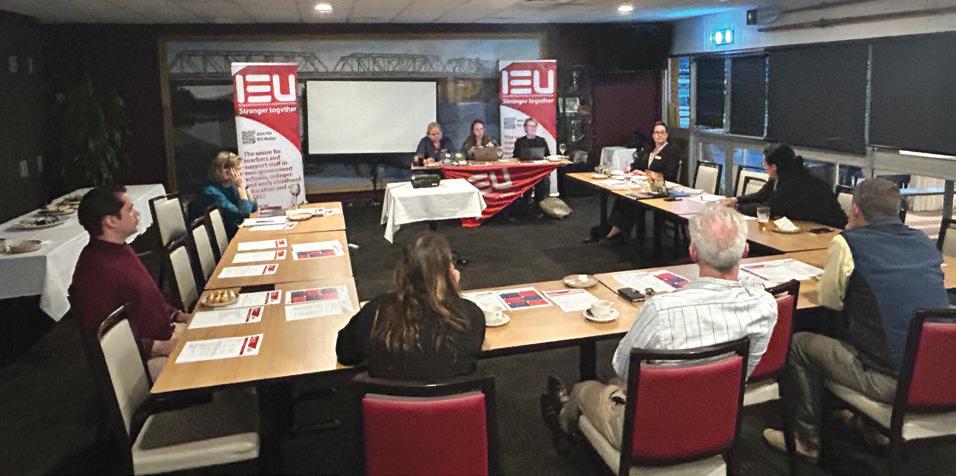
The 14 May sub branch meeting held at Nepean Rowers Club was well-attended. As always, the amount of sharing and discussion of current issues affecting members was welcome and productive. We also welcomed a few new reps at the meeting and it was great to have their input.
Independent schools are experiencing an inconsistent application of their new MEA that the chapter reps brought to our attention. While some schools have had the pay rises applied and had received backpay already, others had received the pay rise but still no sign of any backpay.
Additionally, interpretations of some clauses in the MEA (for example, how loads are now calculated and reported to staff) are proving difficult for some independent schools.
Catholic systemic reps are still disappointed about the progress of enterprise agreement negotiations.
We are hopeful a recent petition will show employers that members are not happy with the current workload and processes that they continue to claim in the negotiations.
Further frustrations were shared about the recent system-wide “Formation Days” that were ill-timed in the term and also ran over time making the departure from the event at Rooty Hill on a rainy weekday even more challenging. The lack of respect for our time was quite evident.
Finally, we discussed the motion regarding increases in parental abuse towards school staff that was passed by the sub branch last year and was then taken to Council. There are ongoing talks with CSPD about how these incidents can be reported and recorded by staff.
The IEU Principals Sub Branch meeting on 17 May highlighted significant systemic, industrial and leadership issues across dioceses.
In Wilcannia-Forbes, engagement is underway to address remote workload and wellbeing challenges. Wollongong remains stable and negotiations regarding the WPA (which is embedded in the EA) are being discussed. Wagga Wagga is facing challenges around payroll and investigation processes.
In Sydney, the new Executive Director is fostering authentic consultation and reform, especially around principal tenure rules, principal workload, and WPA review.
Parramatta is in deep organisational flux, with major cuts impacting leadership stability and educational support. Principals report overwhelming structural changes and financial pressures, including potential increases in class sizes.
Maitland-Newcastle has recently experienced a significant positive change in governance, with temporary appointments and concerns over centralised, non-educator leadership. Office support for teaching and learning remains inadequate.
Shared concerns across dioceses include principal change fatigue, reduction in centralised curriculum support and a lack of transparent consultation.
Canberra and Goulburn showed positive momentum in curriculum reforms and finance training, while Broken Bay raised the matter of mandatory faith-formation travel.
Overall, the IEU continues to advocate for stability, consultation and practical workload solutions.
Lyn Caton Assistant Secretary Riverina
The Riverina Sub Branch covers Albury, Griffith, Hay, Leeton, Thurgoona, Wagga Wagga and West Wyalong.
The second Riverina Sub Branch meeting of 2025 was held in Albury on Friday 23 May.
As usual it was well-attended, with reps gathering from across the Riverina region. IEU Secretary Carol Matthews flew in from Sydney and organisers Jackie Groom and Anthony Telford also attended.
The meeting heard from Carol about progress in negotiating a new enterprise agreement for Catholic systemic schools. Anthony reported on proposed improvements to the Work Practices Agreement with the Catholic Education Diocese of Wagga Wagga and the employer’s slow progress in this matter.
Carol also informed the meeting about the proposed changes to NSW workers compensation legislation and the detrimental impact these changes would have on people who have suffered psychological injuries (see pages 1, 4). Reps and members are encouraged to contact their local NSW MP to register their concerns.
The meeting discussed a range of school-based issues, mostly related to workload increases and matters related to WHS.
We thank all members for their attendance and look forward to the next meeting to be held in Griffith on Friday 15 August.
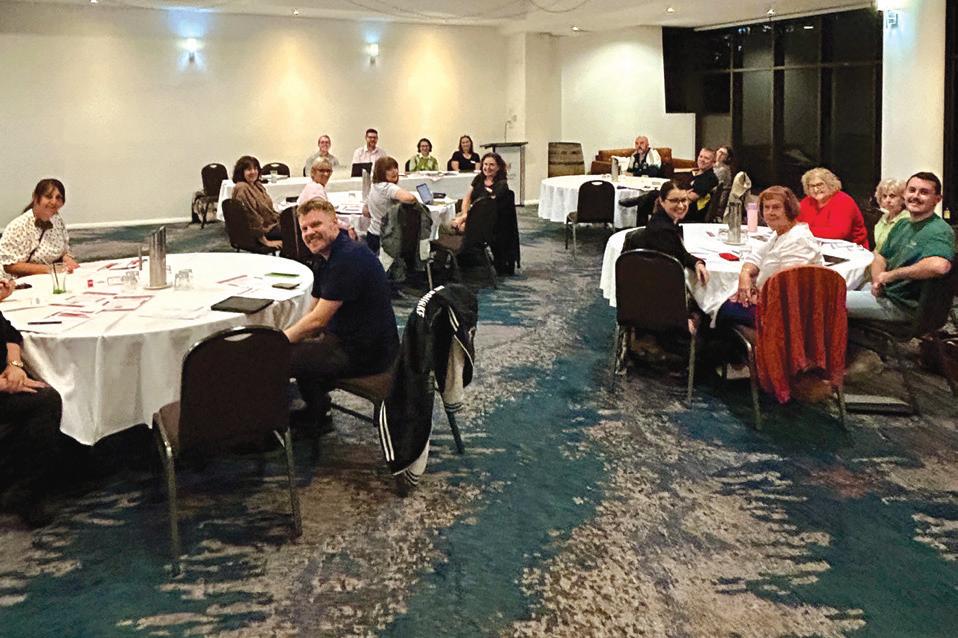
The South Coast Sub Branch met on Wednesday 14 May with 20 members attending. Staff from Catholic systemic, independent, and Christian schools raised shared concerns across the nongovernment sector.
Catholic systemic members reported increasing administrative demands, delays in teaching number allocations and inconsistent communication about leave.
Independent and Christian school members raised concerns around escalating expectations, including meetings held during school breaks, reduced control over RFF and increasing pressure to perform unpaid work. These issues were identified as potential psychosocial risks and will be followed up at the chapter level.
Members were updated on the Catholic systemic enterprise agreement negotiations and were encouraged to attend chapter meetings and discuss the current IEU petition.
The meeting also discussed the NSW government’s proposed changes to workers compensation, which would restrict access to psychological injury claims. Members were urged to support the Unions NSW campaign opposing these changes and to share personal stories that highlight their impact (see pages 1, 4).
The next meeting of the South Coast Sub Branch will be on Wednesday 6 August.
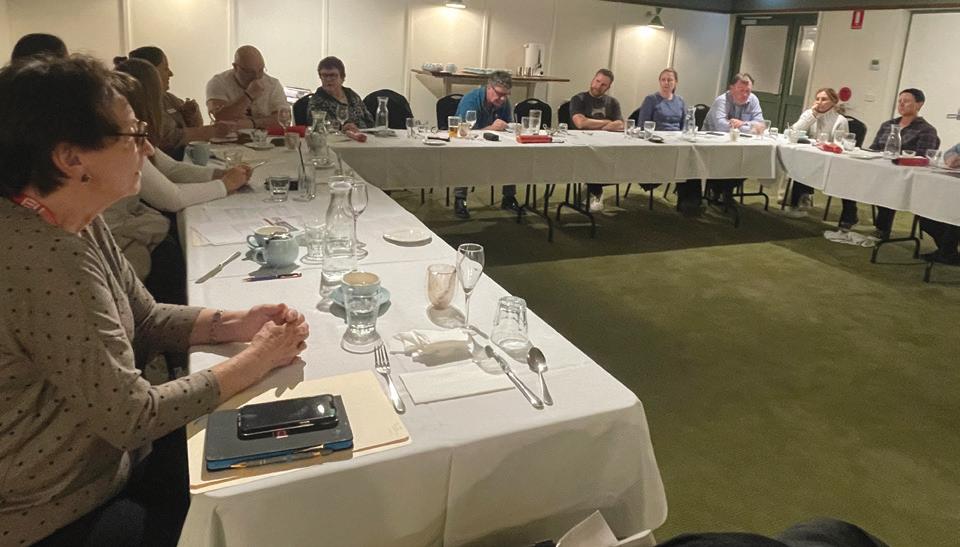
The South East Sub Branch meeting, on Friday 16 May, welcomed IEU Secretary Carol Matthews to the meeting attended by school reps from Pambula, Goulburn, Sapphire Coast, Young, Broulee, Tumut, Batemans Bay, Yass and Braidwood.
Religious Education programming was raised as a major issue facing all schools in the sub branch. Lack of clarity, constant changes and ‘Communities of Collaboration’ programs that are not fit-for-purpose are creating unrealistic workloads for teachers.
Carol outlined the progress of the negotiations for the new enterprise agreement for Catholic systemic schools and the need for members to show their support for the union’s position by signing the petition.
Carol also spoke about the proposed changes to workers compensation, particularly in relation to psychosocial claims, and encouraged members to contact their local MPs in support of the union’s opposition to the changes.
As the meeting date was also the date of World Support Staff Day, the delegates took the opportunity to comment on the contribution of support staff in their schools and thank them.
The sub branch then congratulated Roger Myers, Leonne Challen and Lyn Bathgate on 20 years’ continuous membership and Mary Jane Galiazzo on her 30 years of continuous membership.
Magi Findlay Sub Branch President
Southern Suburbs
The Southern Suburbs Sub Branch covers the St George area and the Sutherland Shire.
There were plenty of wraps and small cakes to go round at the sub branch meeting in the Dharawal room at Tradies Gymea, held on Tuesday 13 May. Fortunately, the leftovers found a home at Mount St Joseph Catholic College at Milperra under the aegis of Amy Kermode, rep and member of the IEU Executive.
Attendees in the room were scarce due to an unholy mix of parent-teacher interviews affecting both sides of the table and other hastily rearranged meetings. Numbers were, however, bolstered by a strong Zoom contingent.
Members expressed satisfaction with the finalised AIS MEAs for both teachers and professional staff. Backpay and approved salary rates should now be paid.
One area of concern was that emails from the union may be lost in members’ professional email inboxes if they are being directed to the ‘promotions’ folder. Something to look out for.
General dissatisfaction was expressed with how Sydney Catholic School’s People and Culture seems unable to respond to individual enquiries in a knowledgeable or timely manner. It was suggested that understaffing or high staff turnover might be the cause.
The offer of overnight accommodation prior to Council meetings will hopefully lead to increased enthusiasm for representatives to put themselves forward for the elected positions that will be available in the Southern Suburbs.
Finally, those in attendance witnessed Sharon Robinson, rep at St Patrick’s Catholic Primary School Sutherland, receive her 30-year union membership certificate and pin – although she really wants a new mug – hint, hint!
Josef Dabbs Organiser

has
Independent Education Union of
with
to survey all 75,000 members throughout Australia. Your feedback will shape the direction of your union and ensure we’re working with you in ways you value. (For more information, see page 3.)
voice is important and will help make your union even stronger.




Many IEU members are not reliant on the modern award, but rather have their conditions regulated by an enterprise agreement.
These agreements routinely provide for better pay and conditions than the award.
The Fair Work Act contains provisions that allow workers to push for an agreement of this sort.
To find out how that might work at your workplace, contact your organiser.
The IEU is currently negotiating agreements at several colleges.
UoW College
The most advanced of these is at UoW College, the pathways college at the University of Wollongong.
The parties recently settled with a pay increase of 3% (backdated to January), 2.75% next year and the same in 2027 (these later years have inflation savings to allow for higher increases if inflation exceeds 2.75%).
At Navitas Skilled Futures, negotiations are well advanced, and members should have an agreement to vote on by the middle of the year.
NSF typically award pay increases roughly equivalent to the Wages Price Index (a measure of the average pay increase across the economy), which in March was 3.2%.
Taylors College
Things aren’t so rosy at Taylors College, however, where management’s determination to get more work out of teachers during nonterm time has created a stand-off.
With no settlement likely any time soon, members have instructed the union to investigate the possibility of industrial action if an agreed position cannot be reached. Negotiations are also coming up at other colleges, including WSU The College, UNSW College and UTS College.
Kendall Warren Organiser


Secretary
Carol Matthews
Eora Nation
Deputy Secretary
David Towson
Eora Nation
Assistant Secretary
Lyn Caton
Dharug Nation
Assistant Secretary
Amanda Hioe
Eora Nation
President
Glenn Lowe
St Joseph’s Catholic High School, Albion Park
Dharawal Nation
Deputy President and Financial Officer
Denise McHugh
NESA Liaison Officer
Kamilaroi Nation
Vice President Systemic
Liz Heggart
Penola Catholic College, Emu Plains
Dharug Nation
Vice President Non Systemic
Helen Templeton
St Scholastica’s College, Glebe Eora Nation
Vice President Support Staff
Kylie Booth-Martinez
Assumption Catholic Primary School and St Stanislaus College, Bathurst Wiradjuri Nation
Vice President Early Childhood Services
Michelle Thompson
Shore Preparatory School
Early Learning Centre, Northbridge Eora Nation
Vice President ACT
Andrew Dane
Brindabella Christian College, Lyneham Ngunnawal Nation
Financial Officer
Suzanne Penson
MacKillop College, Port Macquarie Birpai Nation
General Executive Members
Jacob Betts
St Francis Xavier College, Florey, ACT Ngunnawal Nation
Nicole Downey
St Mary’s Catholic Primary School, Orange Wiradjuri Nation
Sarah Gardiner
Catherine McAuley Catholic College, Medowie
Worimi Nation
Amy Kermode
Mount St Joseph Catholic College, Milperra Eora Nation
Michelle Mella
Presbyterian Ladies College, Croydon Eora Nation
Peter Moore
Our Lady of Mercy College, Burraneer Tharawal Nation
Markus Muschal
St John Paul College, Coffs Harbour Gumbaynggirr Nation
Will Pollock
St Paul’s College, Kempsey Dunghutti Nation
Christine Wilkinson
St Joseph’s Catholic College, East Gosford Darkinjung Nation
Amanda Wood
St Patrick’s Primary School, Wallsend Awabakal Nation
Discover how much easier it can be to reach your savings goals when you break your big savings target into small achievable steps. Then you can set and forget by automatically transferring money from each pay. Sit back and watch your money grow.
Achieve your savings goals faster in five easy steps with Teachers Mutual Bank:
1. Work out how much you want to save by when: Setting a deadline holds you accountable to your goal and creates a sense of urgency. When you enter your savings goal in the Teachers Mutual Bank mobile app*, you’re reminded of it every time you use the app.
2. Break your savings goal into amounts to save each pay period: Use our Savings Planner calculator to work out the amount you’ll need to save each pay period to reach your goal.
3. Choose a savings account: Make sure you earn a great rate of interest every day on every dollar you save. The interest paid on your account makes a difference over time. Also check that there are no conditions, such as a minimum deposit amount, that could disqualify you from earning interest.
4. Pay yourself first: Set up an automatic payment to your savings account just after your pay goes in. Automatic
5. Watch your savings grow: Regularly track your
in the
app to see how close you’re getting to reaching your targets. Adjust your automatic transfers if necessary.

Parramatta:
Lismore:
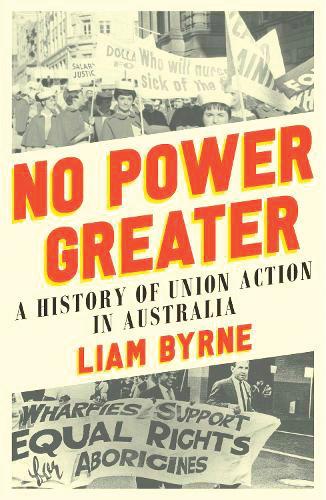
Author: Liam Byrne
Publisher: Melbourne University Press
Liam Byrne seeks to illuminate what unionism means in his book No Power Greater, exploring why successive generations of working people organised unions and nurtured them for future generations.
No Power Greater is a compelling story of acts of rebellion and solidarity that have shaped Australia’s past and shows that unions are far from history.

Author: Kate Grenville
Publisher: Black Inc.
Kate Grenville is no stranger to the past. Her success and fame as a writer exploded after her novel The Secret River was published in 2005.
Grenville goes on a kind of pilgrimage in Unsettled, back through the places her family stories happened. She puts the stories and the First People back into the same frame, on the same country, to try to think about those questions. This gripping book is the result of that journey.

Author: R.A. Spratt
Publisher: Puffin Books
Someone stole the Mona Lisa. Okay, it was over a hundred years ago, but a recently uncovered letter reveals that the thief forged a copy. That means that the painting in the Louvre is a fake. And the real Mona Lisa could be anywhere.
As Friday watches the comings and goings of France’s most famous art gallery, she sees some strange things. Amid digital pickpockets, guerrilla graffiti and projectile perfume, Friday soon discovers that the Paris art scene is a hotbed of crime.
To go in the draw, email entries to giveaways@ieu.asn.au with the title of the book you would like to receive in the subject line. Write your name, membership number and postal address in the body of your email. All entries must be received by 30 June 2025.